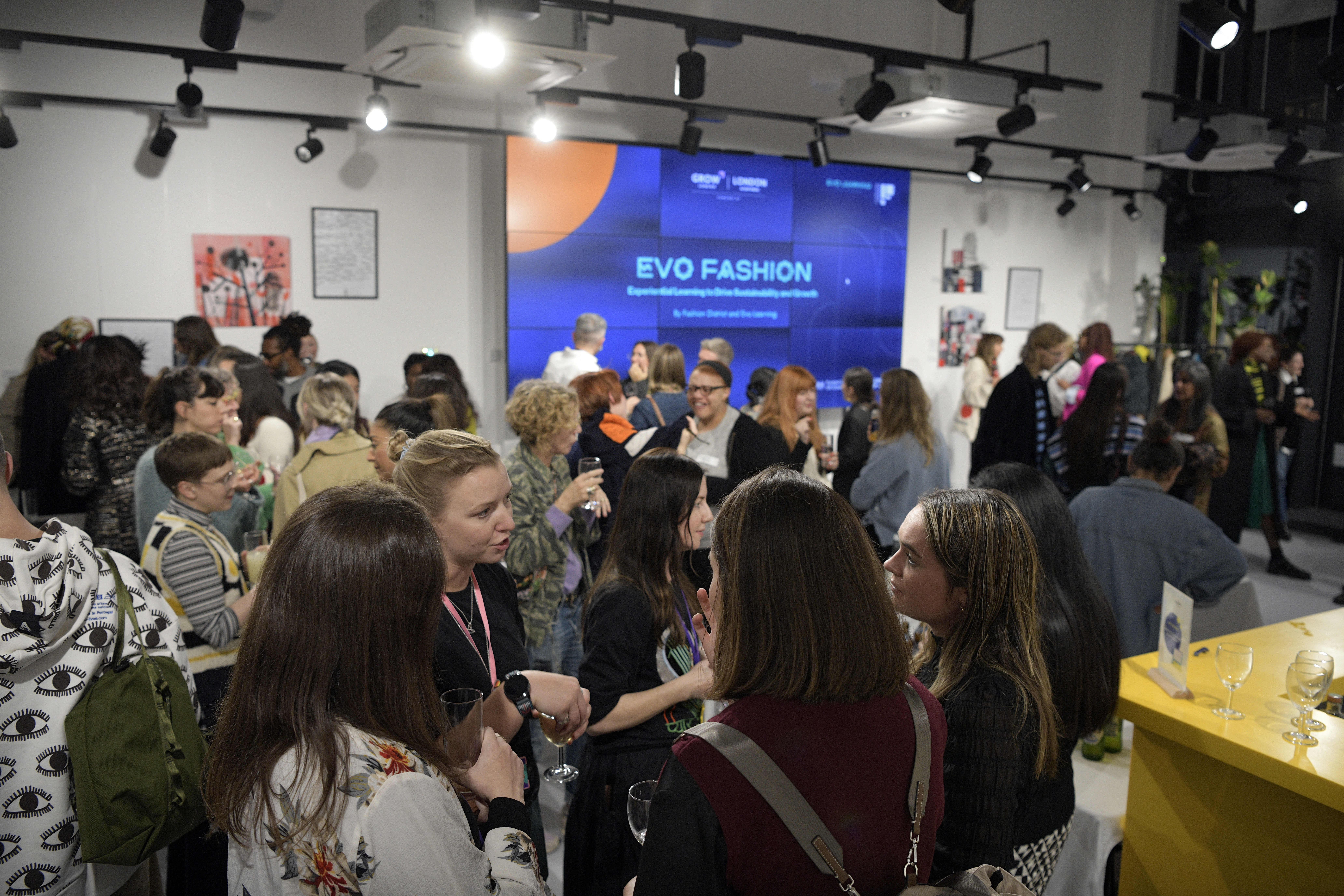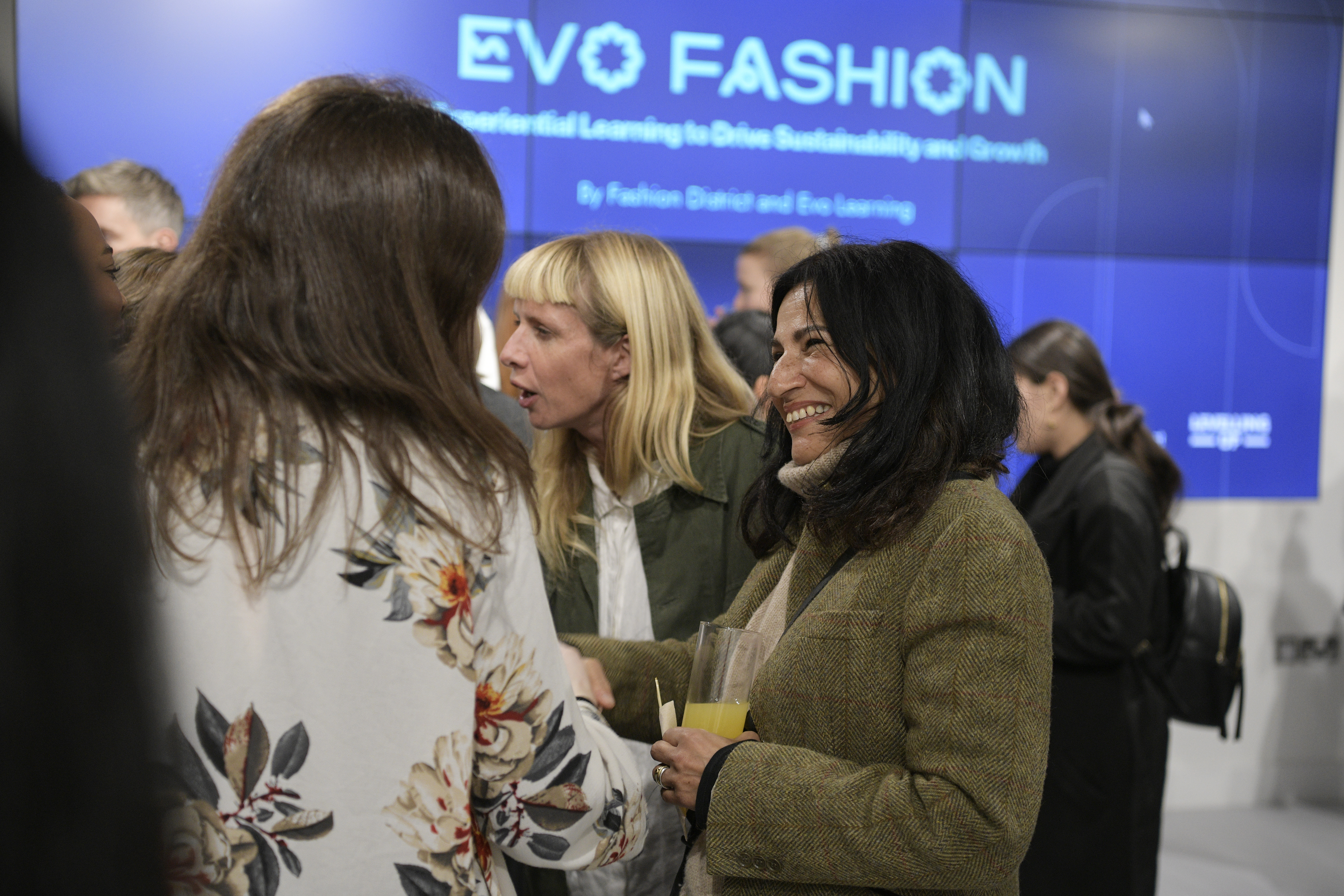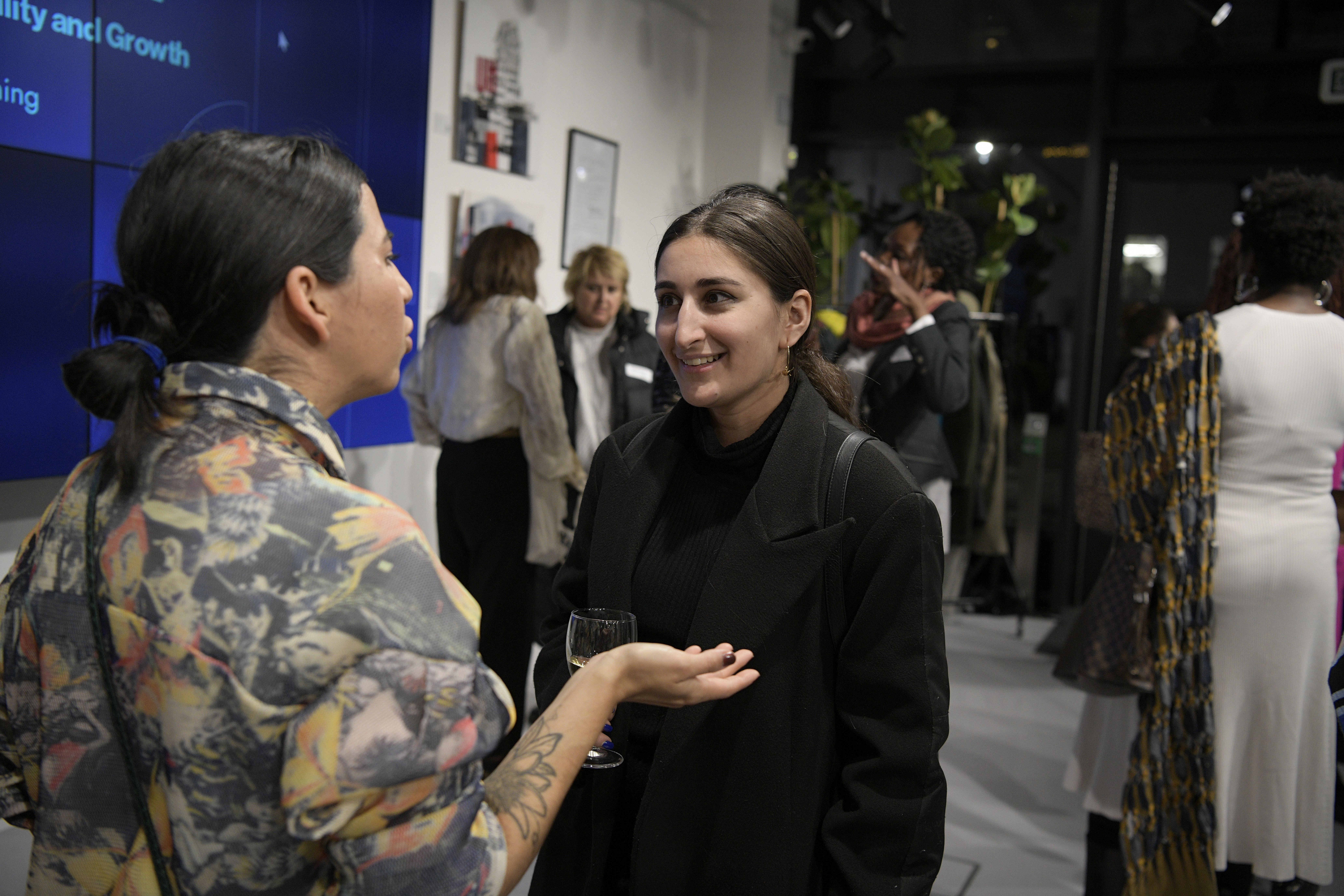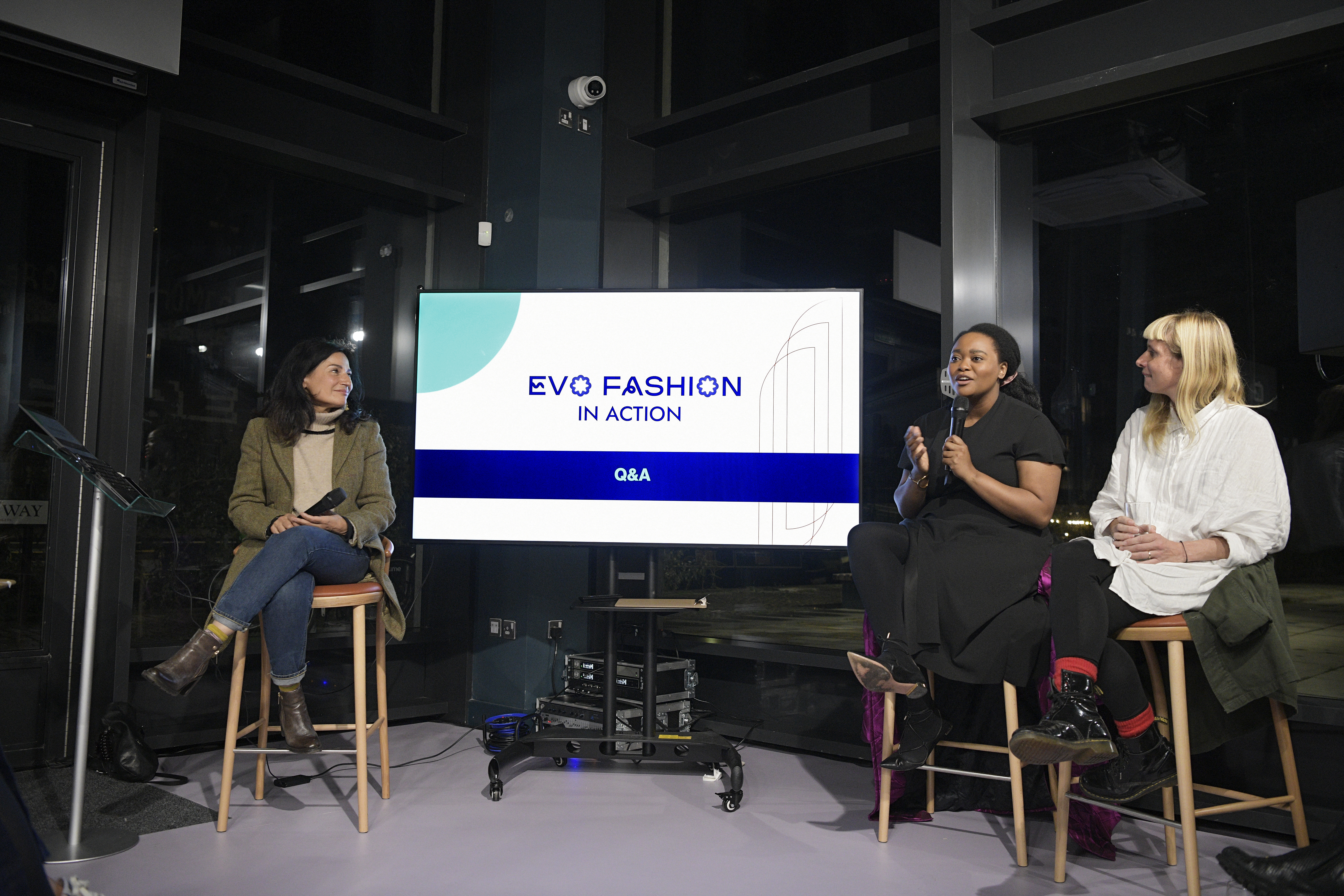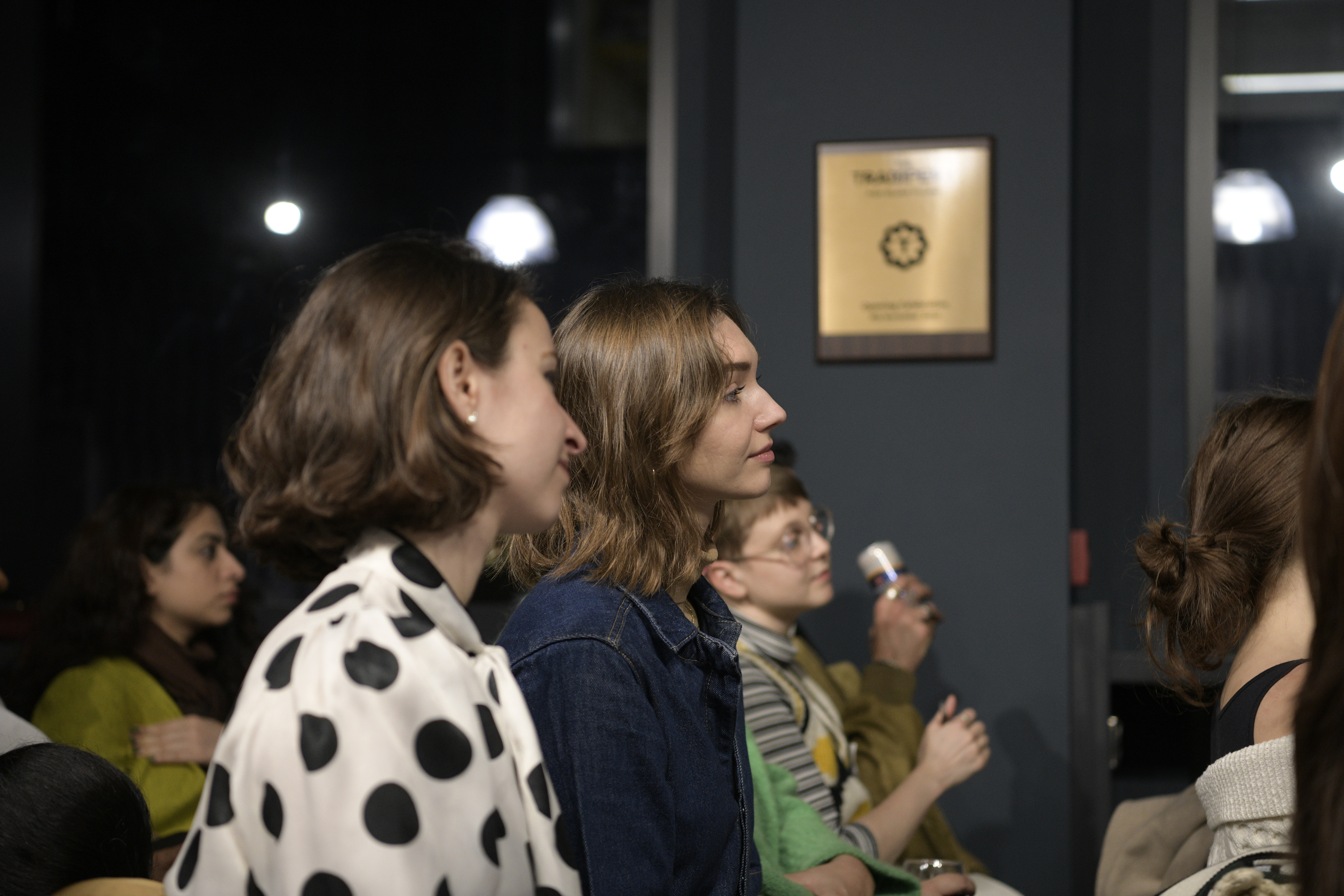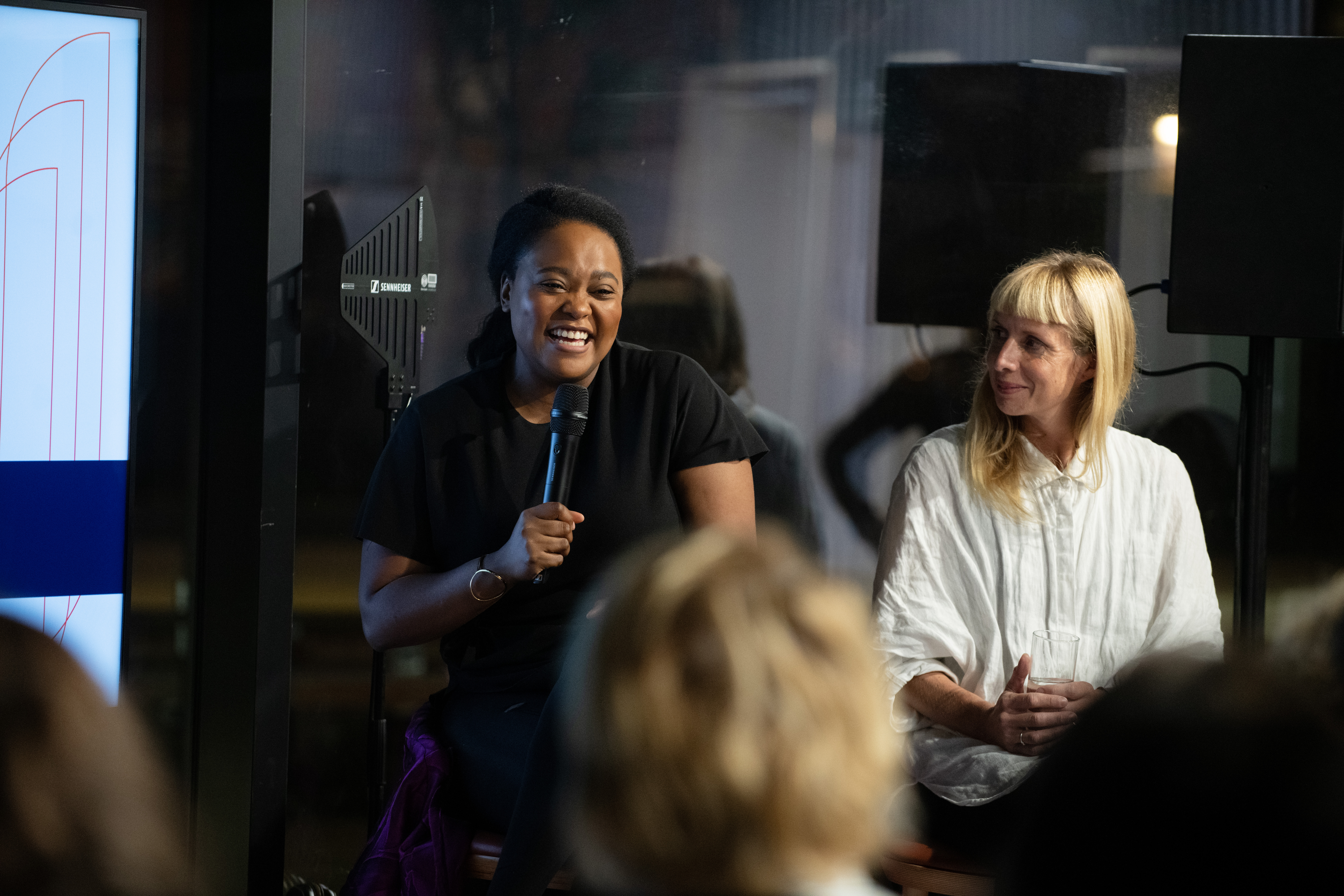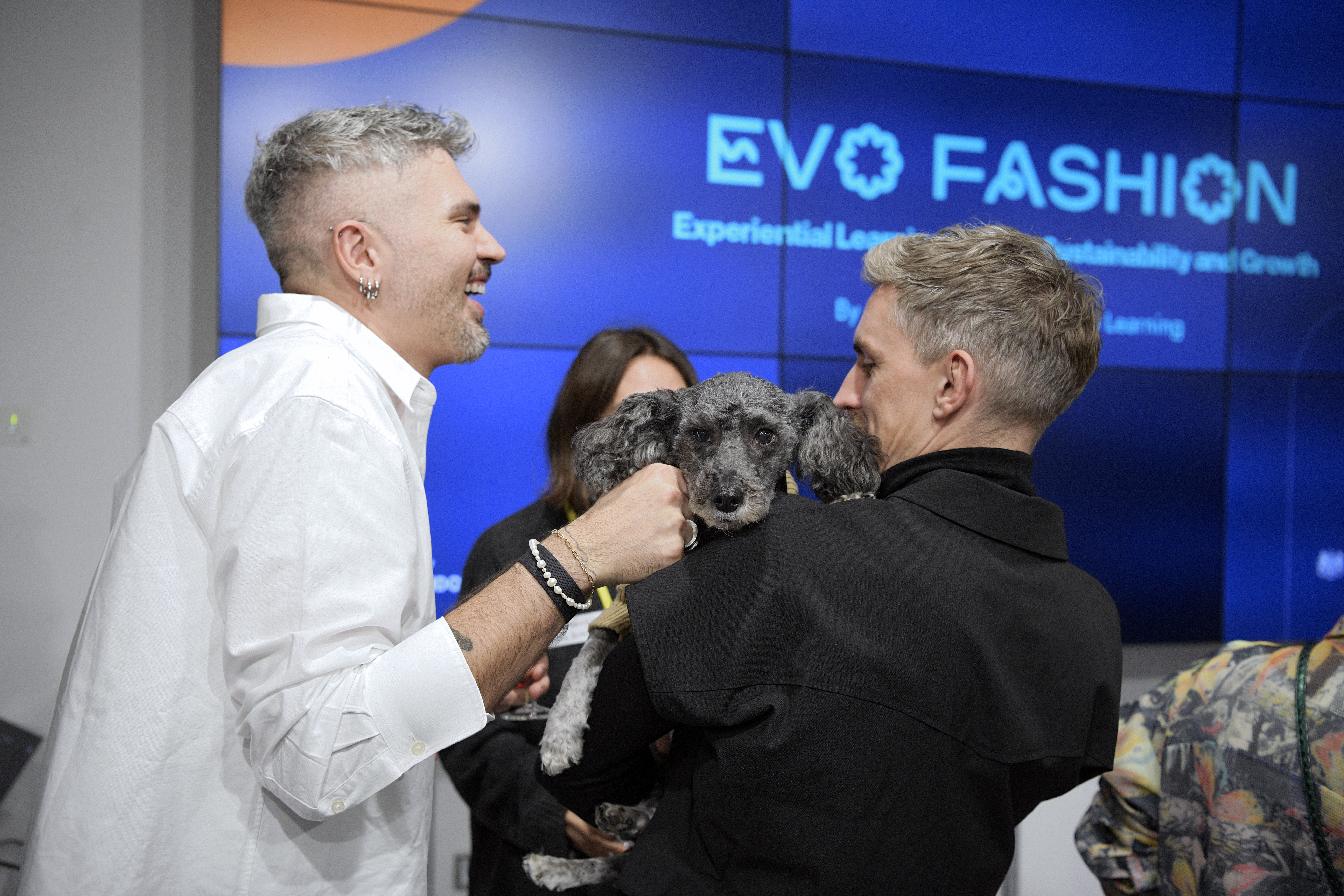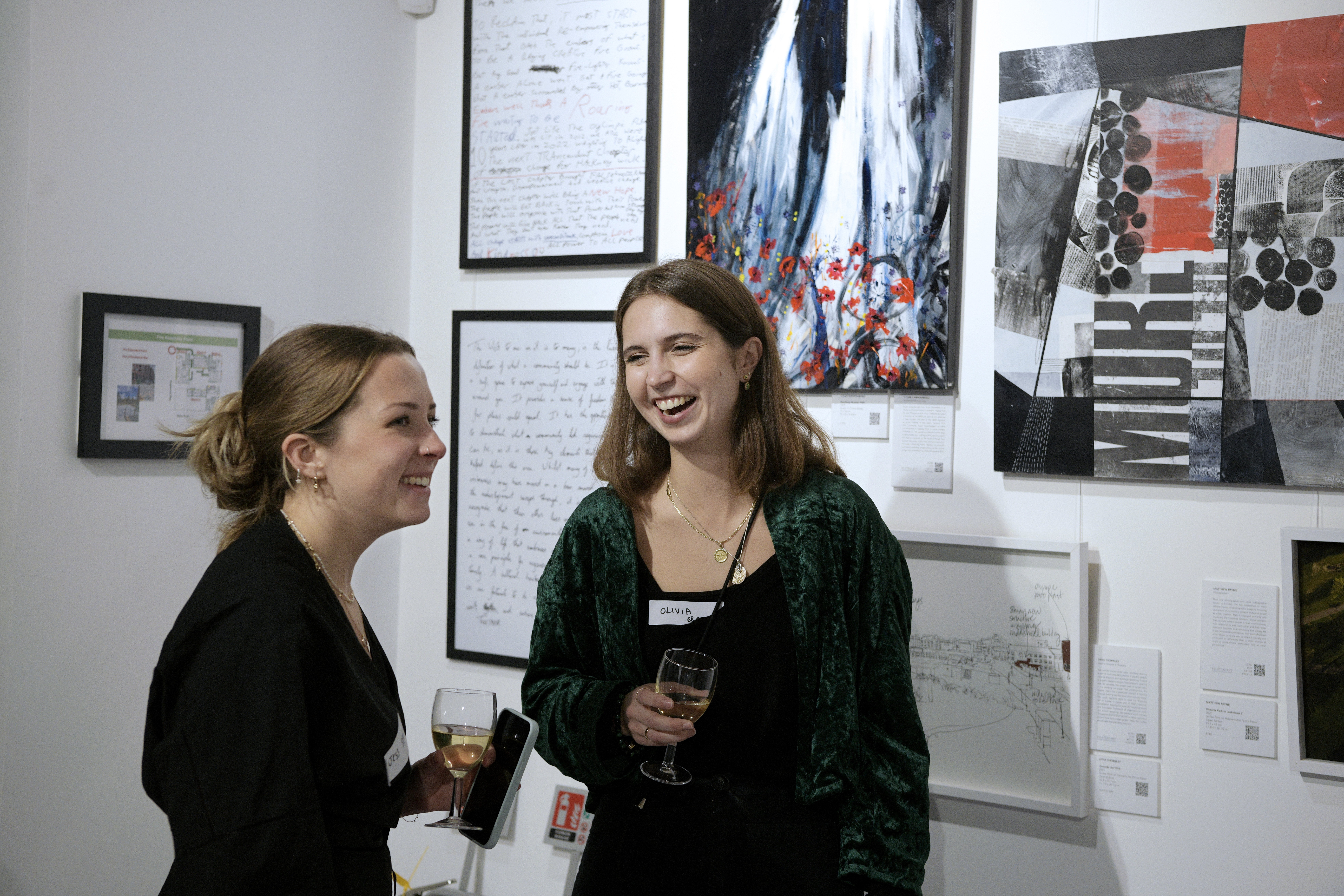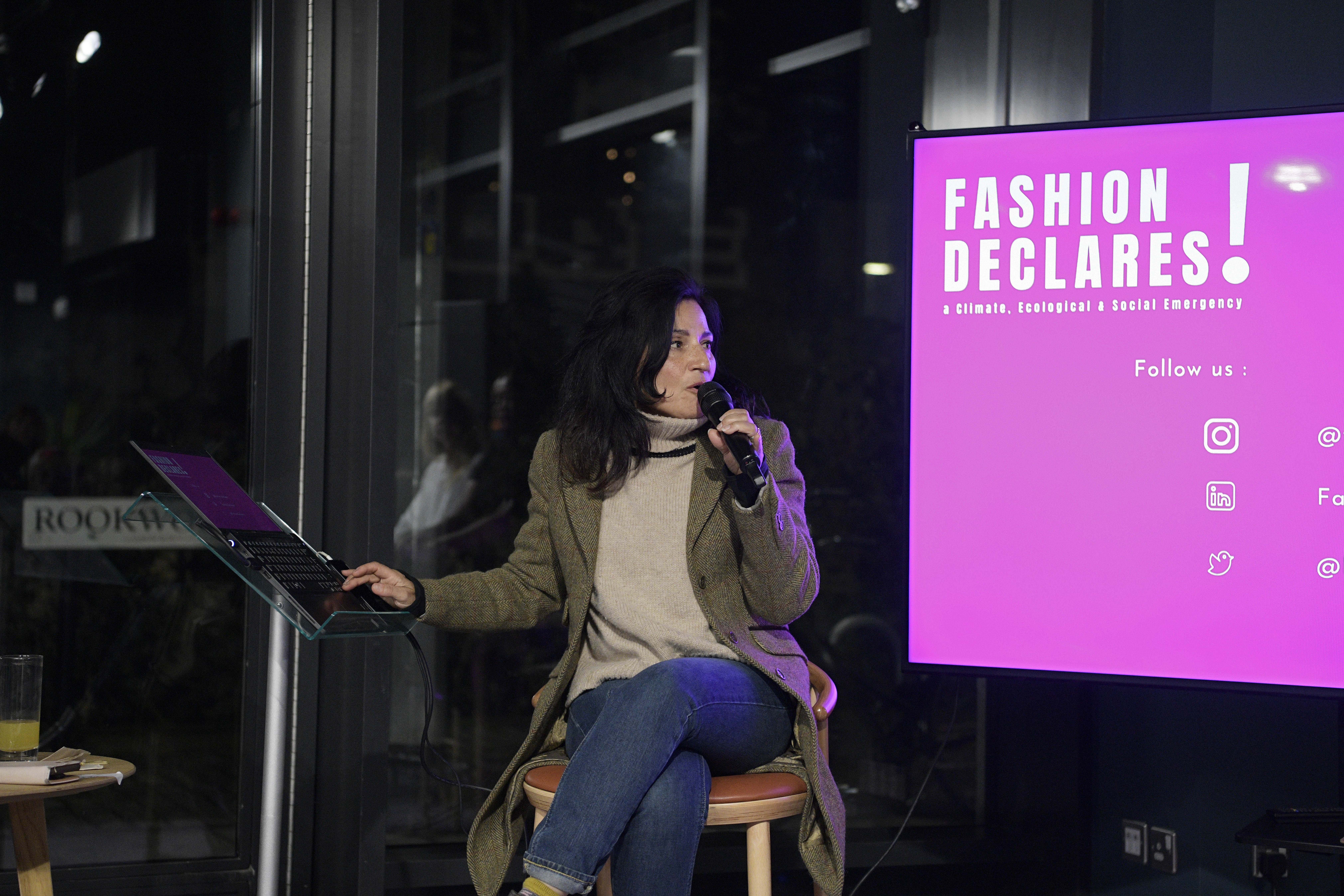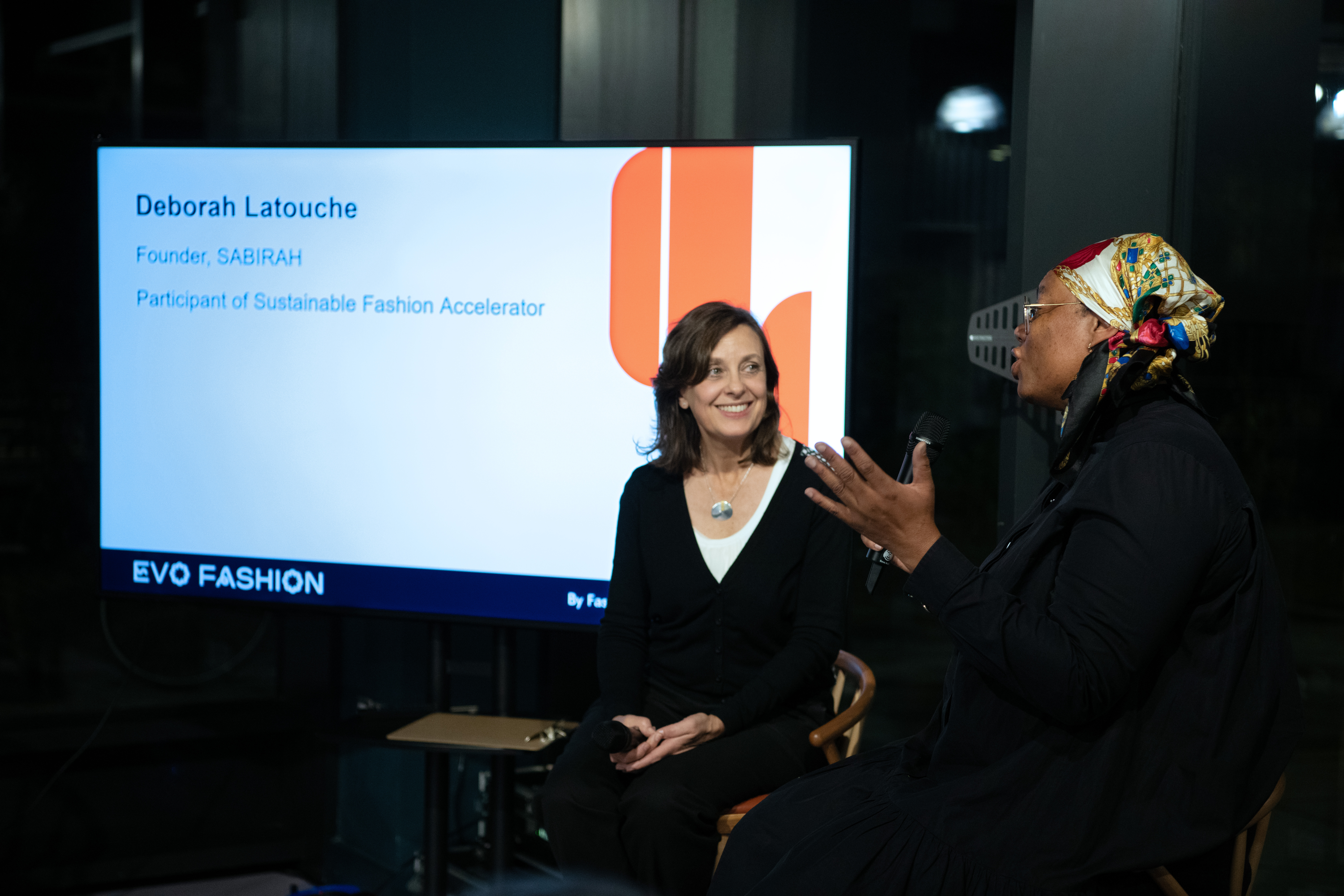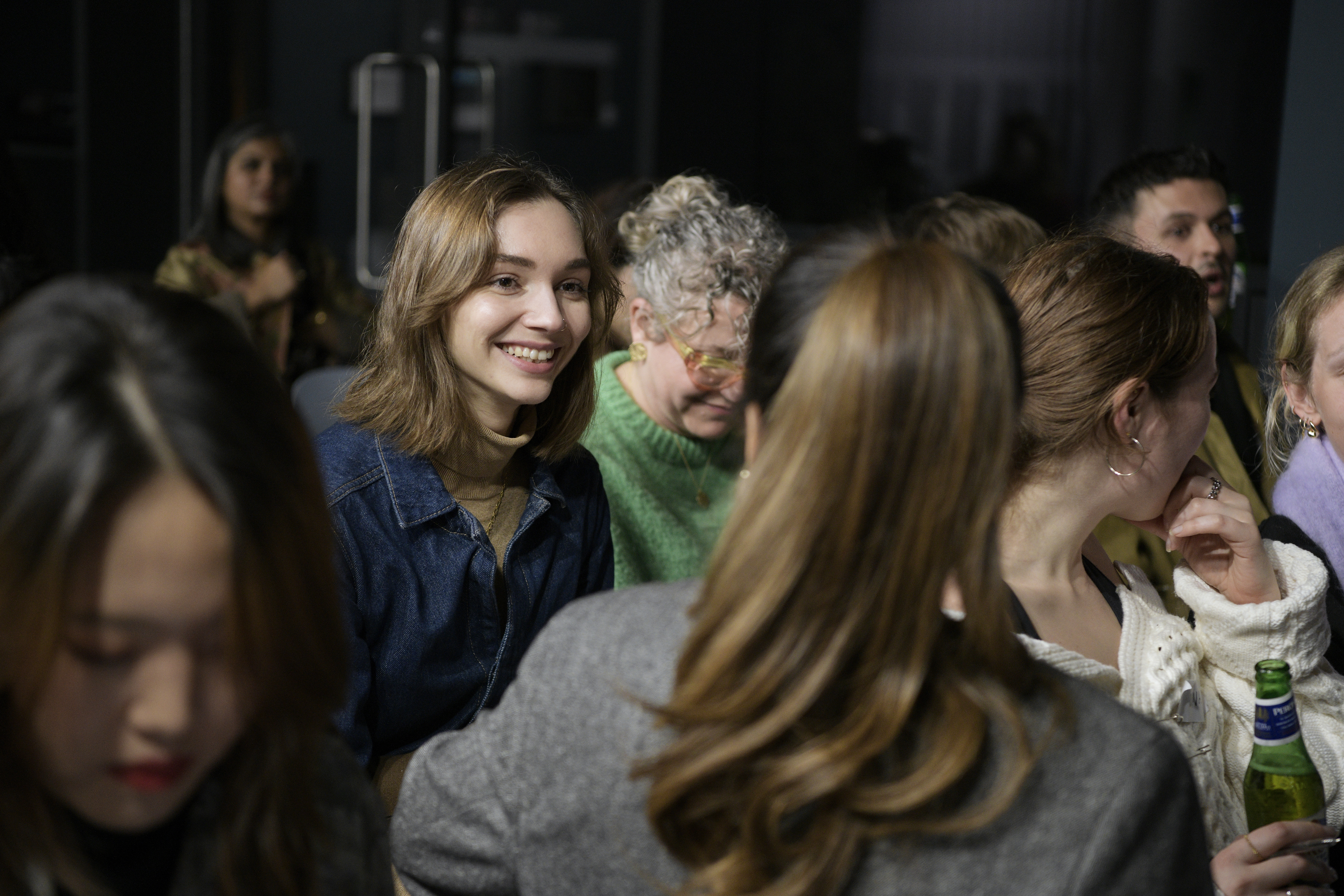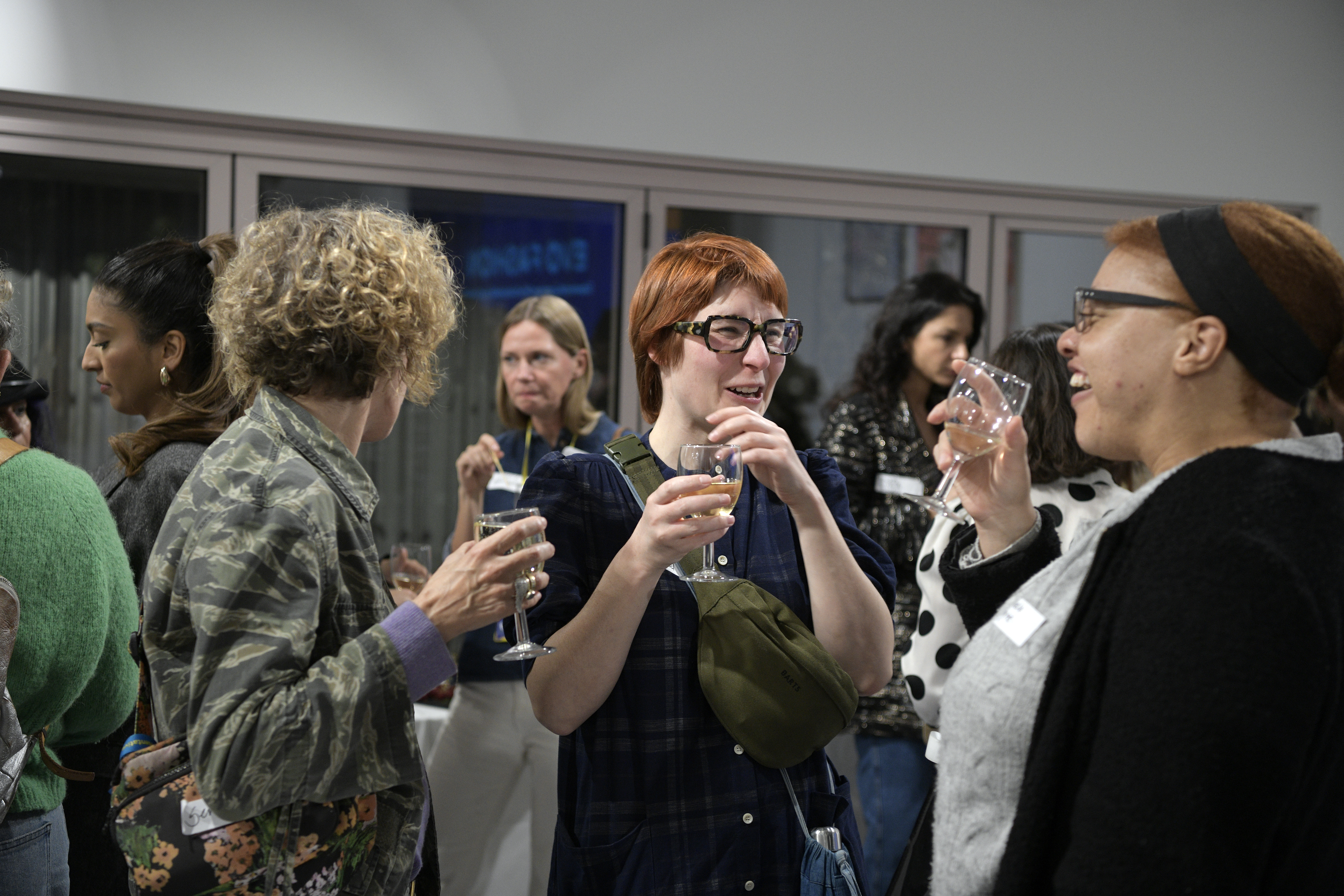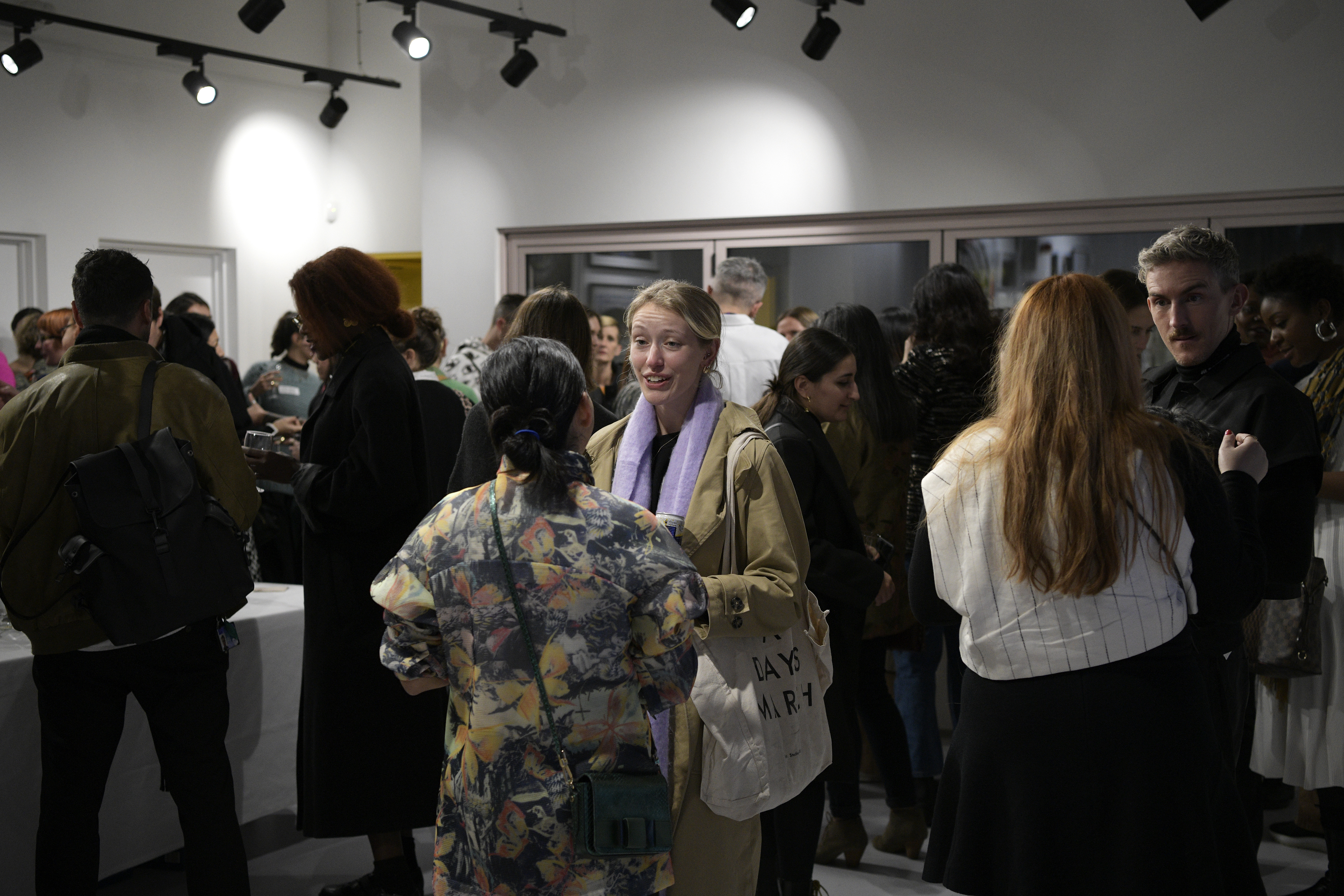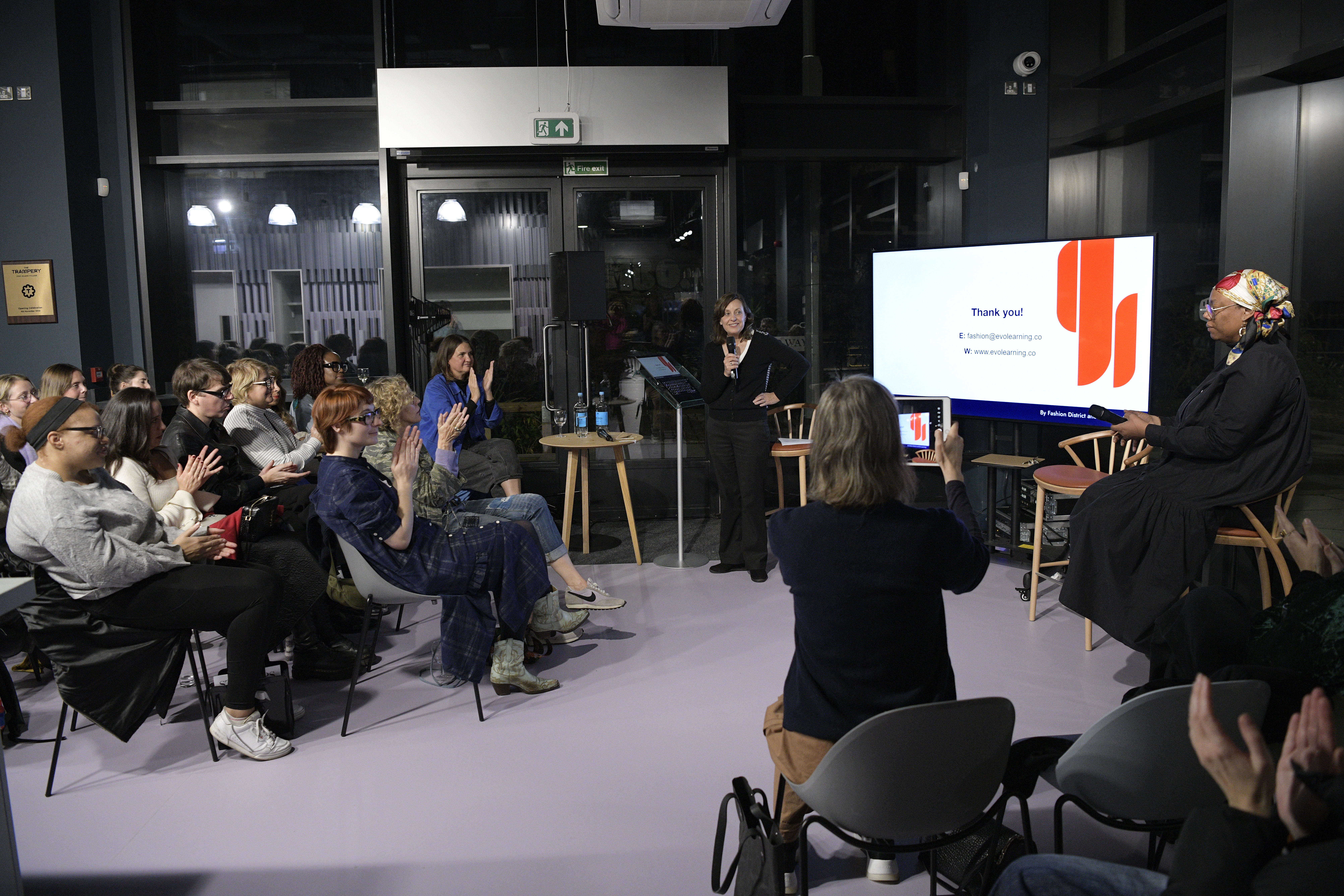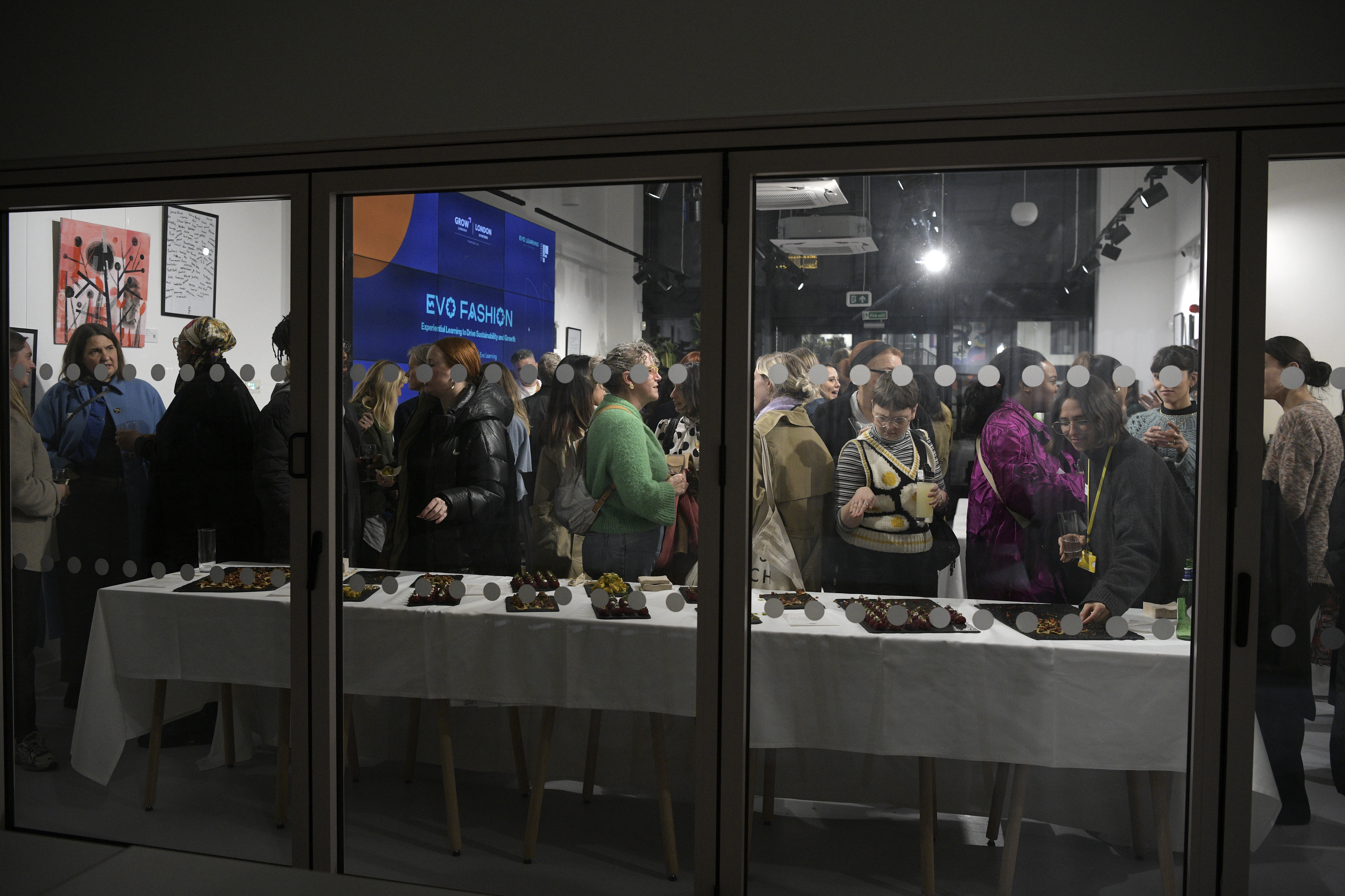Emerging Designers Graduate from Evo Fashion With a Showcase at The Conduit
On Wednesday 3rd July, the first cohort of fashion brands and designers graduated from our Evo Fashion programme, delivered in partnership with Evo Learning, at a special industry showcase at The Conduit.
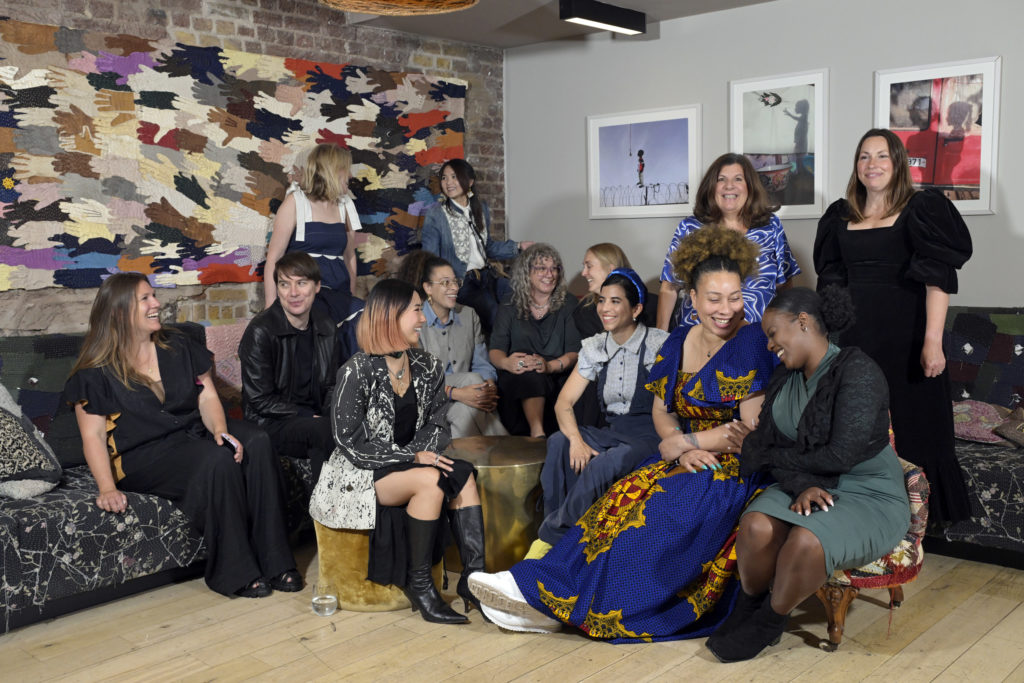
‘I want to say a big congratulations to our Evo designers—the first cohort to attend our Evo Fashion business programme—who are showcasing their outstanding products, garments, and accessories in the room tonight,’ says Helen Lax, Director of Fashion of District, onstage at the Manufacturing Futures 2024 Awards Supper. ‘The programme was designed to help businesses become more robust, focusing on all aspects of their operations, including finance, production, distribution, and product.’
Looking around the room at The Conduit, where mannequins draped in beautiful prints boldly catch the eye and rails displaying everything from chunky knitwear, summer dresses, and streetwear, to fun accessories, inclusive underwear, and luxury leather shoes are being perused by attendees, one can’t help but admire the wealth of talent showcased by the Evo Fashion designers. It’s not hard to feel optimistic about the future of the fashion industry with brands like these emerging.
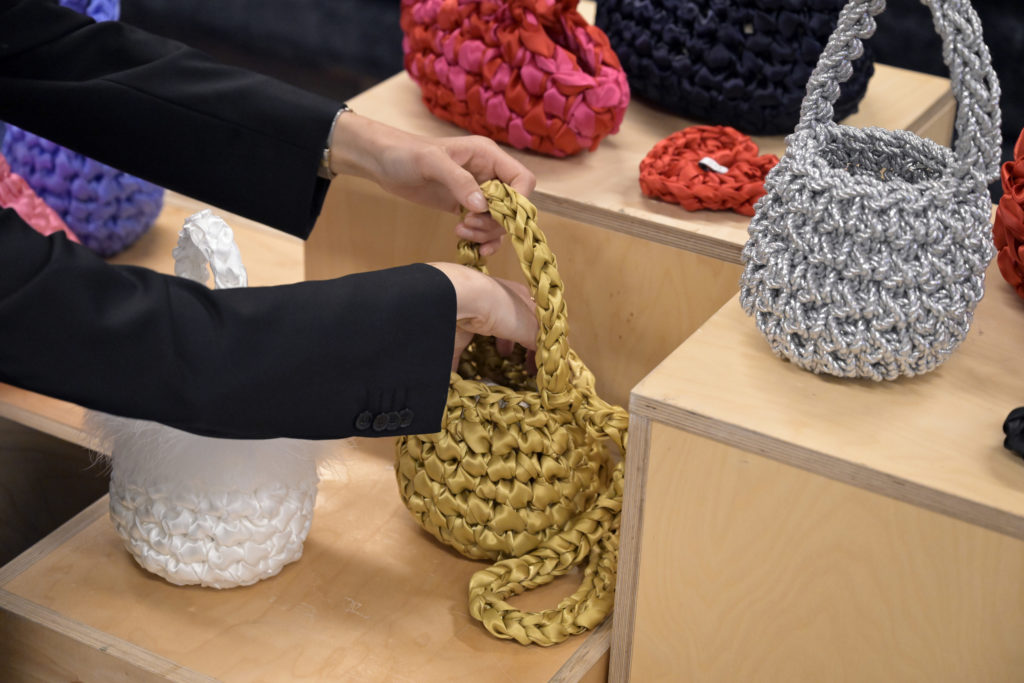
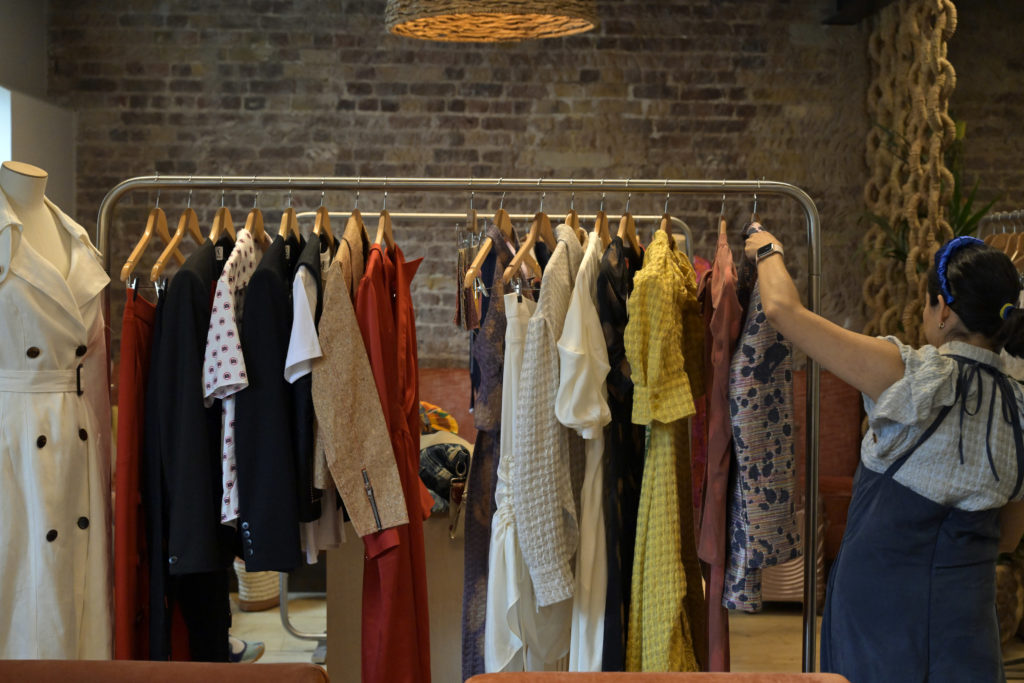
Delivered in partnership with Evo Learning, a training subsidiary of The Trampery, as part of London & Partners’ Early Stage Grow Programme funded by the UK Shared Prosperity Fund, Evo Fashion delivers an experiential programme for emerging brands that takes a holistic approach to business strategy, helping them drive growth while also integrating sustainability into every aspect of their businesses.
Designed to fit in with work commitments and delivered by experts, the programme consisted of a two-day intensive launchpad and four full-day masterclasses which focused on different aspects of learning, including environmental and social governance, exploring new business models, production and innovation, sustainable growth and investment, finance and business planning, and founder wellbeing, leadership and impactful teams. Peppered in amongst the sessions and masterclasses, there were panels and talks, tailored 1-2-1 mentoring, three peer-to-peer learning workshops, a creative photoshoot, and tonight’s presentation at Fashion District’s Manufacturing Futures 2024 Awards Supper to a room full of investors, brands, startups and innovators.
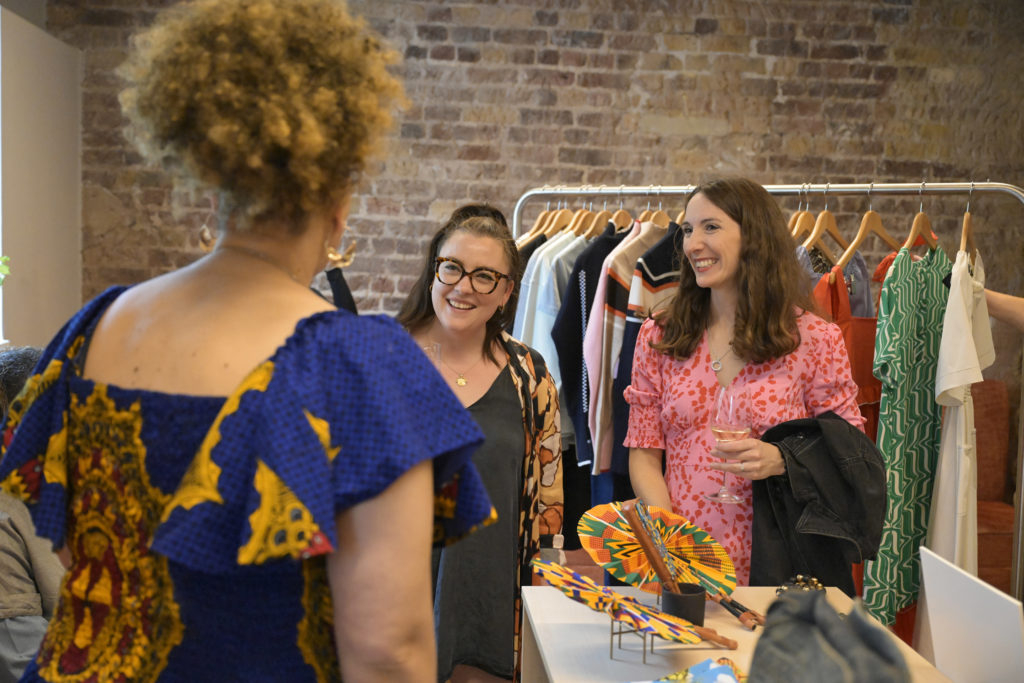
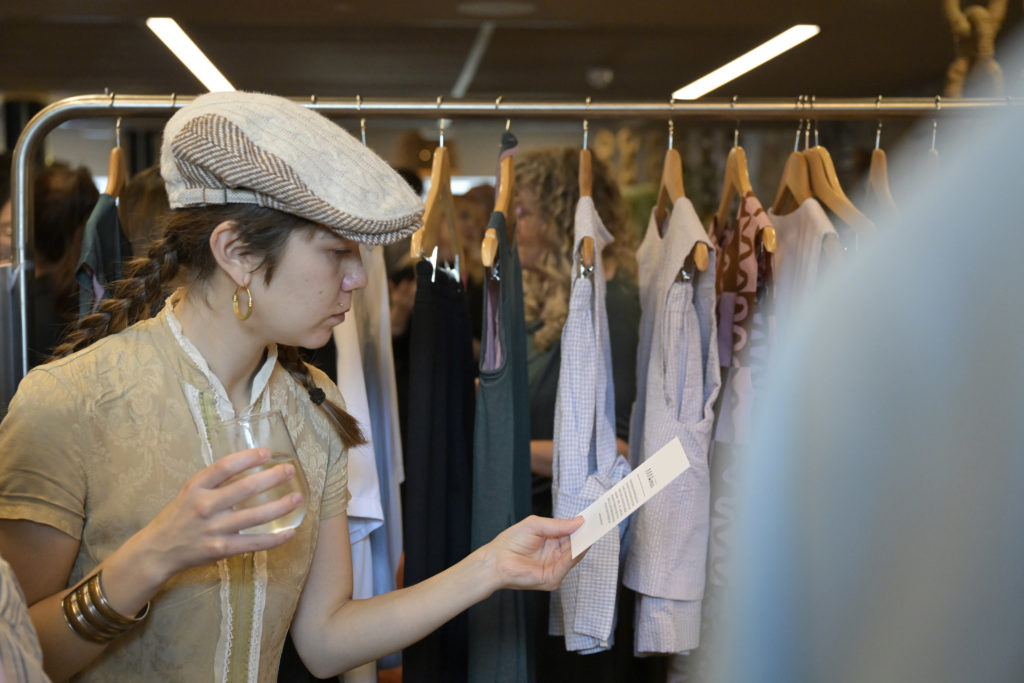
Selected by a stellar judging panel including Vanessa Podmore, Founder of Podmore Consulting; Yvie Hutton, Director of Design Relations and Membership at the British Fashion Council; Charles Armstrong, CEO of The Trampery, and Helen Lax, Director of Fashion District, our 15 participants were chosen based on their potential for business success and their commitment to integrating sustainability into their ventures.
The first Evo Fashion cohort included: Anciela, Asmuss, BEEN London, Clara Chu, Colèchi, Everyday Phenomenal, Fashion Meets Music, Isla de Gar, Kyle Ho, Mirla Beane, NEW STANDARD, OMNISS, Percy Langley, Pomi and Seeds, and ZERØ London.
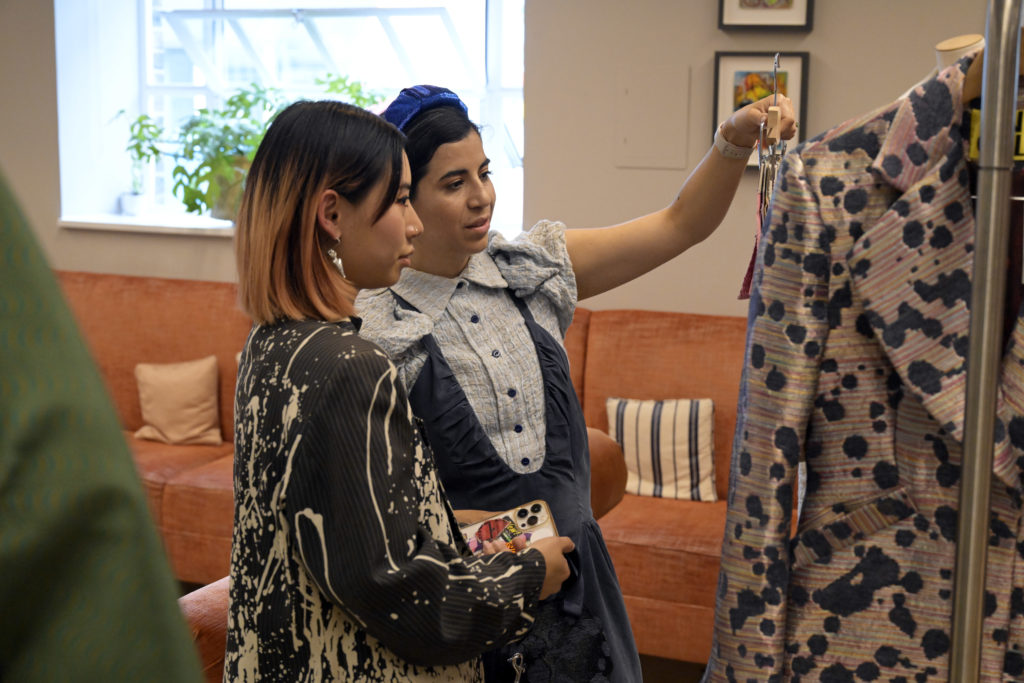
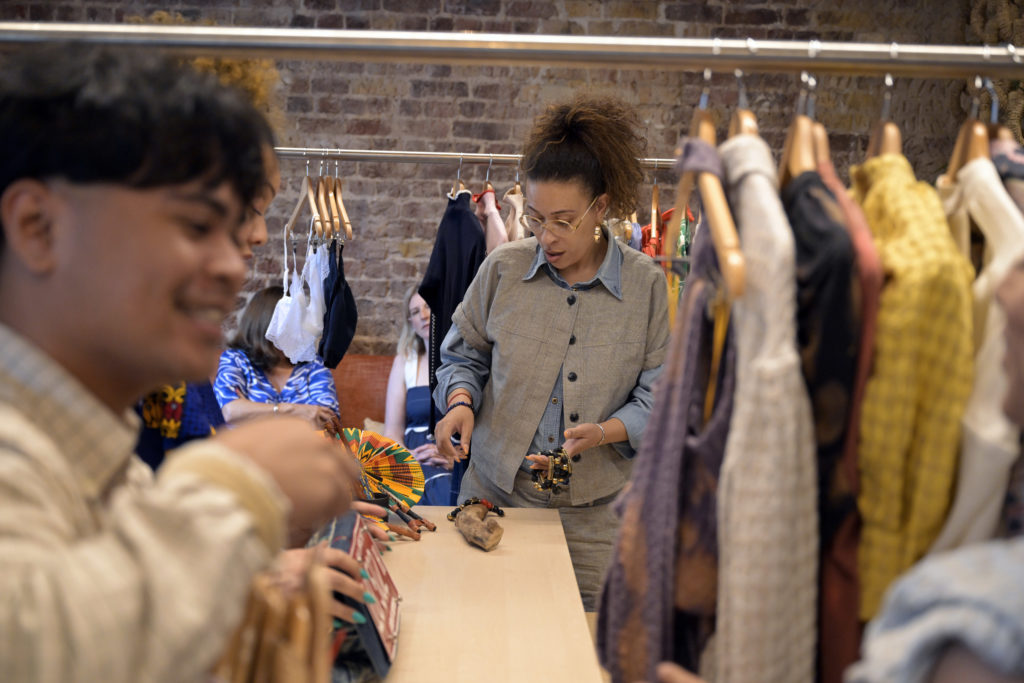
Speaking with Tukiya Mutupa, Founder of Pomi and Seeds, about the programme, she says, ‘I found the course really educational and practical. There aren’t a lot of programmes that help sustainability-focused fashion brands. This is the only one I’ve seen that’s fashion focused. I’ve been on learning programmes before that focused on wider business perspective development, but Evo Fashion was so comprehensive. We covered everything from manufacturing, materials, and product, to hearing from industry leaders and receiving tailored feedback in 1-2-1 sessions. It was amazing.’
Emma Garner, Founder of Isla De Gar, echoed this sentiment. ‘It’s been so valuable,’ she tells me. ‘I’ve been growing my brand organically, but I haven’t put any systems in place and that’s what this course has enabled me to realise. I come from a design background and started out as a designer and maker, so I didn’t really have any kind of goals or plans – I was just obsessed with bags! When I heard about Evo Fashion and its focus on business growth, finance, and sustainability, I realised it was the perfect fit for me. I liked that the programme offered tailored guidance with personalised 1-2-1 sessions and I found the marketing and financing days so useful. Those areas aren’t my forte, but I’ve now realised those are the things I need to hone in on.’
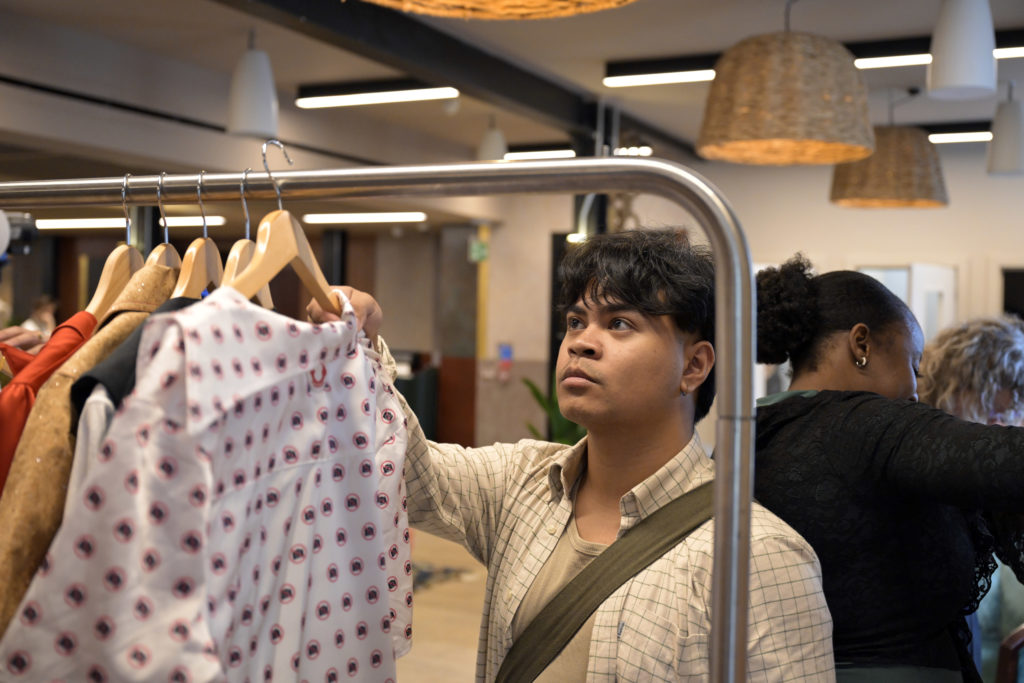
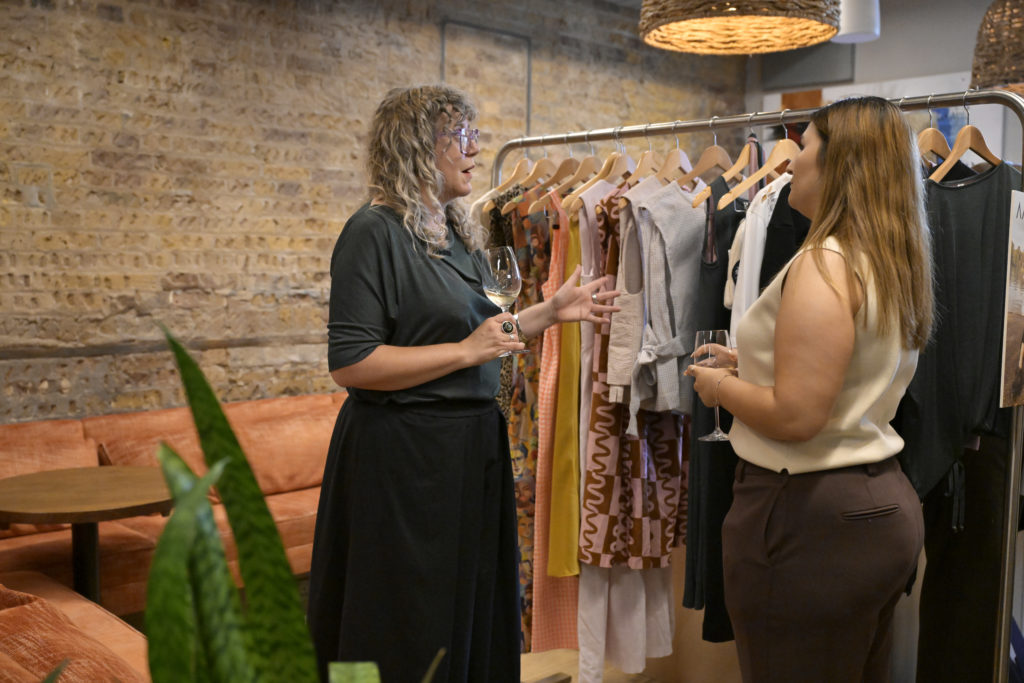
‘What we loved about the Evo Fashion programme was how holistic the content was,’ says Lizzy Lambie, Co-Founder of Fashion Meets Music. ‘There was a lot about personal wellbeing, and for us as a brand that’s really important. Hearing from bigger brands, for example Primark, was also useful. It’s interesting to hear from different kinds of brands and how they’re implementing sustainability into their businesses. We may be SMEs, but it all trickles down to us at the end of the day.’
Clara Chu, multidisciplinary artist and designer, says the course provided her with numerous insights. ‘We discussed the vision for our brands in Vanessa Podmore’s sustainability session, and I came away pondering how to make truly impactful change. After Stuart Balmer’s finance and investment session, I thought about how to keep my business afloat without going bankrupt. Emily Bingley’s marketing and communications session made me consider how to effectively communicate my brand’s message to the public. The course was well-rounded, bringing together various perspectives. Now, it’s time to follow their advice and take the next steps.’
We can’t wait to follow these fifteen brands’ journeys. Stay tuned to hear about Evo Fashion’s second cohort soon!
All images: Christian Sinibaldi
Stay up-to-date on our latest events and opportunities by following us on Instagram and LinkedIn:
- Instagram: @fd_ldn
- LinkedIn: Fashion District – London
Inside the Launch of Manufacturing Futures 2024
Last week we celebrated the launch of Manufacturing Futures 2024 at a sold-out event at The Trampery.
Marking Fashion District’s sixth innovation challenge, this year the focus is on technological innovations and sustainable solutions that are solving any of the complex fashion manufacturing challenges facing the industry. Helen Lax, Director of Fashion District, described the event as a gathering of individuals that share ‘the same ethos, values and ideas for the future of fashion and sustainability.’
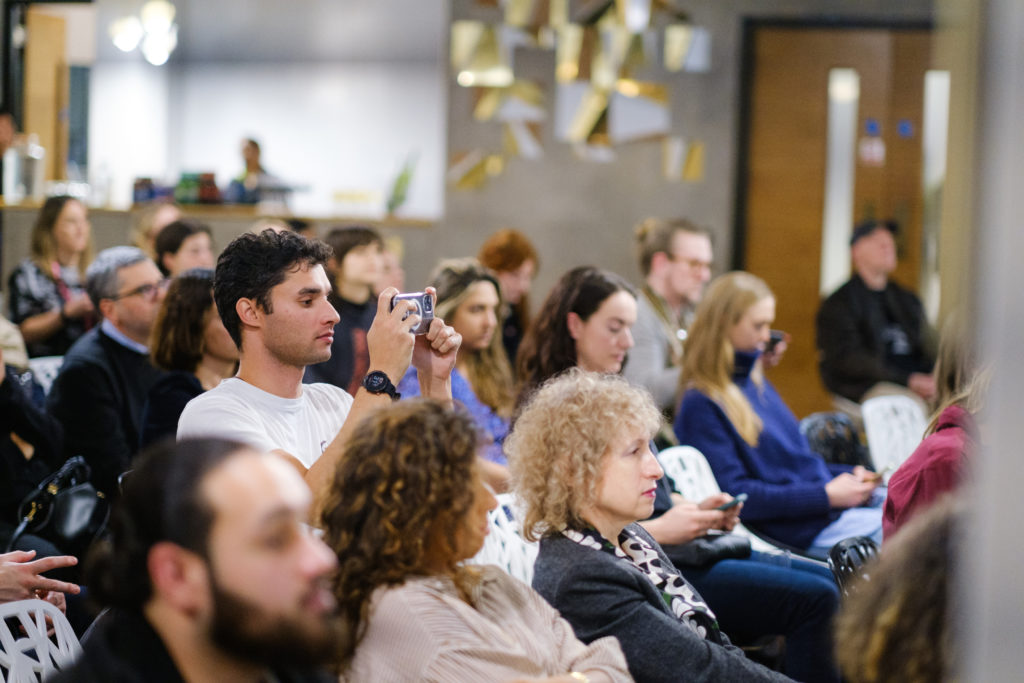
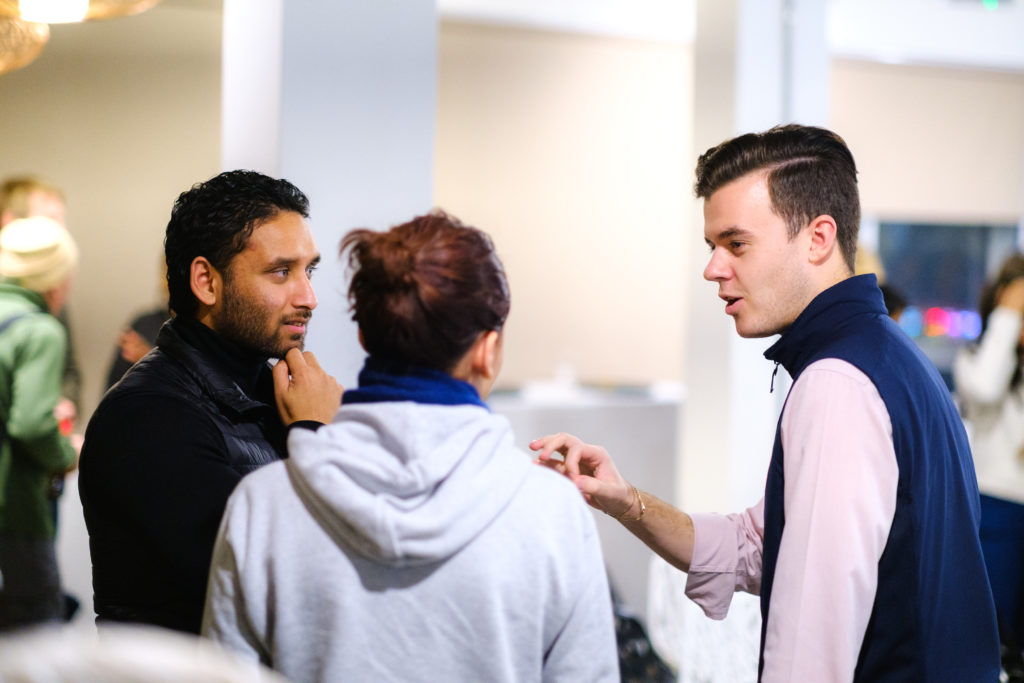
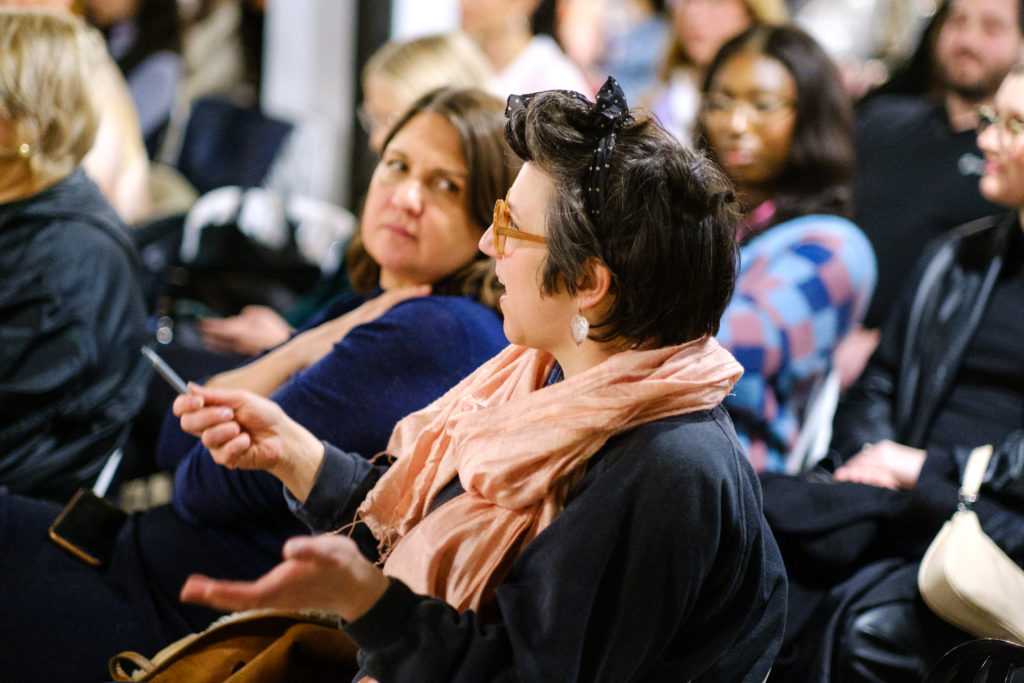
GANNI: Fabrics of the Future
Kicking off the event was keynote speaker Lauren Bartley, Chief Sustainability Officer at GANNI, who gave insight into GANNI’s strategy and how they work with innovation. ‘GANNI has a very very ambitious goal to reduce its carbon emissions by 50% by 2027,’ Lauren said. ‘The materials we use account for 50% of our carbon impact, making this our primary window of opportunity. It’s also where Ganni should focus as materials represent one of our most significant decarbonisation levers.’
Lauren also highlighted GANNI’s Fabrics of the Future initiative. ‘Fabrics of the Future is an internal research and development hub that scans the market for fabrics that will change the industry. At this point we’re working with thirty different material creators that have solutions or new innovations for materials. By 2025 the goal is that 10% of our materials should be coming from fabrics of the future.’
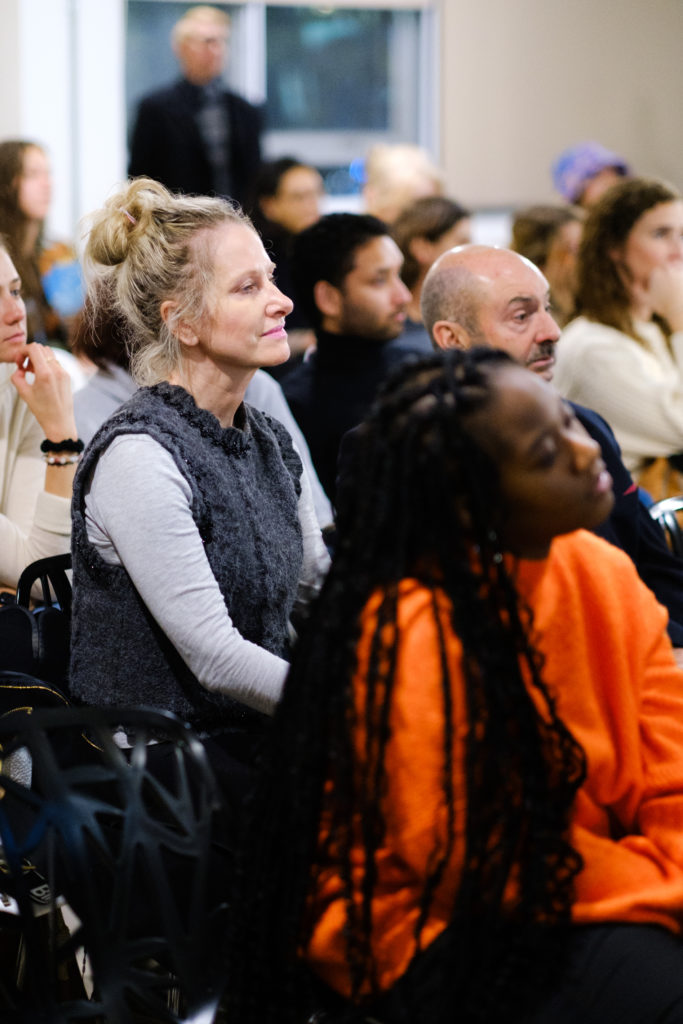
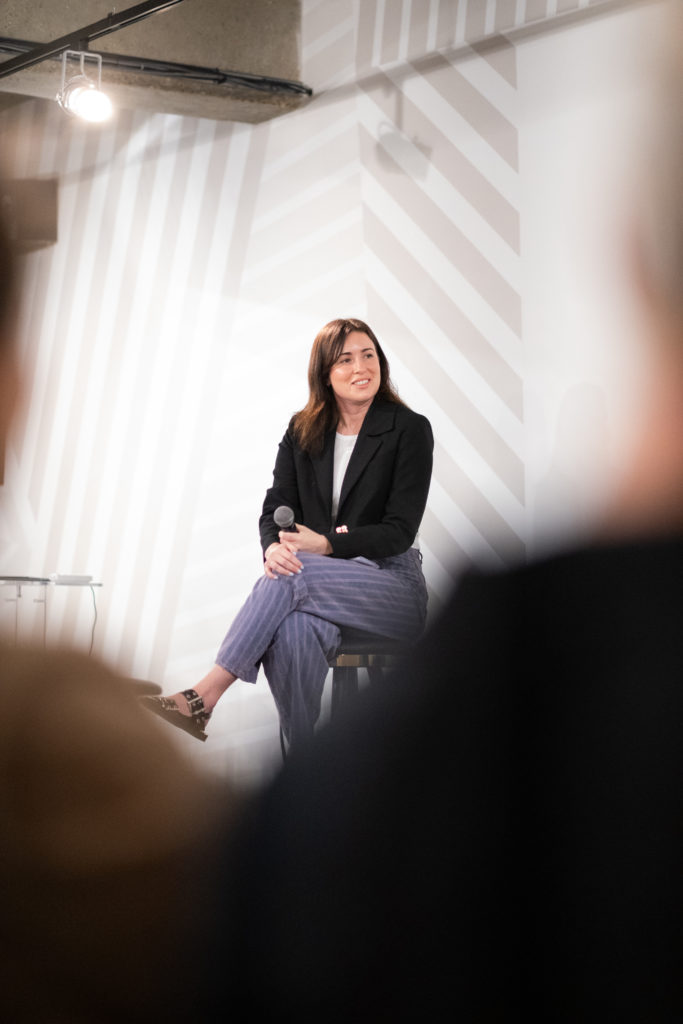
The Need for Partnership: Modern Synthesis x GANNI
One of the material creators GANNI have collaborated with is London-based biotech company Modern Synthesis. Lauren invited Jen Keane, CEO of Modern Synthesis, on stage to discuss their recent partnership.
Having developed a new class of biomaterials, Modern Synthesis works with bacteria to produce a type of non-woven textile that can be used to displace materials like leather, and in the future replace a wide variety of coated textiles. Modern Synthesis partnered with GANNI to reimagine their staple Bou Bag in their new innovative bacterial nanocellulose material. The handbag was unveiled at the London Design Festival 2023.
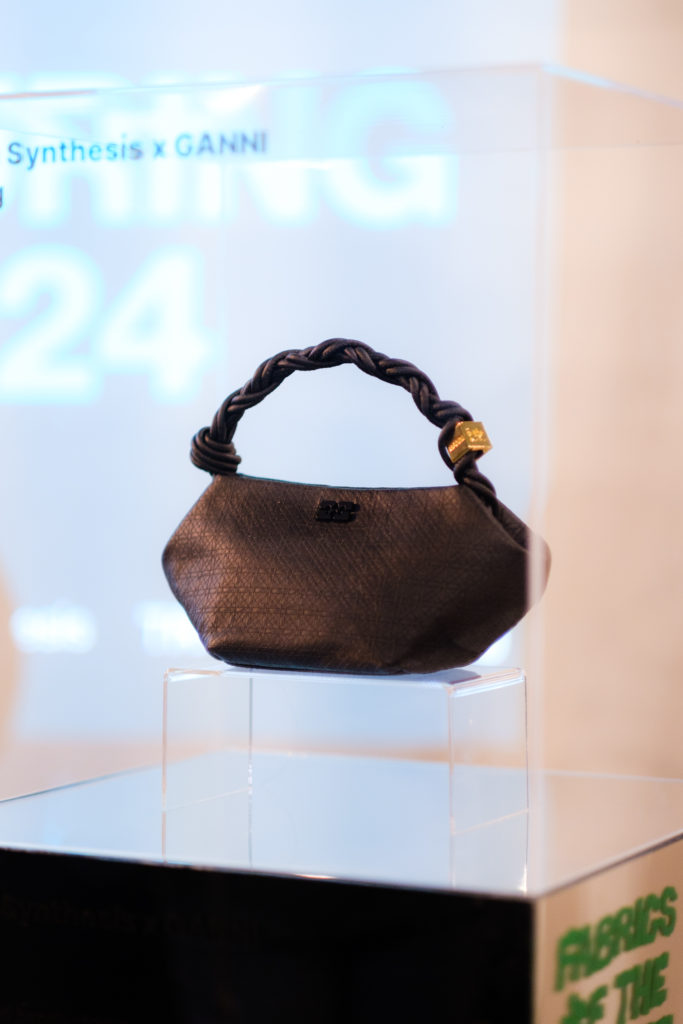
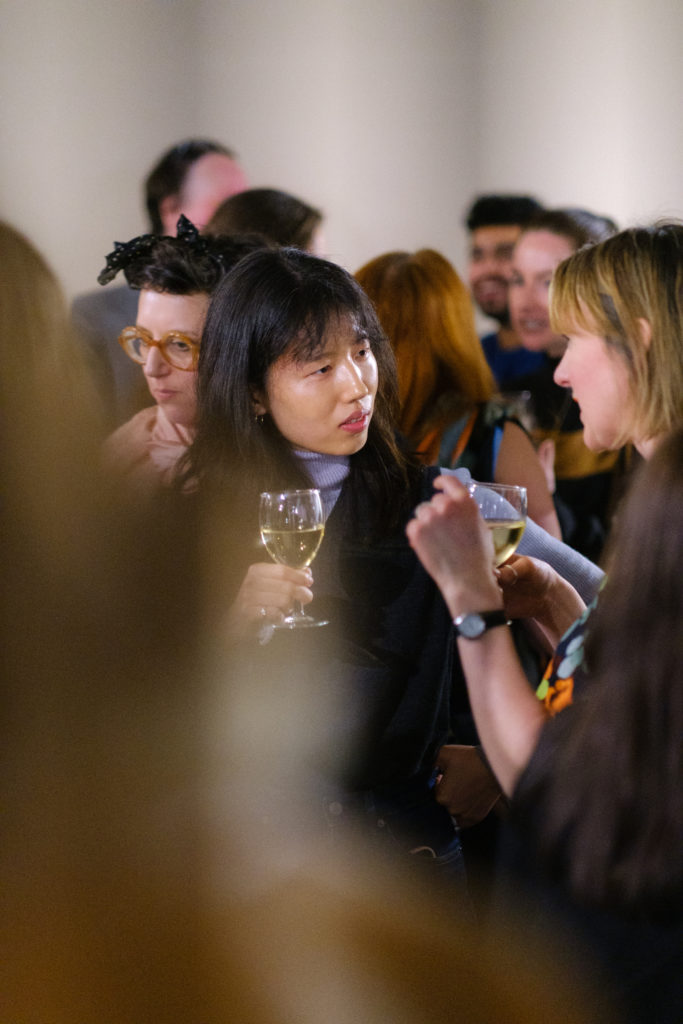
Explaining why Modern Synthesis reached out to GANNI to propose a potential collaboration, Jen said, ‘As a startup that makes materials, we can’t do it all. We need to actually make the impact that we want to drive and so we have to get it into a product. We need brands and partners across the whole supply chain to make that possible. We contacted GANNI because they have such a strong perspective in this space and actually take action. Very few brands have innovation departments.’
Lauren rounded up the conversation by saying: ‘I hope that what you’ll take away from our talk today is that GANNI relies heavily on innovations like Modern Synthesis to meet our sustainability goals, and vice versa. Jen needs brands like GANNI to secure investment and effectively implement these technologies. It’s important not to underestimate the value of partnership.’’
Offering one final tip to the audience Jen said, ‘Don’t give up! It’s hard but we’re gonna get there. My biggest advice is to collaborate as much as possible. You can’t do everything yourself. Figure out what you’re good at, what you’re not good at, and find friends to do the things you’re not good at.’
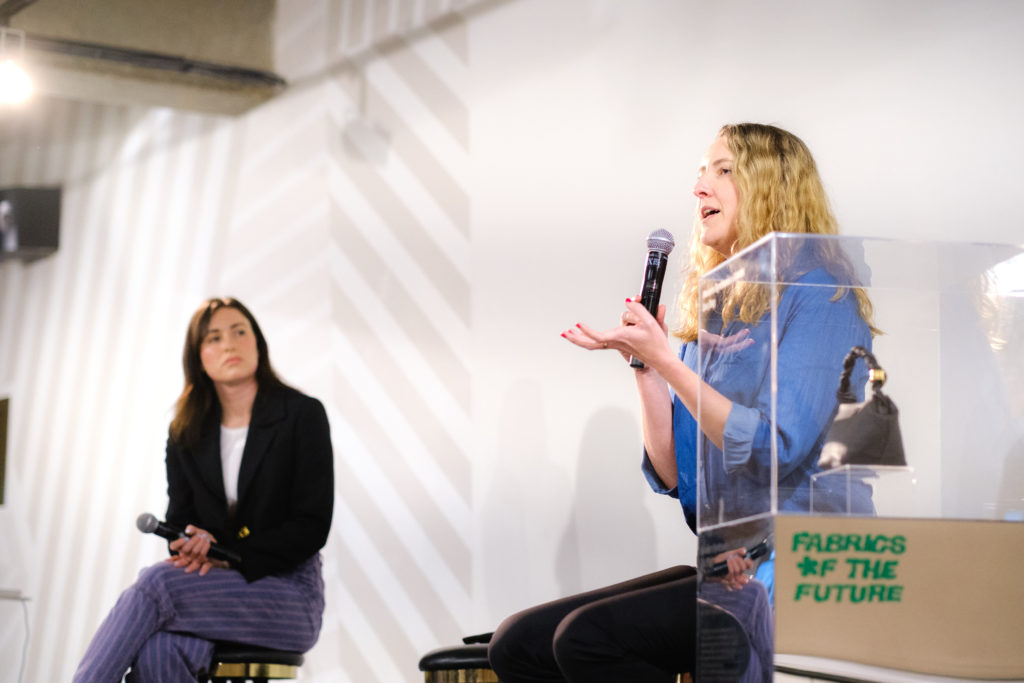
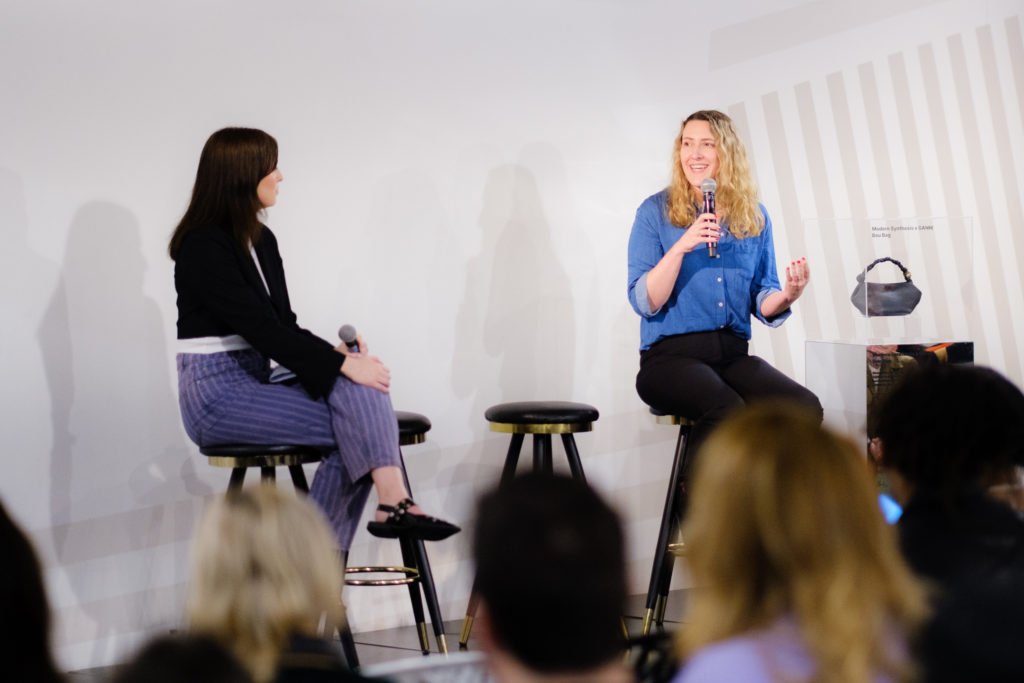
Introduction to Manufacturing Futures 2024
Helen Lax then took to the stage to introduce this year’s innovation challenge, Manufacturing Futures 2024. ‘This year, we’re seeking innovative ideas, businesses, and startups that can benefit the fashion industry by offering sustainable solutions for various aspects of the supply chain.’
To be eligible for the challenge, applicants must have a tech-based solution, be a registered business, and either be operating in the UK or have plans to pilot or operate in the UK. The winner will take home £15,000, as well as receiving business support from PANGAIA, one-year complimentary UKFT membership, one-year workspace membership at The Trampery and one-year platform membership from Common Objective. The runners-up will receive £5,000 each, one-year UKFT membership and one-year platform membership from Common Objective.
Finalists will attend a one-day event in May where high-level industry professionals will act as ‘critical friends’ to support and challenge their business proposition, and provide constructive feedback; as well as two Development Days focused around production and investment. Finalists will also be invited to join the celebratory Fashion District Innovation Awards and Investment Supper in July, attended by influential members of the fashion, tech and investment industry.
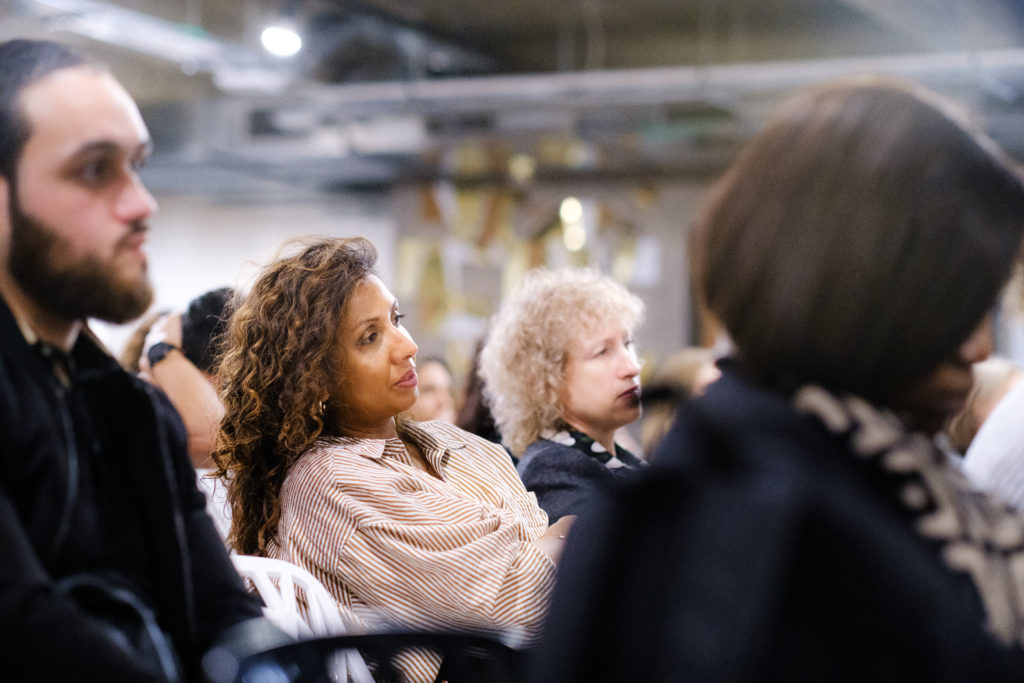
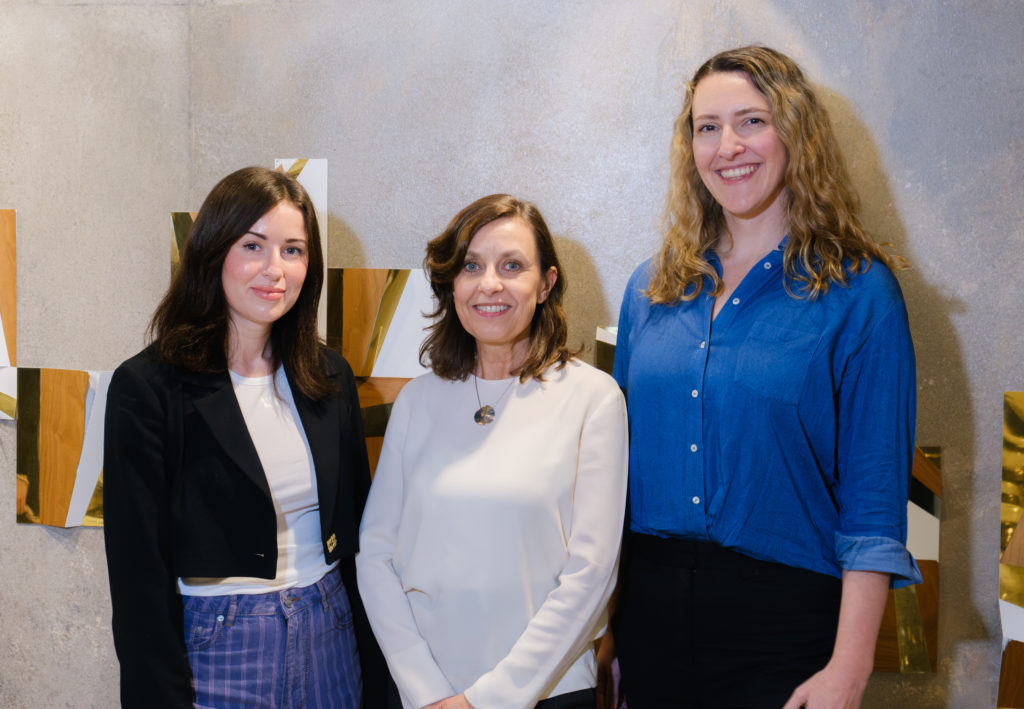
Meet The Judges
After running through the details of this year’s manufacturing challenge, it was time to hear from our incredible judging panel: Chelsea Franklin, Head of Advanced Concept Design, PANGAIA; Adam Mansell, CEO, UKFT; Gillian Lipton, Head of Sustainability, Alexander McQueen; Ella Gould, Head of Circularity and Innovation, Selfridges, and Matthew Drinkwater, Head of Fashion Innovation Agency, UAL: London College of Fashion.
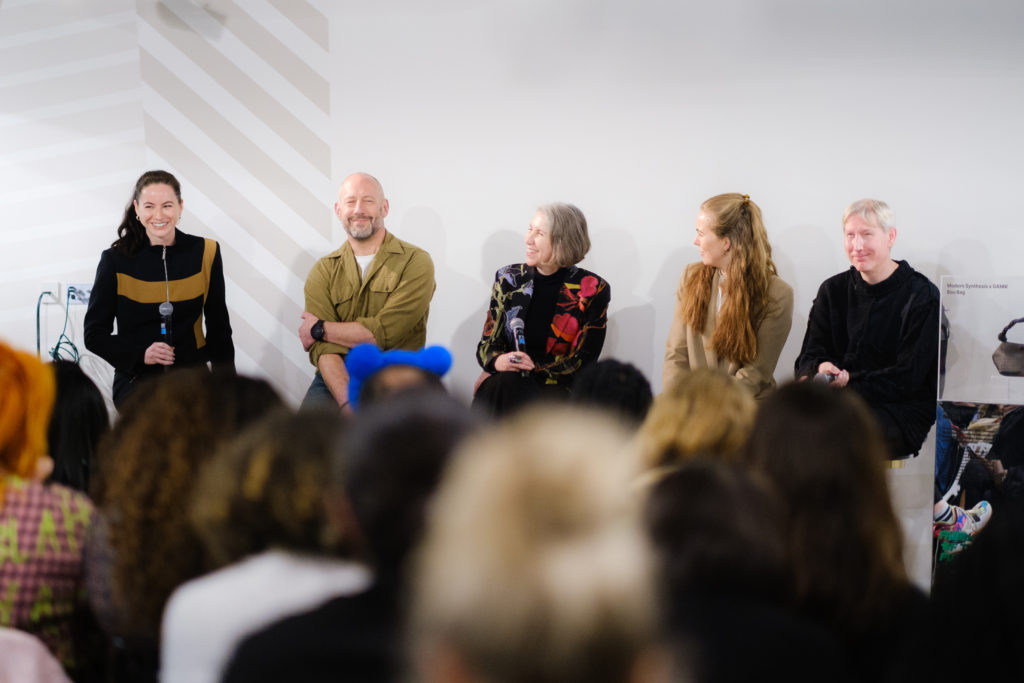
Discussing their criteria for the challenge, Matthew Drinkwater said, ‘Above all, I want to feel excitement for an application that I’m reading. It’s that magical moment…you want to transform the innovation into a real thing.’
Ella Gould added, ‘I’m always sceptical when someone comes to me with big tech and they only talk about the technology. Come to me with a problem, tell me the problem that you’re solving or why you’re doing something better. That for me is when the juices start flowing and I get really inspired.’
Gillian Lipton stressed the importance of time. ‘For me it’s all about finding a solution that is scalable, but also that I don’t have to wait too long for. I’m aware that things take time, in terms of innovation and new materials, but we don’t have time!’
Adam Mansell stated the biggest problem for him was volume. ‘I love new materials, new materials are fantastic, but if someone came up with a concept that would allow us to take all the cotton, polyester, and wool that we use, capture it, recycle it, get it manufactured in the UK, that gets my vote. You’d get lifetime membership to UKFT if you can solve that! But genuinely that’s where the problem is. That’s where the focus really needs to be.’
Chelsea Franklin urged applicants to consider the customer. ‘Functionality is obviously very important in terms of innovation performance, but also understanding how to convince a consumer to buy something, such as an alternative fabric – why? If the price is so much more significant, why should they purchase it? How do you tell that story? Build that narrative?’
The event concluded with key advice from the judges. Matthew Drinkwater advised applicants to think about clarity of message. ‘What problem are you solving? Answer all of those questions fully and critically, and you stand a really good chance of getting through.’
Chelsea Franklin echoed this. ‘Articulating your vision is a skill in itself. We want to know what problem you’re solving, problem solution framing, and why we should care. If you can answer that clearly and visually that’s my top tip.’
‘Don’t bring me something that’s been done five years ago,’ Adam said. ‘Do your homework. Do proper market research. Also read the application questions carefully and answer them clearly. Look at the finances bit, because it’s really important that you’re thinking beyond the initial. Think about what the future looks like, and don’t tell me that you’re going to be a billion pound turnover company in five years time. It’s hard work. It takes a lot of effort and collaboration and that should not be why you’re in this space, you should be in this space to solve a problem.’
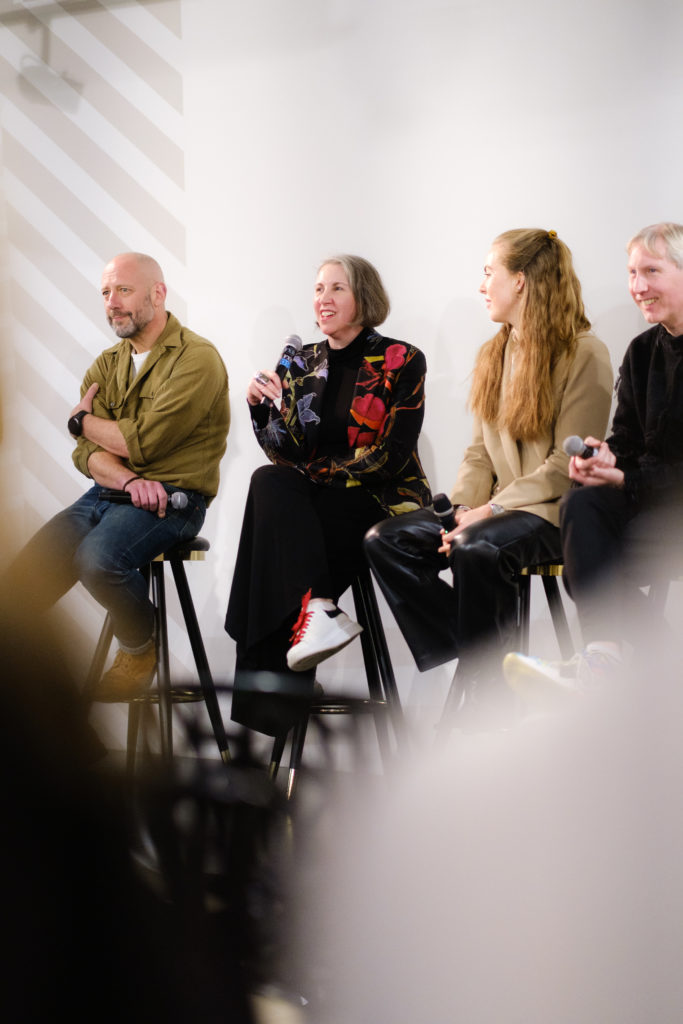
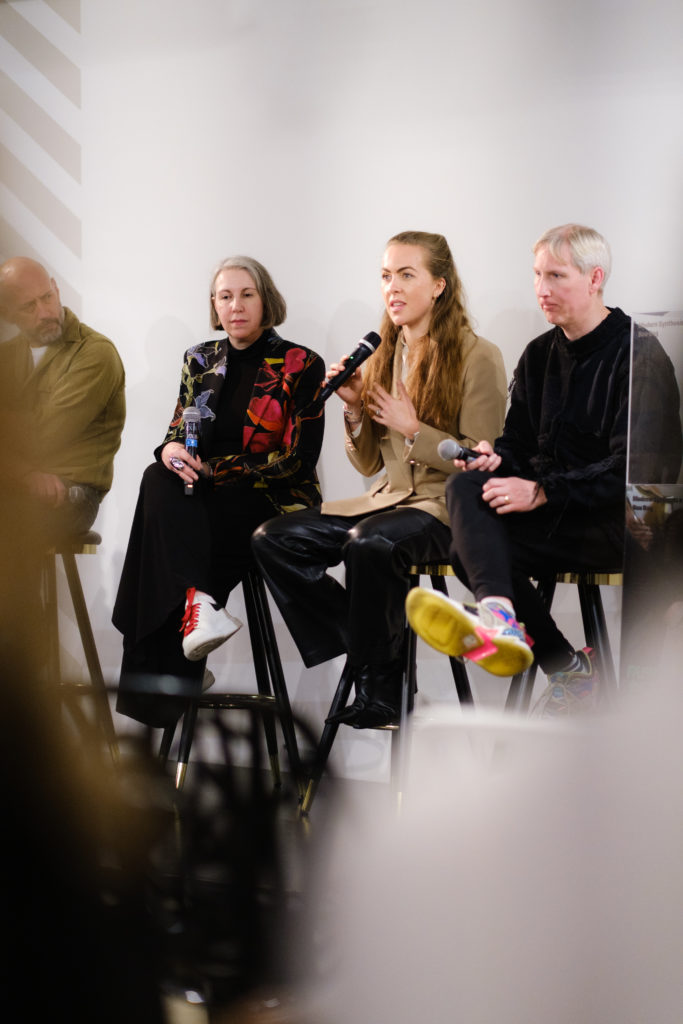
Do you think you’ve got what it takes to manufacture a new sustainable solution? Want to be in with a chance of winning £15,000? Applications for Manufacturing Futures 2024 are now open!
Follow us on Instagram, LinkedIn, Facebook and Twitter to stay update-to-date on our latest events and opportunities:
- Instagram: @fd_ldn
- LinkedIn: Fashion District – London
- Facebook: Fashion District London
- Twitter: @fd_ldn

Come to the launch of our new Innovation Challenge: Manufacturing Futures 2024
Thursday 8 Feb | 18:00 – 20:30
The Ballroom, The Trampery, 239 Old Street, London, EC1V 9EY
We’re delighted to announce the launch of our next innovation challenge Manufacturing Futures 2024, hosted in partnership with The Trampery, a purpose-led enterprise providing workspace, training and management for London’s trailblazing businesses. Join us on 8th February to find out more about next year’s challenge, hear from leading figures in fashion sustainability, and network with London’s fashion, tech and innovation communities.
To help us launch the challenge, we’ll be hearing from Lauren Bartley, Chief Sustainability Officer at GANNI and Jen Keane, CEO of Modern Synthesis, one of our Manufacturing Futures 2021 winners. Lauren will present a keynote on embedding innovative sustainable solutions into a large brand, followed by a discussion with Jen about how the GANNI x Modern Synthesis partnership came about.
Afterwards, we’ll launch next year’s challenge brief, followed by a ‘meet the judges’ panel, where attendees will get the opportunity to learn more about our judges and find out their criteria for selecting the winners. The evening will conclude with networking, drinks and nibbles.
Agenda:
- 6:00pm – Drinks and canapés
- 6:30pm – Welcome and intro by Helen Lax, Director of Fashion District
- 6:35pm – Keynote speech with Lauren Bartley (GANNI) and Jen Keane (Modern Synthesis)
- 7:05pm – Introduction to Manufacturing Futures 2024
- 7:20pm – Meet the Judges
- 7:35pm – Q&A
- 7:45pm – Wrap up and close
- 7:50pm – Networking and drinks
About The Challenge
Fashion District’s annual Innovation Challenges are designed to find solutions to current industry issues, while supporting new innovations and SMEs. Next year, we’re running our second ‘Manufacturing Futures’ challenge, to support technological innovations and sustainable solutions which are solving any of the complex fashion manufacturing challenges facing the industry. This could include anything from:
- Materials innovation
- Digital innovation
- Manufacturing processes
- Waste management
- Supply-chain and logistics
- Transparency and traceability
- Circular economy
- End-of-use
We also seek to encourage tech solutions, perhaps from other sectors, that could be applied to fashion manufacturing and create interdisciplinary connections between technologists and engineers, and fashion creatives and manufacturers.
Applicants will be in with the chance of winning cash prizes, business support, and the opportunity to pitch to some of the industry’s leading brands and innovators.
MEET OUR JUDGES
Manufacturing Futures 2024 brings together high-profile fashion, technology and sustainability experts committed to supporting the next wave of innovation. Come along to the launch to hear from our esteemed judging panel, including:
- UKFT (Adam Mansell, CEO)
- Selfridges (Ella Gould, Head of Sustainability and Innovation)
- Alexander McQueen (Gillian Lipton, Sustainability Director)
- Fashion Innovation Agency (Matthew Drinkwater, Head of FIA at UAL: London College of Fashion)
- PANGAIA (Chelsea Franklin, Head of Advanced Concept Design)
Follow us on Instagram, LinkedIn, Facebook and Twitter to receive updates about this exciting event!
- Instagram: @fd_ldn
- Facebook: Fashion District London
- LinkedIn: Fashion District – London
- Twitter: @fd_ldn

Evo Fashion Launch at The Trampery, Fish Island Village
Last week we launched Evo Fashion, our free five-month business support programme that will be running throughout 2024.
Taking place at The Trampery Fish Island Village, the event offered attendees the chance to hear from industry experts, learn more about the Evo Fashion programme and network with London’s sustainable fashion community over drinks and delicious canapés from Palm Greens.
Speaking to the crowd, Helen Lax, Director of Fashion District, said ‘We are looking forward to the next evolution of fashion and the power of fashion designers and fashion technology businesses who are thinking about embedding sustainability into all of their business practices.’
The programme, which is part of the Grow London Early Stage programme by London & Partners, and funded by the UK Shared Prosperity Fund, is designed to help early stage fashion businesses drive growth and integrate sustainability into every aspect of their businesses.
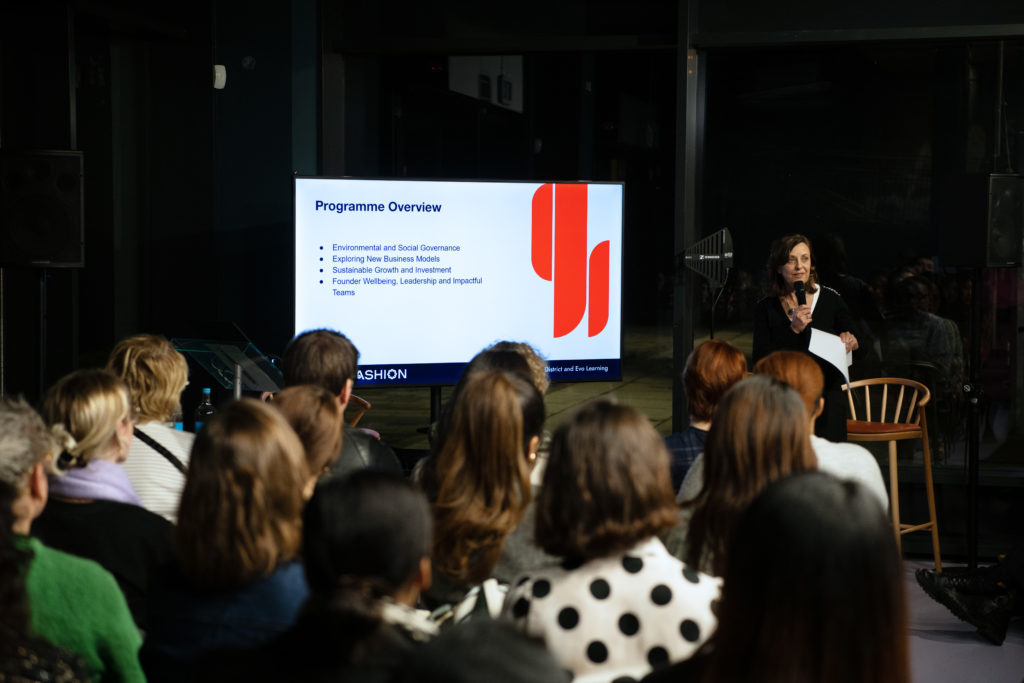
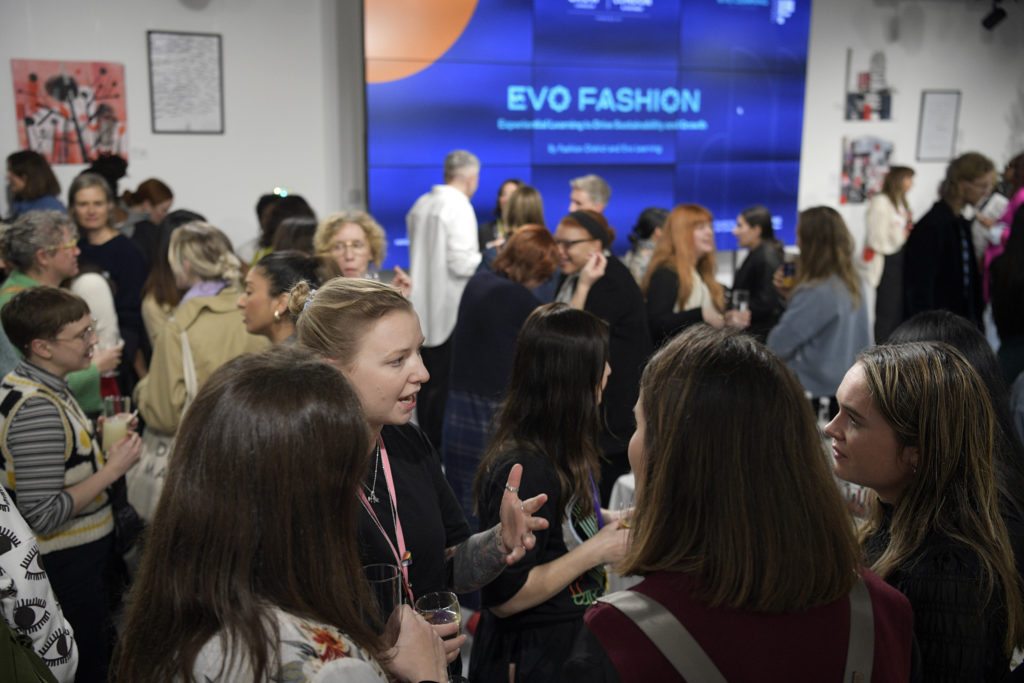
Image credit: Christian Sinibaldi
Evo Fashion in Action
Kicking off the event, Safia Minney, Founder of Fashion Declares, took to the stage with Debbie Luffman, Director of Think Circular, and Ngoni Chikwenengere, Founder of We Are KIN, for the ‘Evo Fashion in Action’ conversation.
Giving context to the need for sustainable innovations, Safia spoke about fashion’s impact on climate ecosystems. ‘We all know that overconsumption is driving a desperate situation. Currently, five percent of greenhouse gas emissions are said to be produced by the fashion and textile industry. That’s set to increase to twenty-five percent by 2050. We can’t let that happen. Fashion needs to move now.’
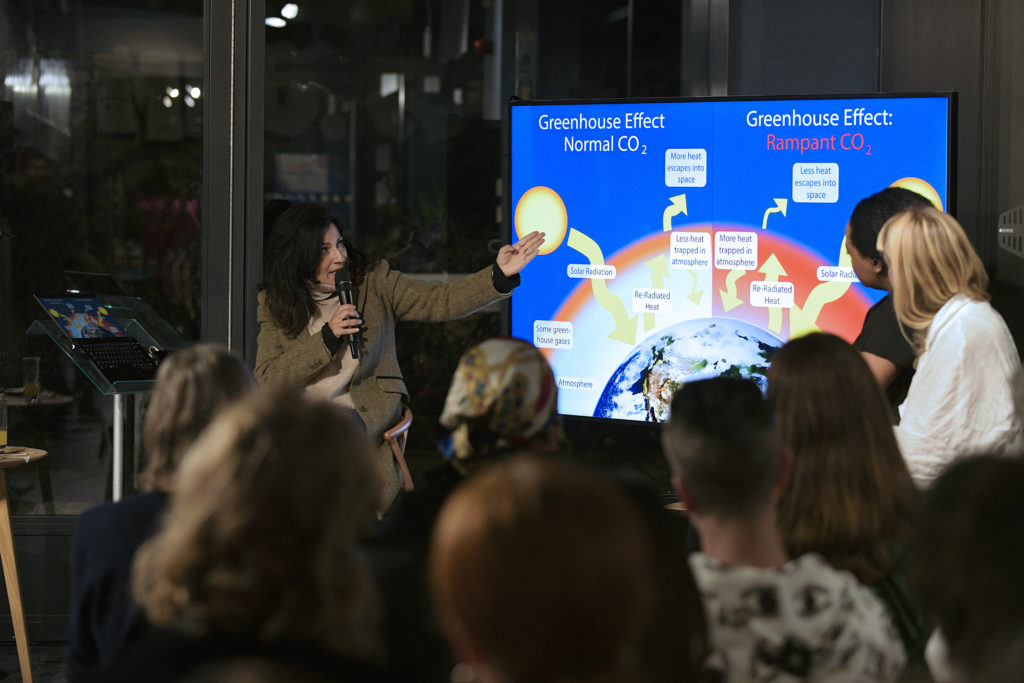
Talking about the ethical and sustainable practices she uses in her clothing brand, We Are KIN, Ngoni Chikwenengere told the audience, ‘One of the first things I wrote down when writing my business plan was my mission statement: ‘people and planet over profit.’ That’s my ethos and it’s what the entire brand is built on.’ Since launching five years ago, Ngoni is still staying true to her brand’s message with all of her clothes being manufactured in East London. ‘I want to know exactly what’s going on so I often drop by the factory because I want to see the conditions people are working in. The people who work there are paid a living wage, they look happy and the environment is clean. In terms of the fabrics, the cotton, linen, and wool are all sourced in the UK. We also use deadstock fabrics.’
When asked for her tips on securing deadstock fabric, Ngoni said, ‘If you don’t ask, you don’t get. It’s important to talk to people and ask lots of questions.’
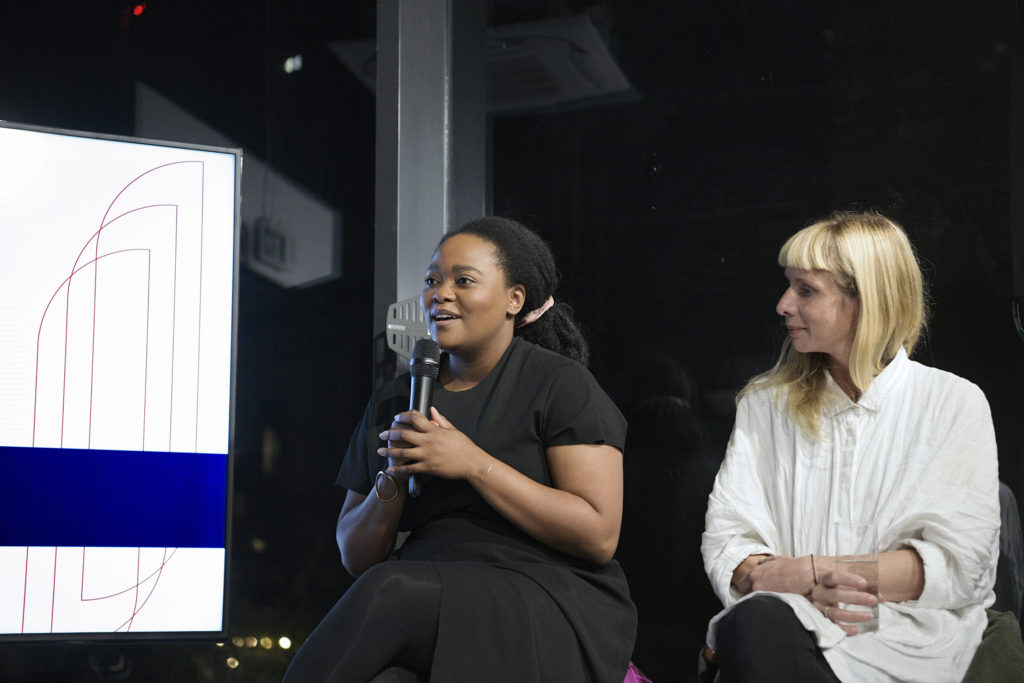
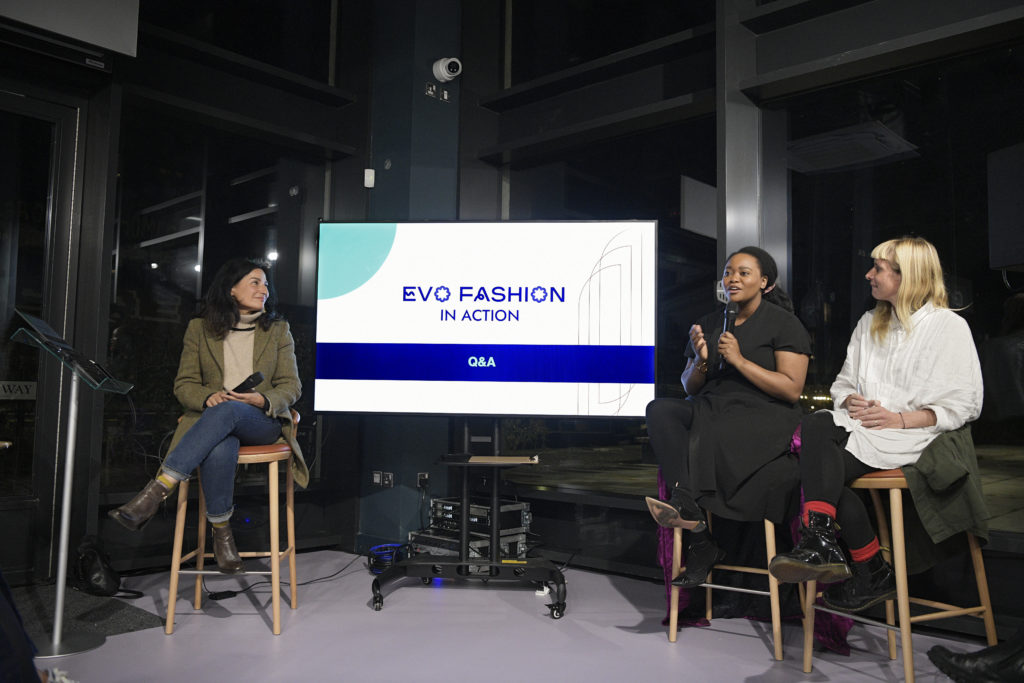
Debbie Luffman, Director of Think Circular, echoed the same sentiment. ‘To become fully sustainable as a brand you have to ask questions and refuse to settle for anything less.’
‘Change in our industry needs to be louder, because the larger organisations are listening – they really are well aware of the issues – but it can be harder for them to change. That’s why I say don’t rush to be a professional outfit too soon. This is your moment to get things right from the beginning stages of your brand and think about embedding sustainability into every aspect of your business, which many big brands are struggling with now.’
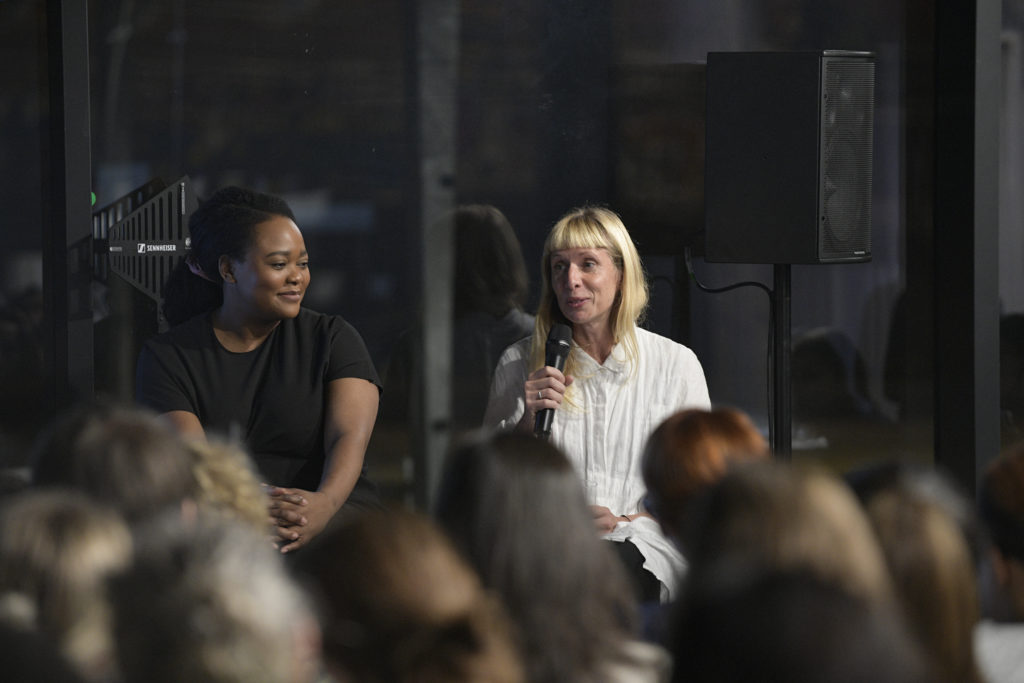
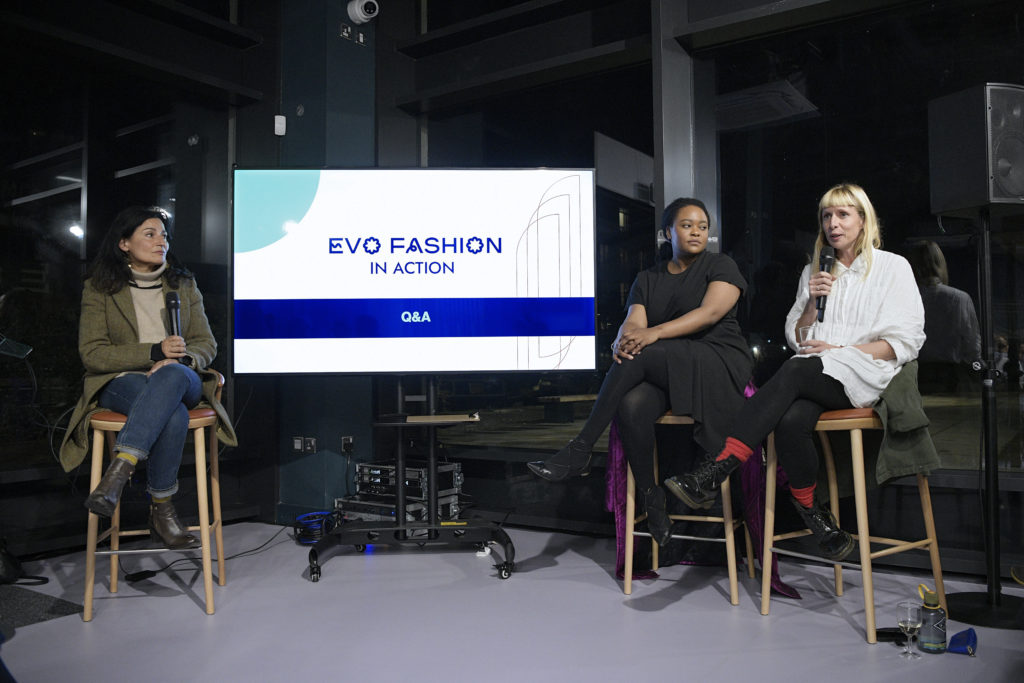
Afterwards the floor opened to questions, with one audience member asking whether consumers were ready for change. ‘Consumers are definitely ready,’ Ngoni said. ‘Shoppers love being at the forefront of innovation. If someone is offering you something new, shiny and sustainable or the same old thing, we all know we would choose the first option. Last November, I sold 800 units in one month, all made to order. The demand is there.’
Debbie said, ‘I think you have to think about the way you make your customer feel. I’m not sure if they care about fabric if I’m really honest with you, but how does it make them feel? Your job is storytelling. Tell the story. Where did it come from? What’s the provenance? What’s it going to do for them? That’s the narrative.’
Another audience member asked whether the panel thought there was competition between small sustainable fashion brands which creates contradiction when setting out to build a better planet. ‘If you share the same value models then you shouldn’t be in competition,’ Debbie answered. ‘In my opinion, IP doesn’t make sense anymore. We should have open source material that’s shared and serves each other. Different brand identities is the creative difference. I think we need to unpack the word ‘sustainable’ and have that open source collaborative mentality to break down those boundaries. You need to build opportunities where you both win.’
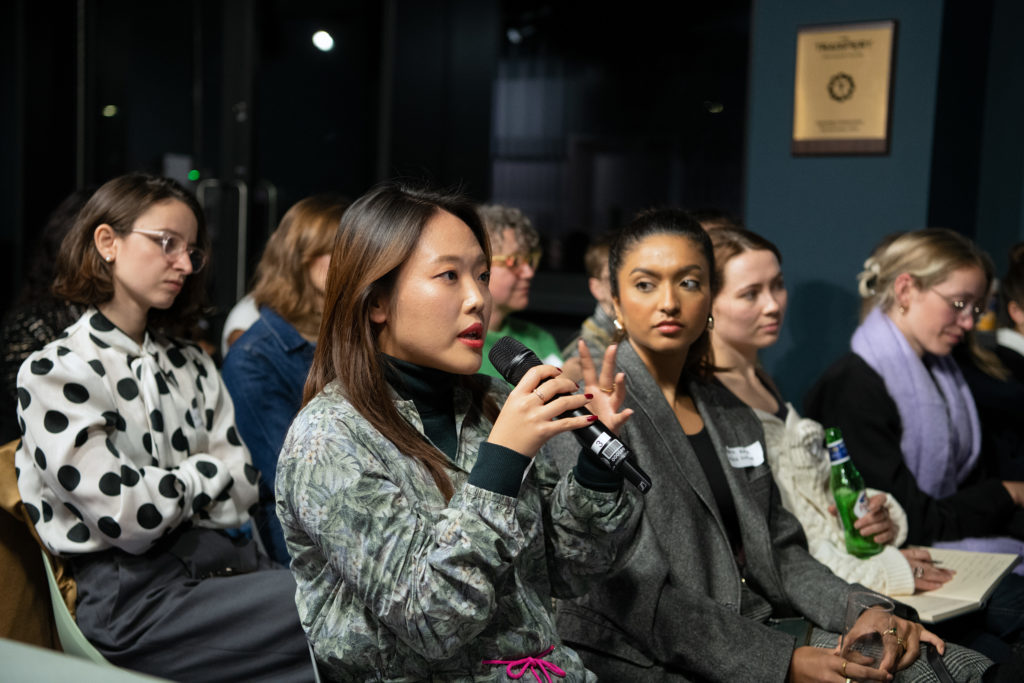
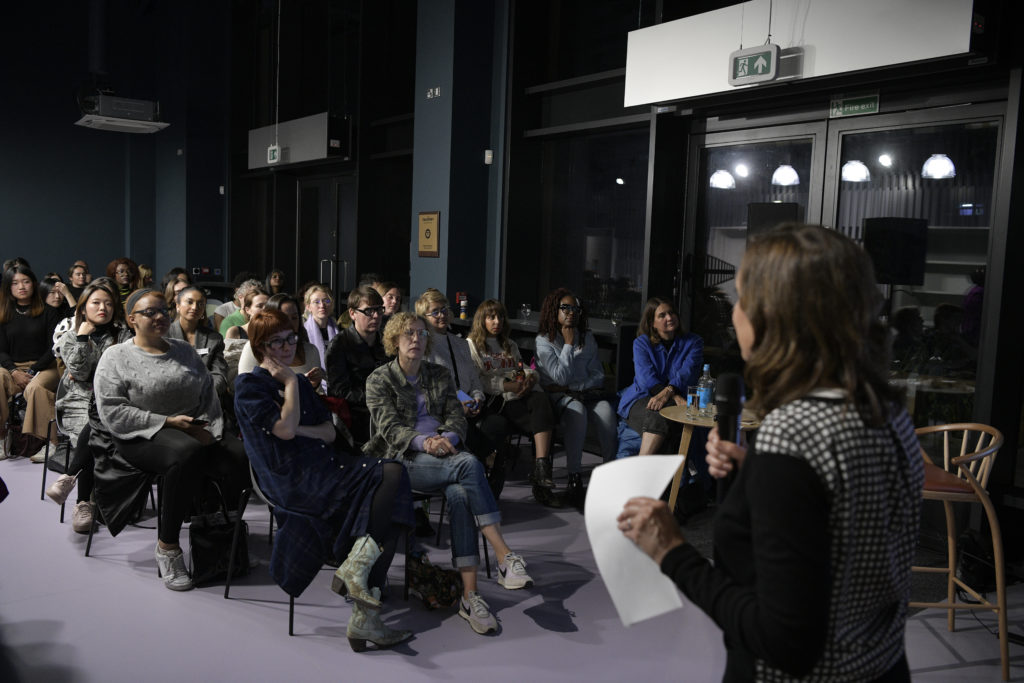
Introduction to Evo Fashion
Next up, Helen Lax took to the stage to present a comprehensive overview of the Evo Fashion programme. ‘There will be two programmes running throughout the year,’ explained Helen, ‘the first for fashion designers and the second for fashion technology businesses. Both are tailored to support innovation across the different subsectors of fashion.’
Designed to fit in with work commitments and delivered by experts, the programme will consist of a two-day intensive launchpad and four full-day masterclasses which will focus on different aspects of learning, including environmental and social governance, exploring new business models, production and innovation, sustainable growth and investment, finance and business planning, and founder wellbeing, leadership and impactful teams. Peppered in amongst the sessions and masterclasses, there will also be panels and talks, a 1-2-1 business diagnostic, three peer-to-peer learning workshops, a creative photoshoot, and the chance to present your brand at Fashion District’s Manufacturing Futures 2024 Industry Showcase to a room full of investors, brands, startups and innovators.
‘In terms of eligibility, you must be a registered business based in London. You must employ 2-5 people and you must have been trading for 18 months,’ said Helen. ‘We have to be able to tell from the application that you want to grow. By this I mean, growing to the scale that you want to grow to in the way that you want to grow. We want to see that you’ve got the ambition to make your business work and succeed sustainably and financially.’
With an incredible selection panel for the first cohort, including Vanessa Podmore, Founder of Podmore Consulting; Yvie Hutton, Director of Design Relations and Membership at the British Fashion Council; Charles Armstrong, CEO of The Trampery, and Helen Lax, Director of Fashion District, applications opened last Wednesday and will close at midnight on 18th January 2024.
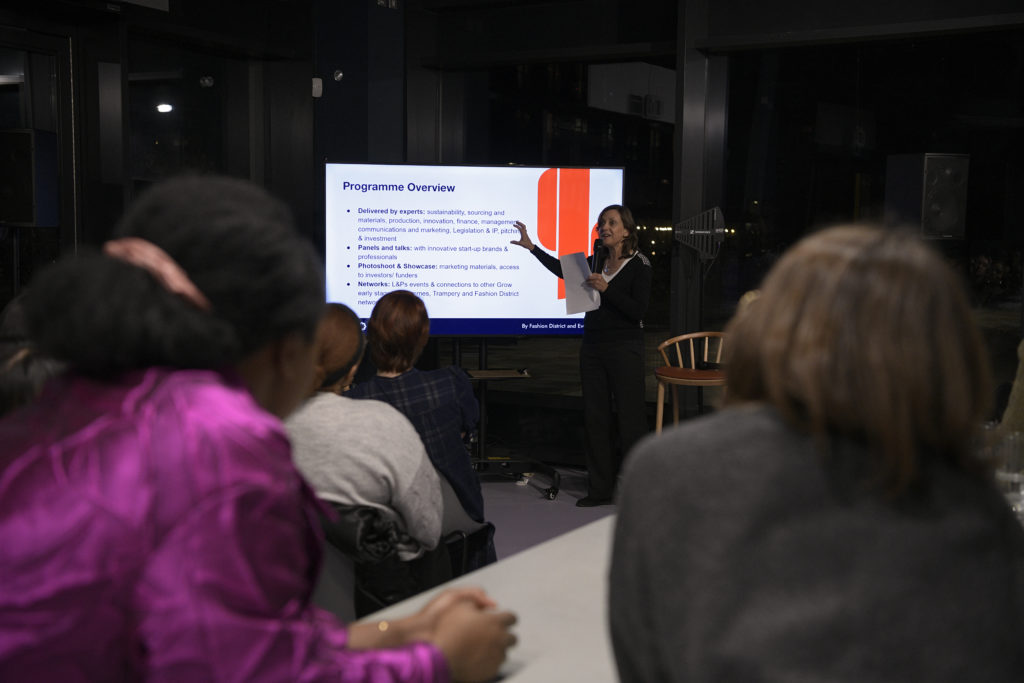
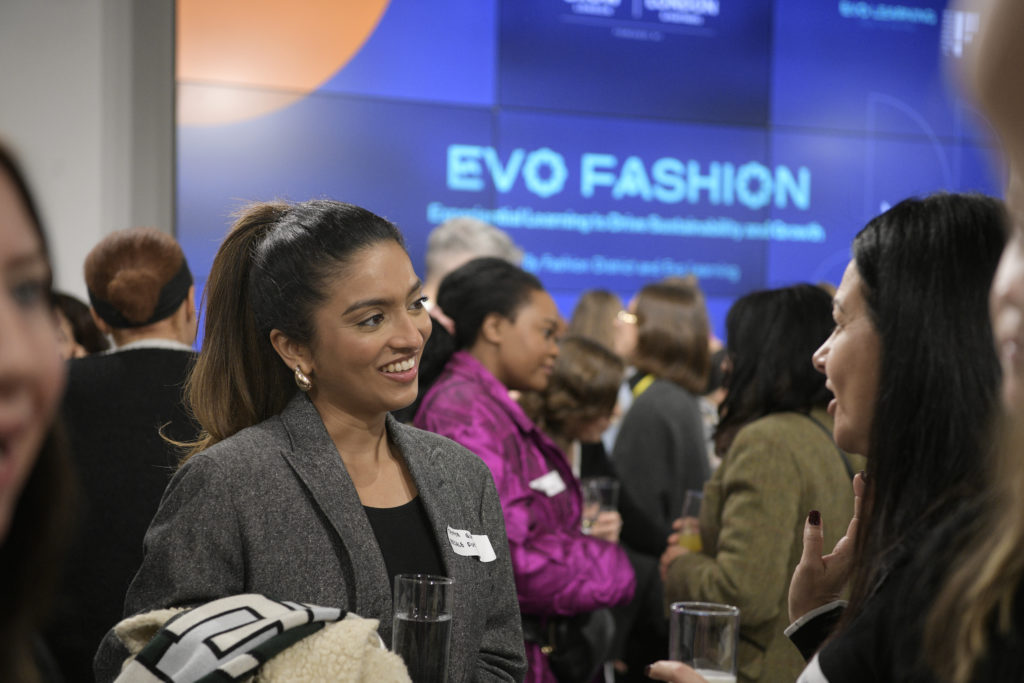
Closing the event, Deborah Latouche, founder of luxury modest wear brand SABIRAH, joined Helen on stage to discuss her experience of our previous sustainable accelerator programme. ‘Despite being held during the pandemic, the programme was really great,’ said Deborah. ‘It solidified for me a lot of the things I was already thinking about. I had always questioned the wholesale model, and so after doing the course I knew it was right for my brand to continue being demi-couture – made to order, made to measure. The fabrics are also all predominately end of life too.’
Speaking about her experience with Vanessa Podmore, who will be one of the Evo Fashion mentors next year, Deborah said, ‘My 1-2-1 masterclass with Vanessa was mind-blowing. She has a world of knowledge and I definitely think the course is well worth applying for.’
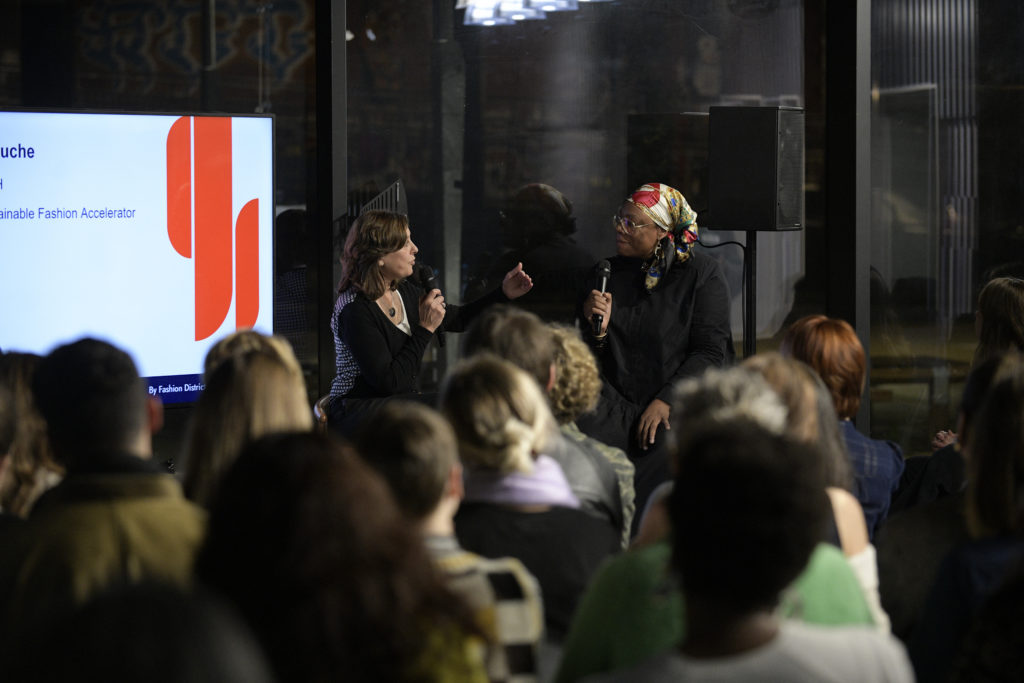
Are you ready to take your business to the next level? Applications for Evo Fashion are now open!
Follow us on Instagram, LinkedIn, Facebook and Twitter to keep up with future events and announcements!
- Instagram: @fd_ldn
- LinkedIn: Fashion District – London
- Facebook: Fashion District London
- Twitter: @fd_ldn
All images by Christian Sinibaldi
Fashion District Festival: Live Showcase – Watch Now!
The Fashion District Festival kicked off in true style with an extraordinary showcase that illuminated East London’s emerging creative talent. Elevating the traditional catwalk experience with physical and digital runways, the showcase also featured interviews with participating designers and creators about the future of the fashion industry. Scroll down to watch the full live broadcast below.
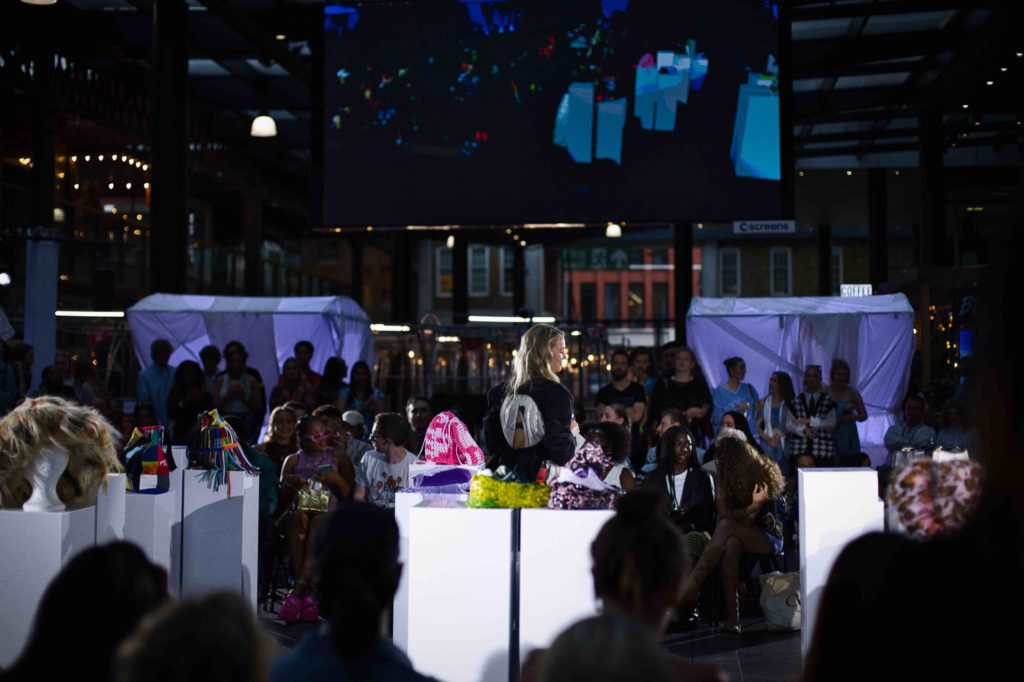
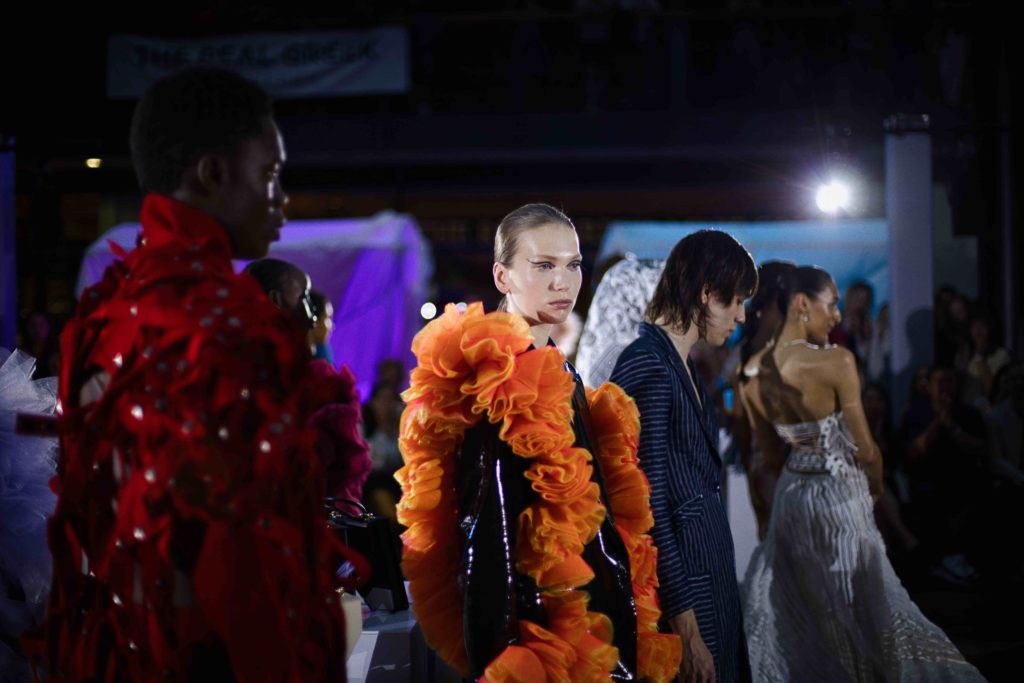
@papi_oyp
Hosted by the fabulous Gemma Care, styled by George Oxby and Angus Cockram from AGRO Studio, and featuring Tanya Tan from Flair Fashion and Joy Craig from Alterist (who were featured in our Festival Pop-Up Shop), the iconic Spitalfields Market set the stage for an unforgettable display of artistry.
Curated by AGRO Studio and Lee Lapthorne from ON/OFF, the show featured London’s most promising emerging designers, showcasing their upcycled, recycled, and sustainable creations.
Lee Lapthorne said, “The ambition of the show is to really support East London talent. We’ve done that by creating a showcase that brings together the true creativity of East London… with a vision of upcycling, recycling, and sustainability. That’s what the industry is driving towards – supporting the planet and the talent that’s here.”
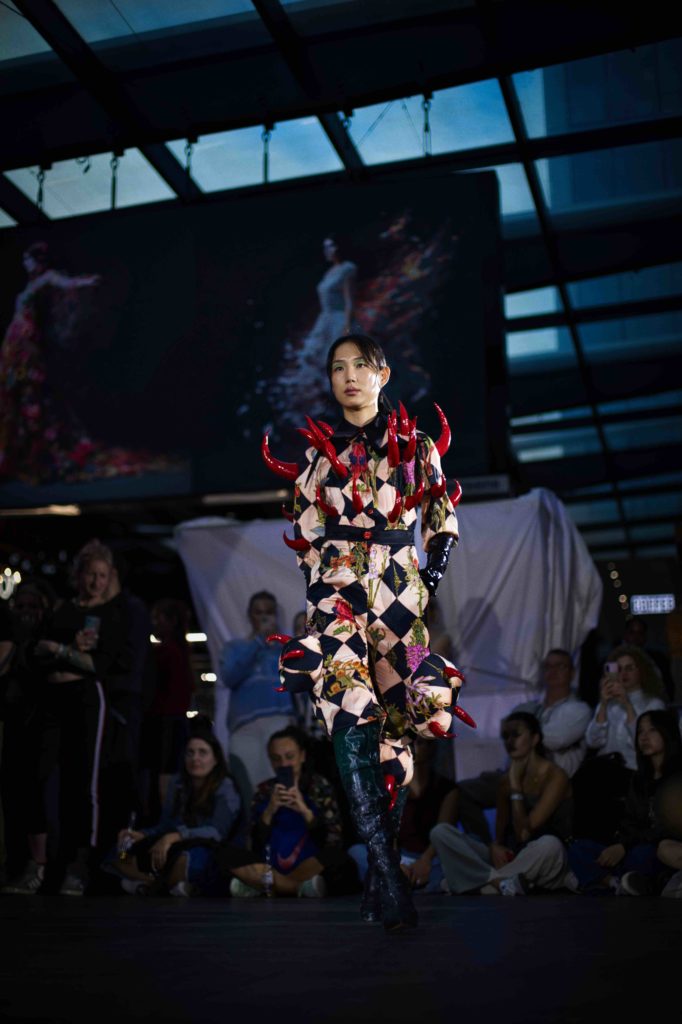
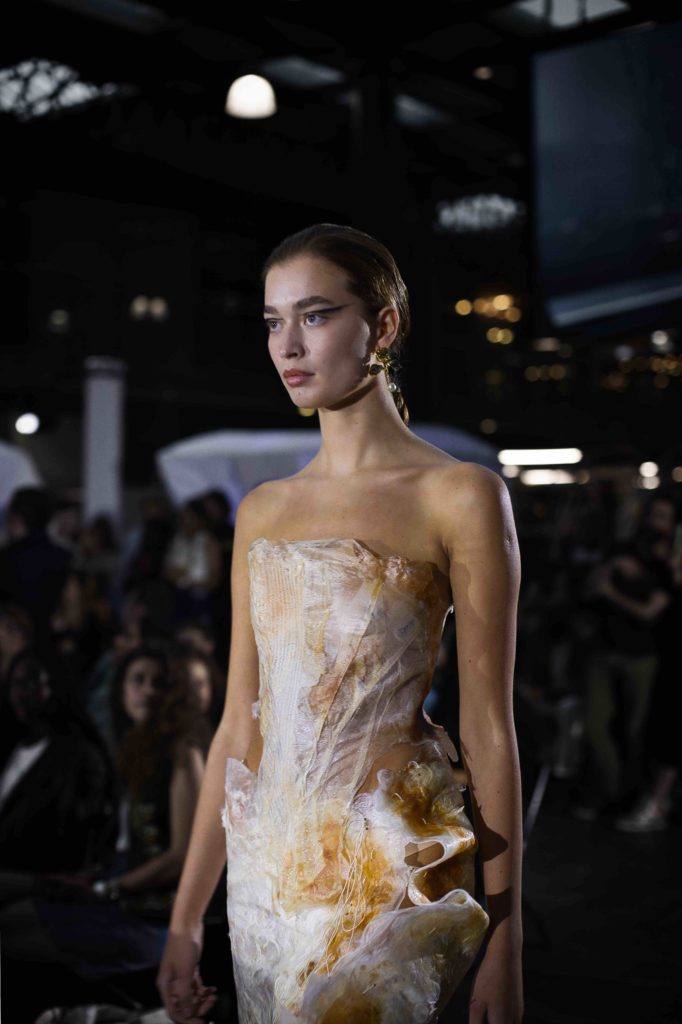
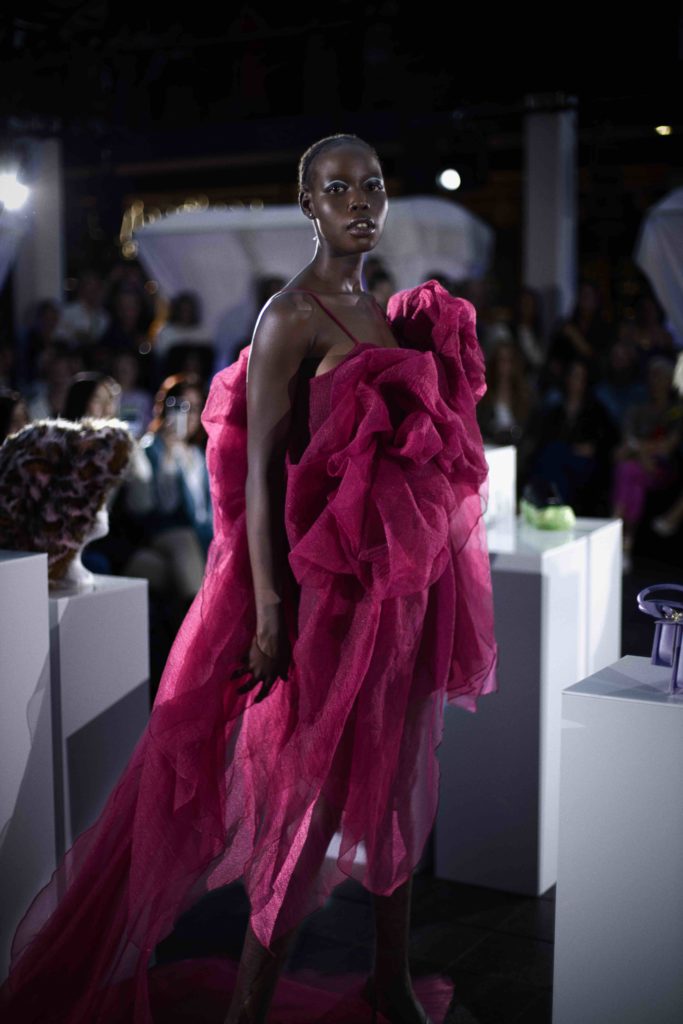
@papi_oyp
Not stopping there, the event also celebrated visionary designers from the rapidly developing digital fashion space. Filmmaker Oscar Keene curated a digital runway, presenting stunning garments from emerging digital designers.
Janey Park, the brilliant brand strategist and content creator, shared her insight into the future of fashion, emphasising collaboration, co-creation, and community. “It’s just fashion at the end of the day. It’s going to be the norm,” Janey remarked, envisioning a seamless blend of digital and physical fashion.
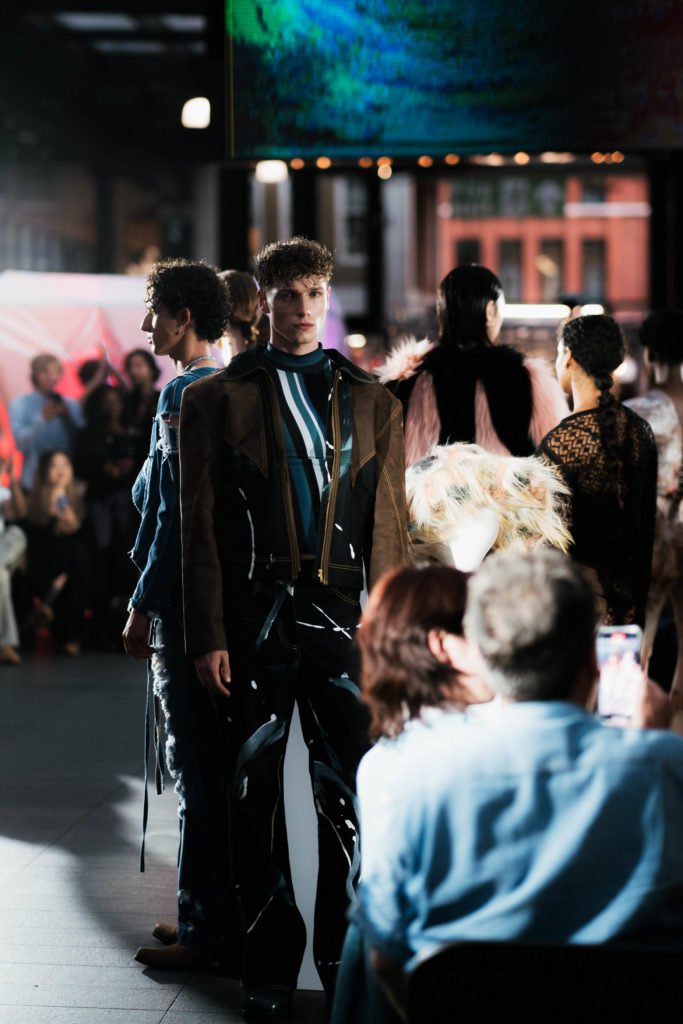
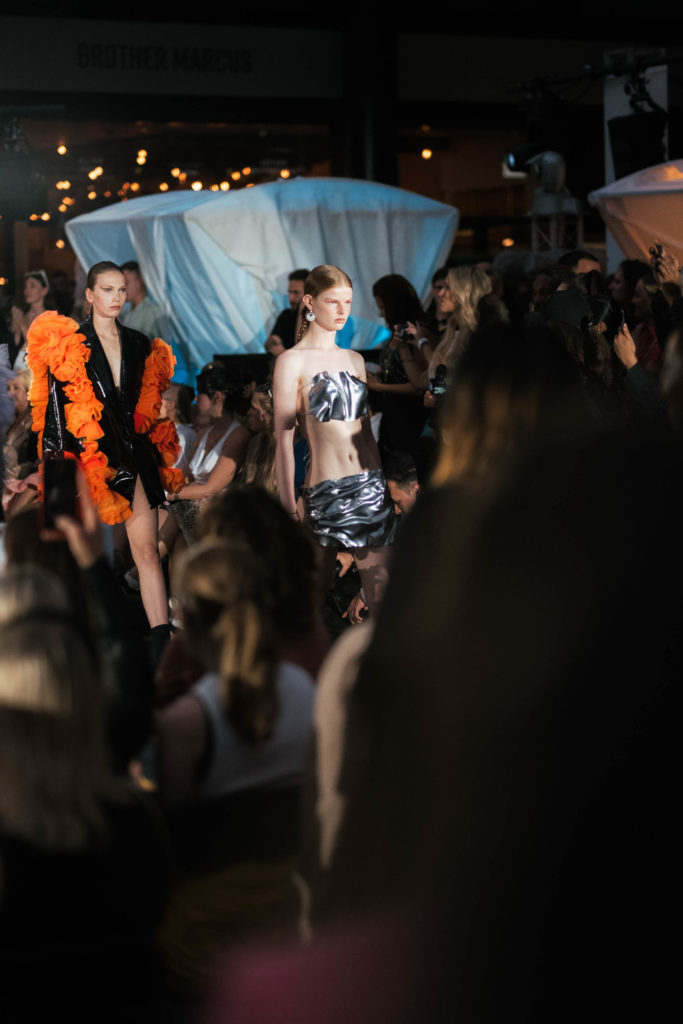
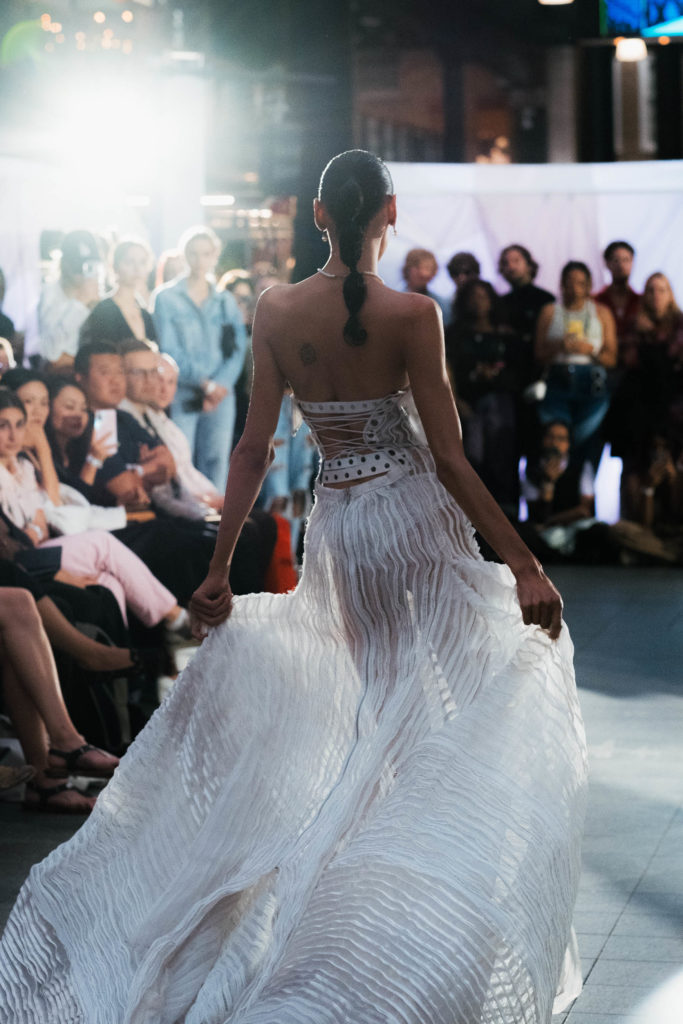
Matt Flynn
The showcase featured interviews with the designers and creators, all united in their mission to revolutionise the future of fashion. Passionate about combining community, processes, techniques, and technology, their dedication to helping create a better industry and world was truly inspiring.
Hannah from Alterist said, “We hope to be a home for all emerging designers within the upcycling space. We want to continue our mission to reduce textile waste and build a positive impact on the planet.”
George Oxby and Angus Cockram from AGRO Studio shed light on the joy and challenges of repurposing materials. “It’s definitely a fun challenge because our job is multifaceted,” Angus added, illustrating their creative process.
Watch the full showcase video here:
Credits to the brilliant minds behind the showcase:
Art direction: Lee Lapthorne, ON/OFF; Styling: AGRO Studio – George Oxby and Angus Cockram; Casting: Sarah Whisker; Production: Congo Blue; Digital Film: Oscar Keene; DJ Set: Jono Jury; Hair by Mark Woolley, Electric Hair, and L’Oreal Professionnel ID Artists; Make-up by Mus Emin.
Designers:
Clementine Baldo, Joshua James Small, Maximilian Raynor, Gyouree Kim, AGRO Studio, Master Bunny, Raquel De Carvalho, Anciela, Buerlangma, Ewelina Szymanska, Florentina Leitner, Kata Haratym, Brian De Carvalho, Maison Lumiere, Paloma Suarez, Cameron Hancock, BELLADONIS, Oscar Keene.
Digital garments:
Oscar Keene, Stephy Fung, Institute of Digital Fashion, Diane Wallinger, House of Autonomy, Roksanda.
Digital Videos / Stills:
Institute of Digital Fashion, The Fabricant, Syky, Stephy Fung, House of Autonomy, Diane Wallinger, Pearl, Sam J, Jacqueline Jade, Morchen, Kapers, Leanne Roksanda, Selene, Miss Mojo, Chrryt, Laura Troncota, Magdalena Mitusinska.
A huge thank you to Feral Film and Broadcast, UAL: London College of Fashion, and our core partners C-Screens and Spitalfields for making this amazing event a reality.
Fashion District Festival Returns for 2023!
The Fashion District Festival is making a highly anticipated return for its second iteration at Spitalfields from 11-16 July 2023.
Taking over the vibrant east London destination, the six-day festival will be a celebration of fashion, sustainability, innovation, and community. Featuring over 40 events, including pop-ups, swap shops, styling masterclasses, upcycling workshops, and interactive experiences, visitors will have the chance to explore, learn, create, and network with leading conscious brands and digital fashion businesses.
This year’s festival covers four themes — WATCH, SHOP, MAKE, and GROW.
The Fashion District Festival will kick off on Tuesday 11 July. As part of the WATCH programme, the launch show, curated by Lee Lapthorne from On|Off and AGRO Studio, will introduce some of London’s most promising emerging designers, combining physical and digital installations, to create a truly unforgettable experience. The week will see further digital showcases and styling events from charity partner Give Your Best.
The SHOP series will feature a collaborative retail pop-up located in a brand-new building at Number 1 Lamb St in Spitalfields – the first event to take place in the contemporary building designed by Foster + Partners. Featuring emerging and planet-positive designers and start-ups, the brands on show specialise in preloved, swapped, rented, and upcycled fashion, such as The Alterist, Loanhood, The Cirkel, Verte London, Circular Threads and The Seam.
SHOP events:
- Rental app Loanhood will host a ‘Get Ready With Us’ event at the pop-up shop, where fashion enthusiasts can try on pieces available for rent or purchase, and curate their weekend wardrobes.
- Clothes swapping company Verte will organise two swap shops for children and adults to refresh their wardrobe.
- Specialist wardrobe care and repair service The Seam will host an open house, where visitors can witness the art of garment restoration and submit items for repair or alteration.
- South Asian preloved and rental fashion platform, Circular Threads, will host a day-long event with the chance to try-on outfits for the wedding season and join in upcycling workshops.
The MAKE space offers a diverse program of interactive events and workshops for all ages, encouraging participants to explore sustainability and innovation in fashion via the three Rs: Repair, Reuse, and Recycle.
MAKE talks and workshops:
- Slow-fashion designer Lydia Bolton will offer visitors the chance to learn hand embroidery techniques to breathe new life into old garments.
- Upcycled fashion marketplace The Alterist will host workshops by talented designers from their community.
- Making for Change will host engaging workshops for families and children, which will keep the little eco-warriors busy for an entire afternoon.
- Slow fashion brand Revival London will share ways to re-work preloved denim into unique and stylish pieces
The GROW programme is dedicated to supporting fashion start-ups and SMEs through a series of roundtables, talks, and workshops that delve into the ideas and innovations driving change within the industry, including themes such as the circular economy, regenerative materials, digital fashion, design for the metaverse, early-stage investment and more.
GROW talks and workshops:
- The week will hear from an exciting line-up of speakers including: Fashion (Minority) Report, Innovate UK, UKFT, ReLondon, Fashion Innovation Agency, The Trampery, True., and The WIP.
- Captivate Communications will be running pitching workshops, offering valuable insights and guidance for aspiring fashion entrepreneurs looking to secure funding.
- In collaboration with True Global, the festival will host an investment event featuring a panel discussion with angel investors, VCs, and established brands. The interactive session will provide start-ups with an overview of what investors and brands seek and offer valuable tips for success.
- Fashion Innovation Agency will host a fash-tech meet-up, discussing AI and the most promising and innovative applications in the fashion industry.
- Social enterprise The Trampery will come together with Fashion District to host Fashion Circle, a dynamic event on preloved fashion including a brunch, two panel events with pioneering industry figures, and a speed networking session.
Jason Dervin, General Estate Manager at The Spitalfields Estate, says, “We are proud to host the ever-inspiring Fashion District Festival and donate four spaces for the events in our newly created units and basement studio space. Celebrating and supporting multiple sustainable start-ups, emerging talent and brands in this dynamic way sits perfectly alongside our existing retail and F&B operators, and we hope to see everyone at the Festival in Spitalfields this July.”Bookings are now open! Don’t miss your chance to secure a spot at each of the incredible events – click here to see the lineup so far. Stay tuned for more event announcements and exciting speakers coming soon!
Bookings are now open! Don’t miss your chance to secure a spot at each of the incredible events – click the button below to see the lineup so far.
Follow our socials to stay tuned for more event announcements and exciting speakers coming soon!
- Instagram: @fd_ldn
- Facebook: Fashion District London
- LinkedIn: Fashion District – London
- Twitter: @fd_ldn
Fashion District Shortlisted for Small Business Charter Excellence Awards
We’re excited to announce that Fashion District has been nominated for not one, but two Small Business Charter Excellence Awards!
We’re thrilled to have been shortlisted for both ‘Outstanding Support for Small Business’ for our Fashion District Festival and ‘Outstanding Stakeholder Engagement’ for our Covid Recovery of SMEs initiative.
The Small Business Charter Excellence Awards recognise the most innovative and impactful initiatives that have supported small business growth during 2021/2022. We’re proud to have been recognised for our efforts to nurture start-ups and enhance SME growth through dedicated, collaborative, and impactful activities.
The Fashion District Festival, a week-long event celebrating London’s vibrant and innovative fashion industry, provided a fantastic platform for small businesses to connect, exchange knowledge, and collaborate. The festival, which took place in September 2021, featured a range of activities, including workshops, talks, and live pitching, as well as networking opportunities for entrepreneurs and professionals in the fashion industry. The festival also showcased the incredible sustainable talent and creativity that London has to offer, and helped to raise the profile of many businesses in the Fashion District community.
Our Covid Recovery of SMEs initiative at The Lab E20 was another key focus for us, as we recognised the significant challenges faced by small businesses after the pandemic. We worked closely with 253 businesses and organisations to offer opportunities for income generation, brand exposure, innovation support, and routes to investment. Additionally, our initiative enlivened the expansive Stratford-based space with extensive community activity, creating a hub for collaboration and connection.
The winners for each of the three categories in the Small Business Charter Excellence Awards will be decided by a panel of judges, comprising business school leaders, SME business leaders, and other SME experts. The results will be announced at the Small Business Charter Summer Reception on 22 June at the House of Lords.
We extend our heartfelt gratitude to the Small Business Charter for nominating us for these prestigious awards, as well as to our valued community and partners who have continuously supported us. As a business hub dedicated to supporting the growth and success of the fashion industry in East London, we’re committed to continuing our work with small businesses and entrepreneurs in the area.
For more information on our initiatives and how we support small businesses, head to our What We Do page or follow our socials to receive the latest updates:
- Instagram: @fd_ldn
- Facebook: Fashion District London
- LinkedIn: Fashion District – London
- Twitter: @fd_ldn
Celebrating Sustainability, Community and Innovation at Poplar Works’ 3rd Birthday
It was inspiring to see so many of you at Poplar Works’ on Thursday 2nd March for our 3rd birthday celebrations!
As part of the festivities, the wonderful community of small businesses showcased their work during open studios and offered events for local residents to participate in. The programme for the day was truly a celebration of all the people that make Poplar Works a thriving hub of sustainability, innovation and social enterprise.
Once disused garages, Poplar Works now offers over 40 affordable studio spaces for start-ups and SMEs and is home to a diverse range of businesses, from sustainable fashion start-ups to not-for-profit organisations. Blossom Young, Head of Operations at Poplar HARCA, guided groups throughout the space and gave them a glimpse into the lives of the business community that reside here, including Birdsong, More Life Home, Post Carbon Lab and more.
Engaging with the local community has been integral to Poplar Works’ success, and there’s no better evidence of this success than the many families and local residents that joined in the celebrations at craft workshops throughout the afternoon. The Reclaimery taught techniques to customise your clothes using fabric paint, community member Asma Begum provided family-friendly crafting sessions in The Works Café, whilst Wax Atelier demonstrated the art of candle dipping.
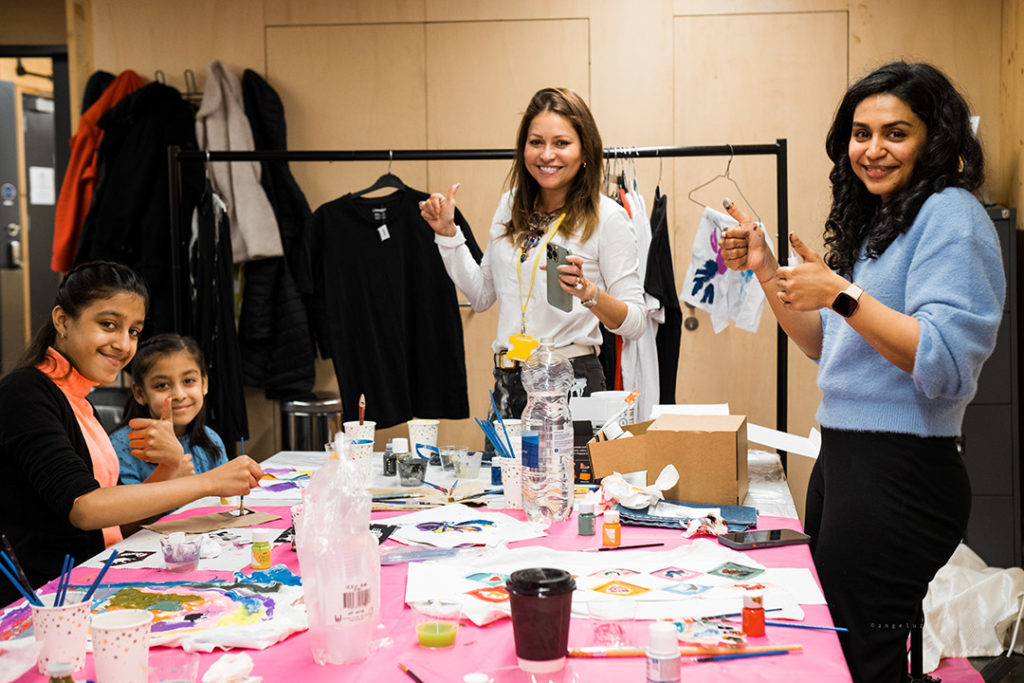
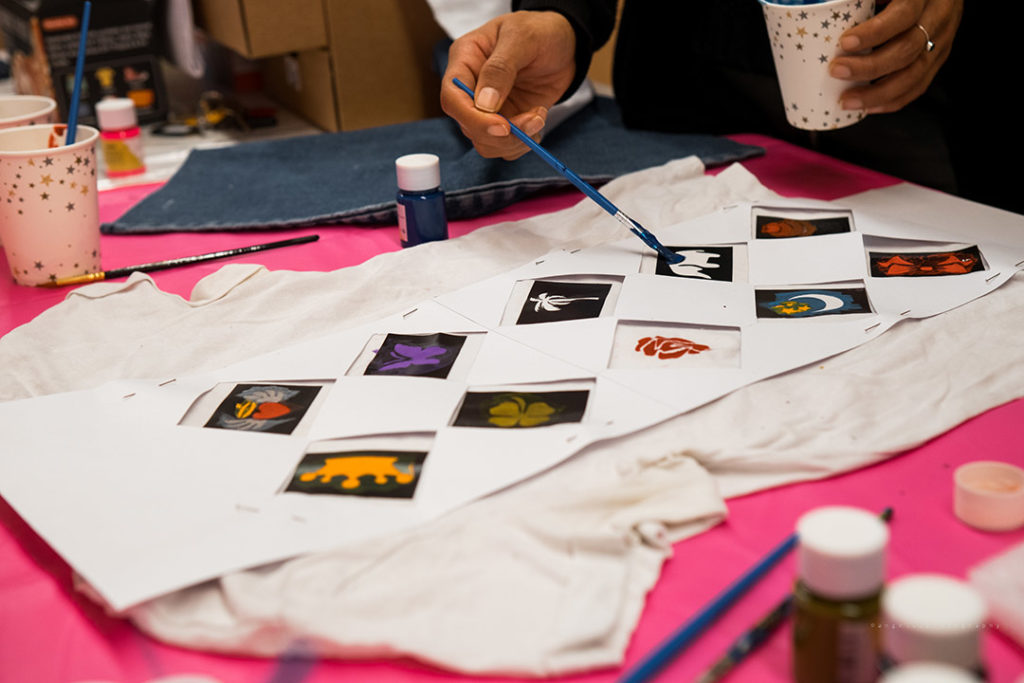
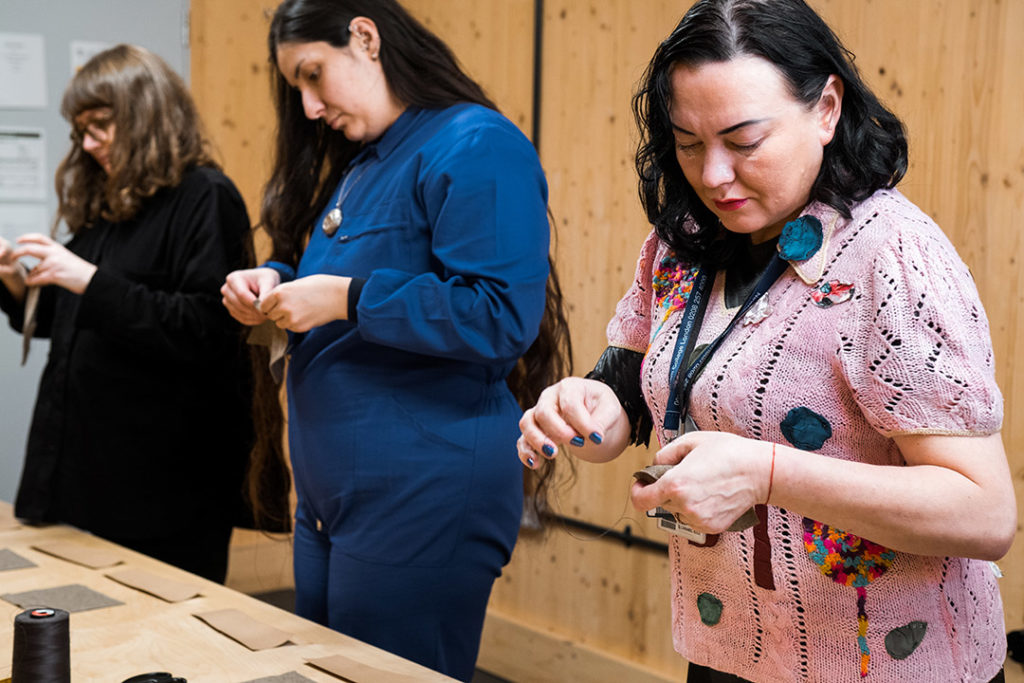
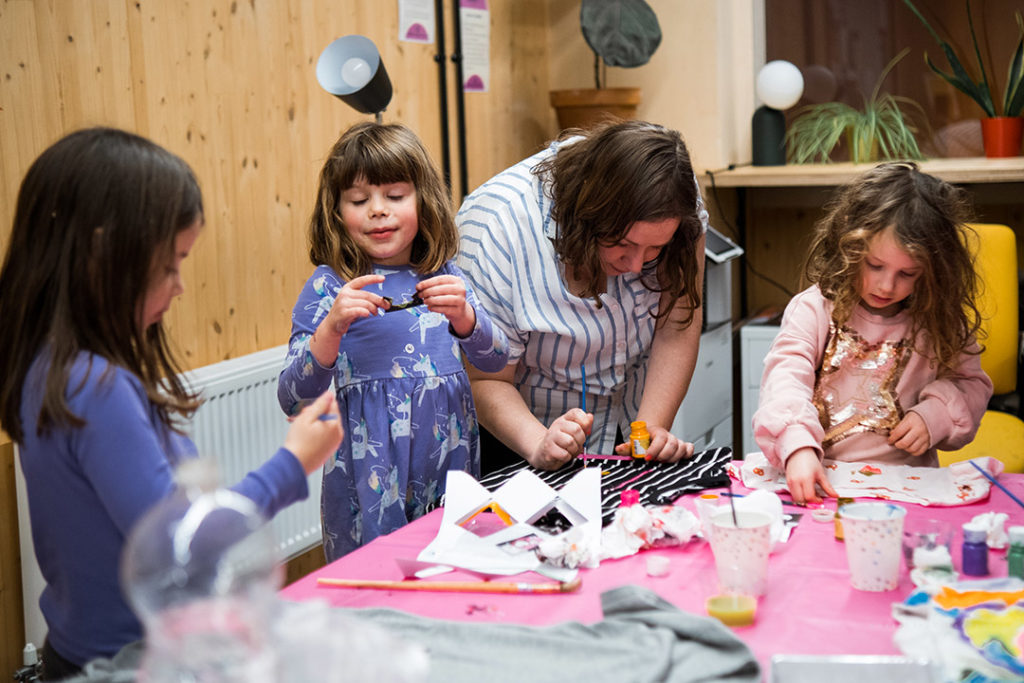
The brilliant Making for Change team opened up their production hub to host a weaving workshop that repurposed textile waste to create one-of-a-kind keychains. Both the workshop and guided tours enabled visitors to see behind the scenes at Making for Change – a social enterprise that offers a production training programme and works with designers, industry, and early-stage businesses to produce orders using sustainable and ethical practices.
We rounded off the day with a gathering in The Works Café for the members and partners that have been part of Poplar Works’ journey over the last three years. Whilst sharing a celebratory drink and getting stuck into nibbles, courtesy of The Works team, we heard from Blossom Young – Head of Operations at Poplar HARCA, Claire Swift – Director of Social Responsibility at London College of Fashion, Rachel Arnold – Creative Director at Renew East London (RenewEL), and Helen Lax – Director at Fashion District.
Each of the speakers acknowledged how incredible it has been to see Poplar Works develop into a nurturing and supportive ecosystem of businesses that places people and planet at the centre of everything that they do. There was a sense of excitement surrounding the future of Poplar Works and its potential to continue forging valuable connections and fostering innovation over the years to come.
Keen to settle into a studio at Poplar Works? You can check availability and apply here.
If you’re interested in future events including studio tours, networking opportunities and community workshops, sign up to our newsletter or follow us at:
- Instagram: @fd_ldn @poplarworks @thetrampery @making.for.change
- Facebook: Fashion District London
- LinkedIn: Fashion District – London
- Twitter: @fd_ldn
Sparking collective action at Becoming Circular: Revaluing Waste
Last week, we hosted our Becoming Circular: Revaluing Waste event in collaboration with London Borough of Waltham Forest’s Green Business Network at the Hackney Brewery in Walthamstow.
Designed to spark collective action and provide attendees with the tools to embed circularity in their businesses, the event focused on three key approaches to eliminating waste textiles: Repair, Resale and Redistribution. Read on to find out what went down at this very special evening.
INTRODUCING TEXTILES 2030
Kicking off the event with a fantastic keynote speech was Sarah Robins, Associate Sector Specialist at WRAP UK – a climate action NGO working around the globe to tackle the causes of the climate crisis arising from the fashion industry.
Since launching in April 2021, Sarah has been working extensively on WRAP’s Textiles 2030 initiative, a UK textile sector collaboration making rapid, science-based progress on circularity and climate action. The initiative focuses on how brands can redesign products, reuse them and recycle them to reduce environmental impact and use resources more efficiently.
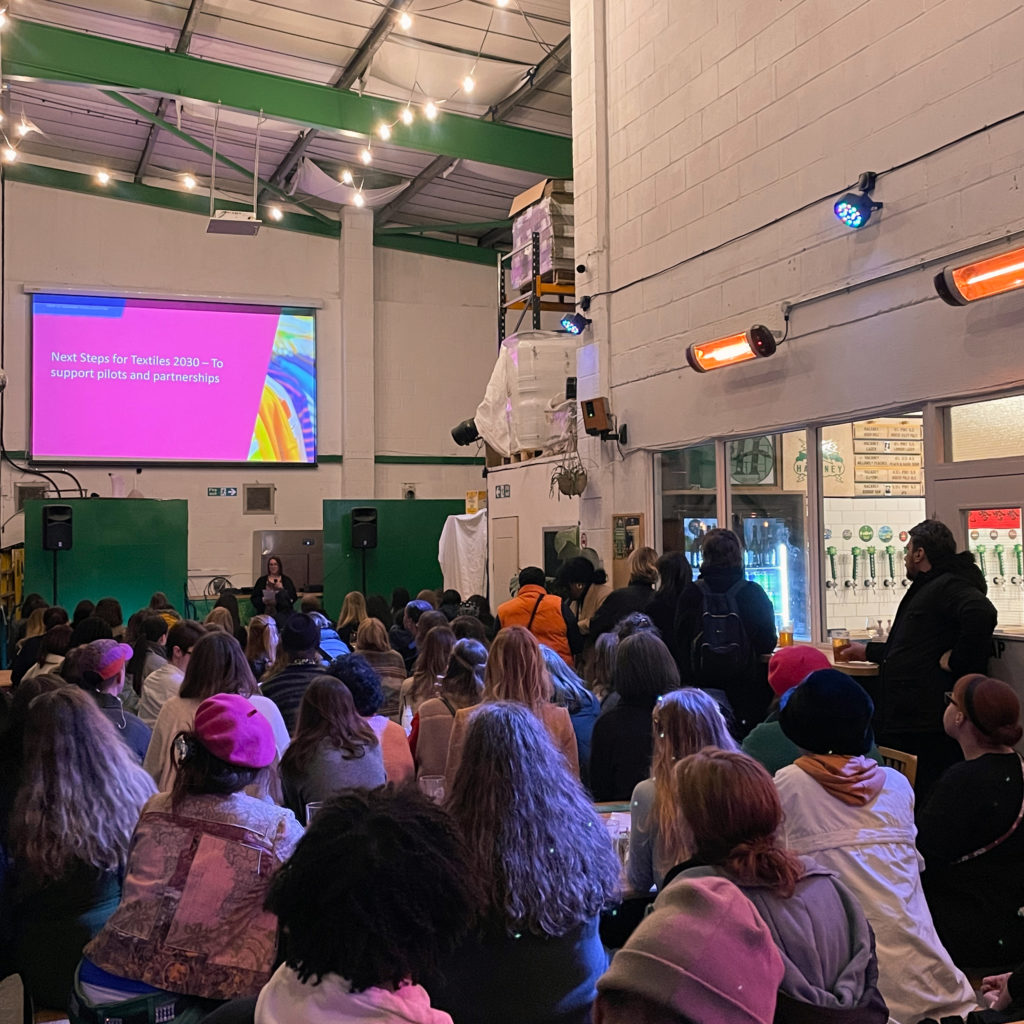
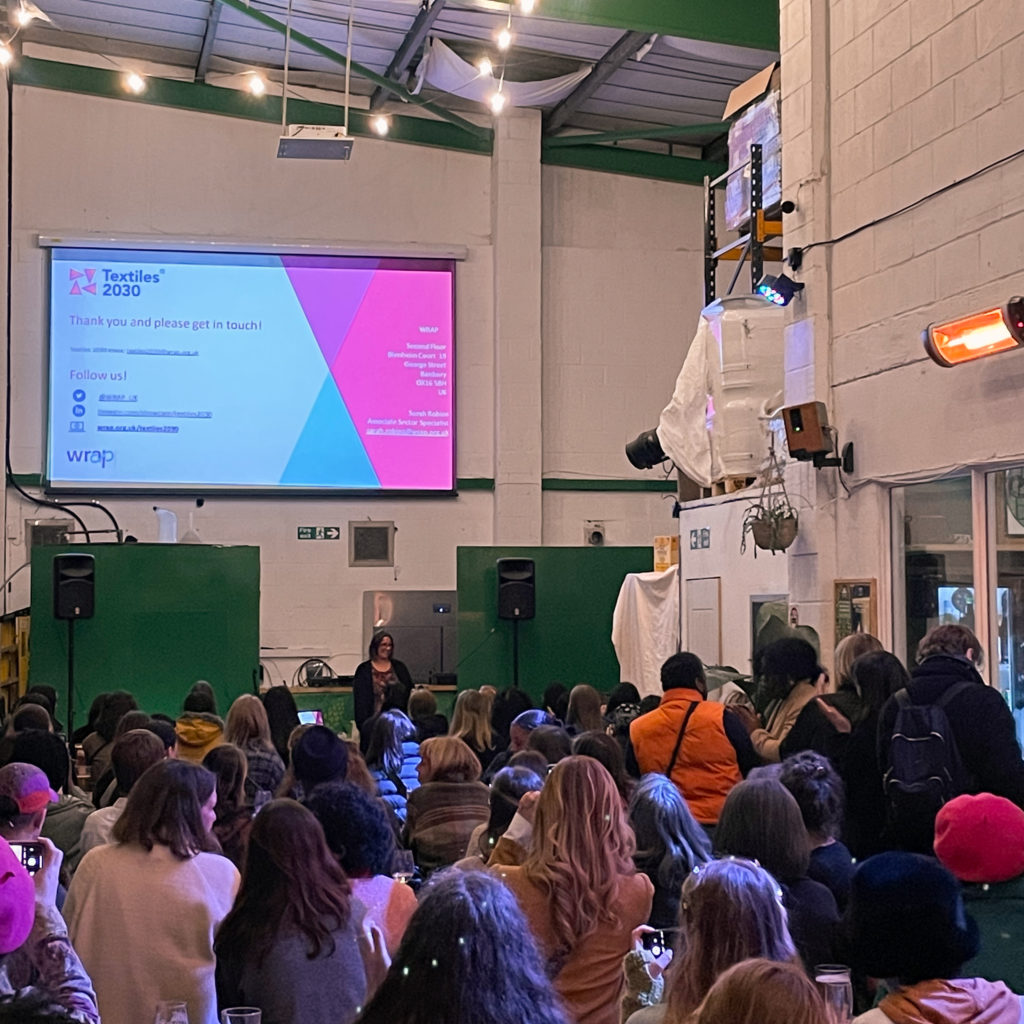
In the past two years, the initiative has received commitment from 120 signatories from across the textiles supply chain, including 62% of the UK’s market share of brands and retailers and the UK’s biggest charities.
For every industry to move towards a circular economy, Sarah broke down three key targets to make it more manageable for businesses:
- Design for Circularity: agree good practice design principles, use of recycled content, and minimising waste to lower the impacts of products placed on the market in the UK.
- Implement Circular Business Models: adopt a variety of resale models, such as peer-to-peer, resale by charities or brands, rental, buy-back/reward and clothing service/subscription.
- Close the Loop on Materials: set up partnerships to supply and use recycled fibres for new products, accelerating the commercialisation of fibre-to-fibre recycling in the UK.
“I want to highlight how critical circular business models are,” Sarah told the audience. “We need to encourage both businesses and citizens to extend the life of the clothing they already own and to use circular business models because we can’t make the changes needed by focusing on one area. It needs to be a holistic, whole lifecycle approach.”
To find out more information about Textiles 2030 and to access WRAP’s reports and guides, please head to their website.
THE SEAM: CULTIVATING CARE CULTURE
Layla Sargent, Founder and CEO, and Bronwyn Seier, Head of Brand at The Seam – a game-changing repair and alterations app – then took to the floor to present a case study of her business and how they operate using a circular business model. Frustrated with the tailoring industry and the lack of messaging around repairs, Layla felt compelled to help make a difference.
“In a nutshell, The Seam’s approach to circularity isn’t about creating new models for manufacturing,” Layla said. “It’s not to create new fabrics, it’s simply to help us as a community care better for the garments we already own. Since the 1970s, textile waste has increased by 800%, and in the UK alone, 30 million items of clothing are sent to landfill every week. The Seam’s main mission is to reduce the number of garments that end up in landfill by helping people to extend the lifecycle of their garments.”
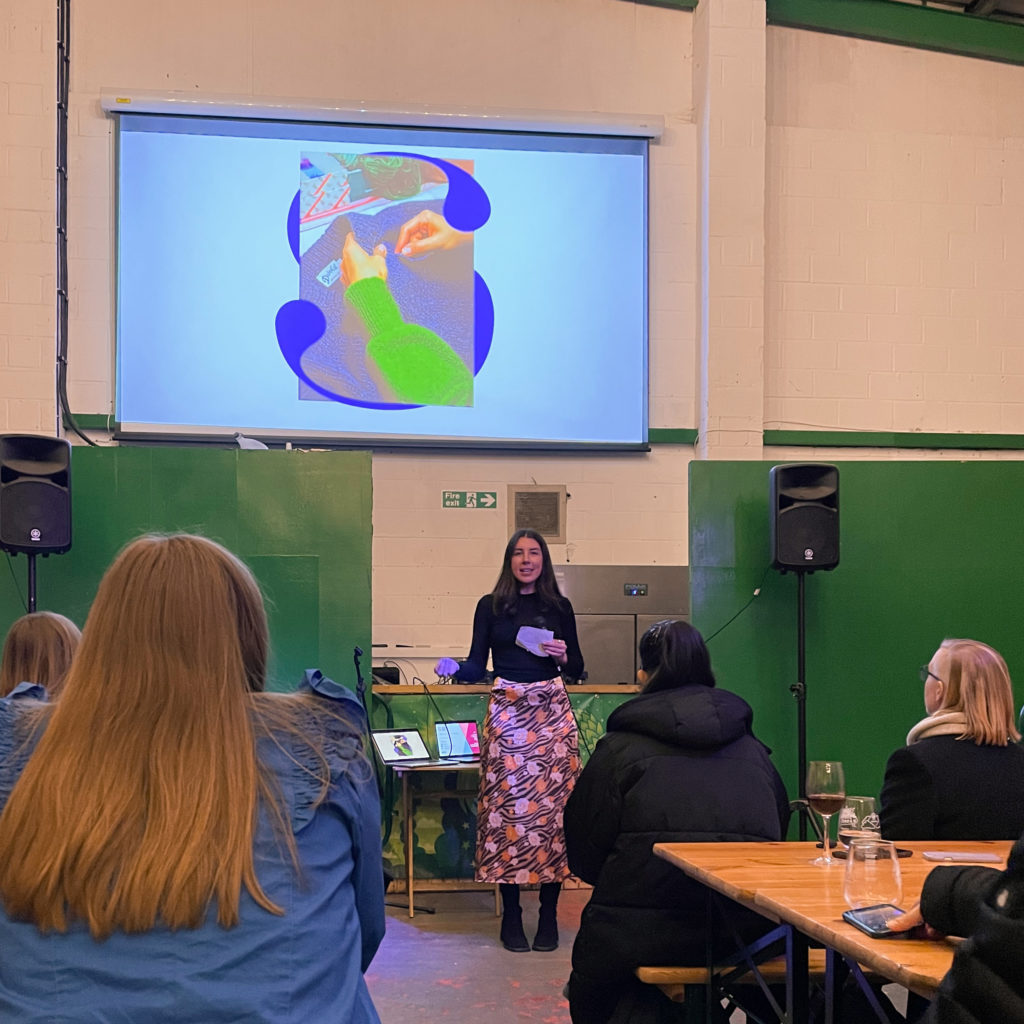
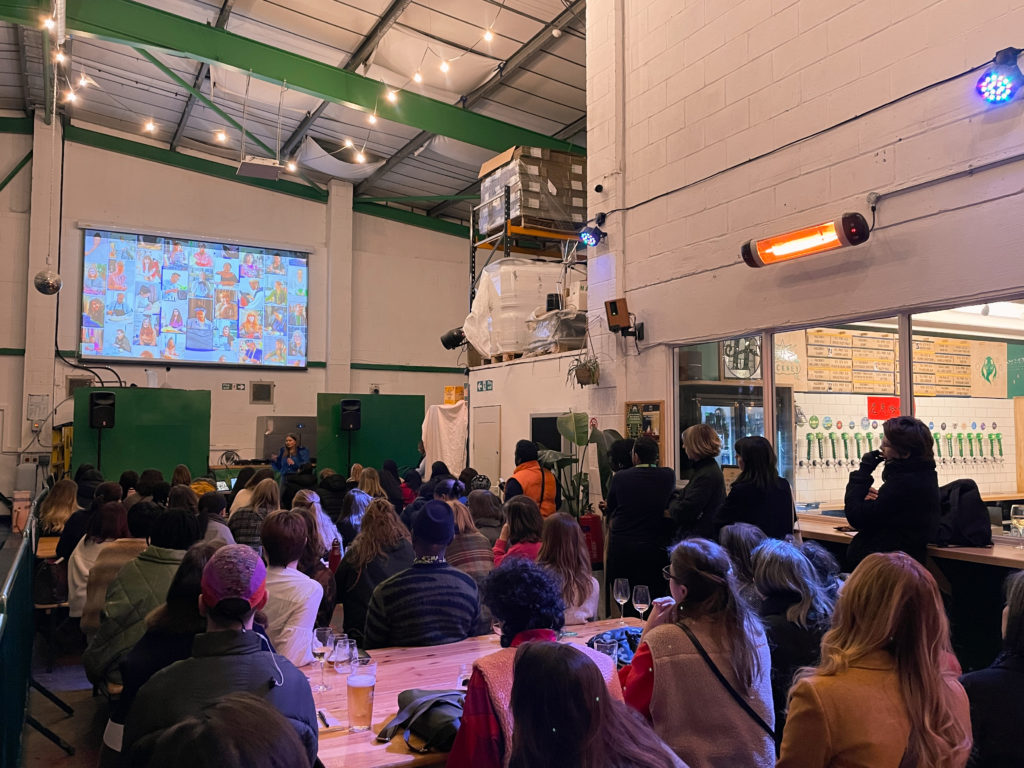
When it comes to circularity, here are The Seam’s key takeaways for the future of their business:
- Messaging is key: we want to promote the idea that caring for garments can be more thrilling than the feeling you get when buying something new.
- Collaboration can create change: one of the ways we’ve promoted our services is to partner with fashion brands, rental services and resellers. This can help drive a shift.
- Don’t ignore the data: all the data we are collecting from bookings can be used to motivate people to adopt these kinds of behaviours faster and motivate brands to incorporate them into their business models.
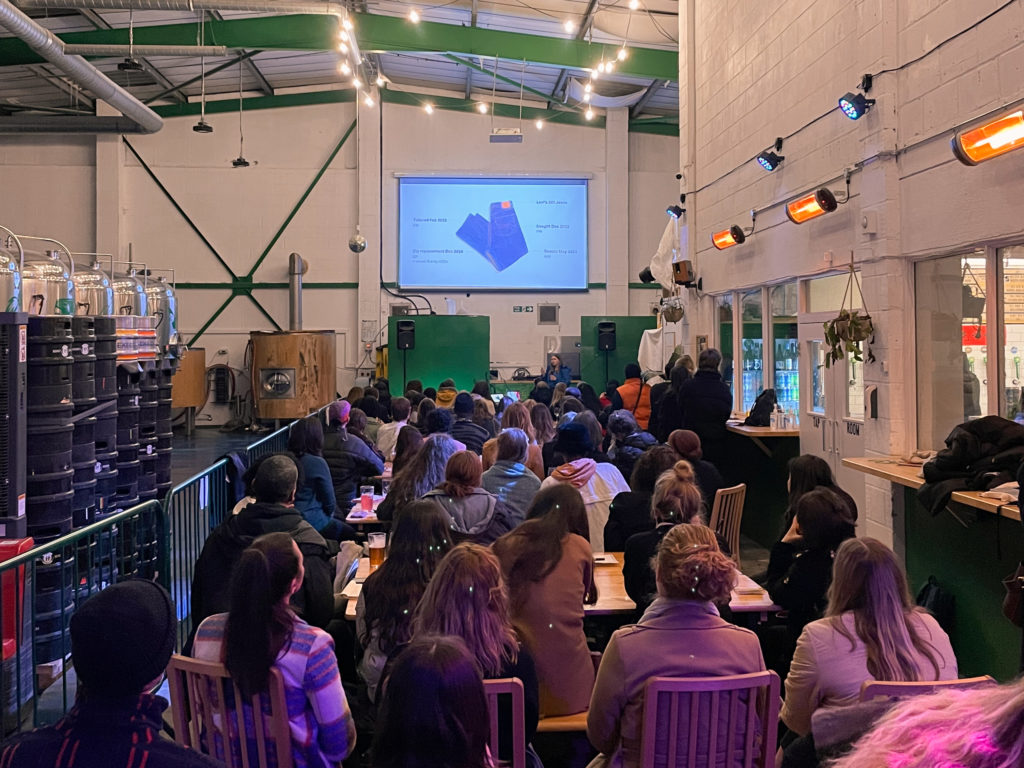
REPAIR, RESALE, REDISTRIBUTION
The remainder of the evening was spent partaking in roundtable discussions chaired by sixteen local business founders and entrepreneurs. The tables were categorised under the themes of repair, resale, or redistribution and attendees had the choice of sitting at the table they felt most drawn to. The group discussions were designed for attendees to brainstorm what actions could be taken by Waltham Forest to encourage businesses to repair and resell garments/products and redistribute textile waste. Afterwards, groups fed back their thoughts to the rest of the room.
REPAIR
The first group, chaired by Layla Sargent, Founder of The Seam, discussed providing pricing guidelines for repair services, as sometimes independent services find it difficult to price. They suggested that having a guideline as a baseline could give confidence to pricing decisions.
The second group, chaired by Tessa Solomons, a reuse and repair consultant, suggested that retailers form a dialogue with designers and manufacturers to understand whether their products can be repaired in the future, allowing them to make informed purchasing decisions and to better educate their customers.
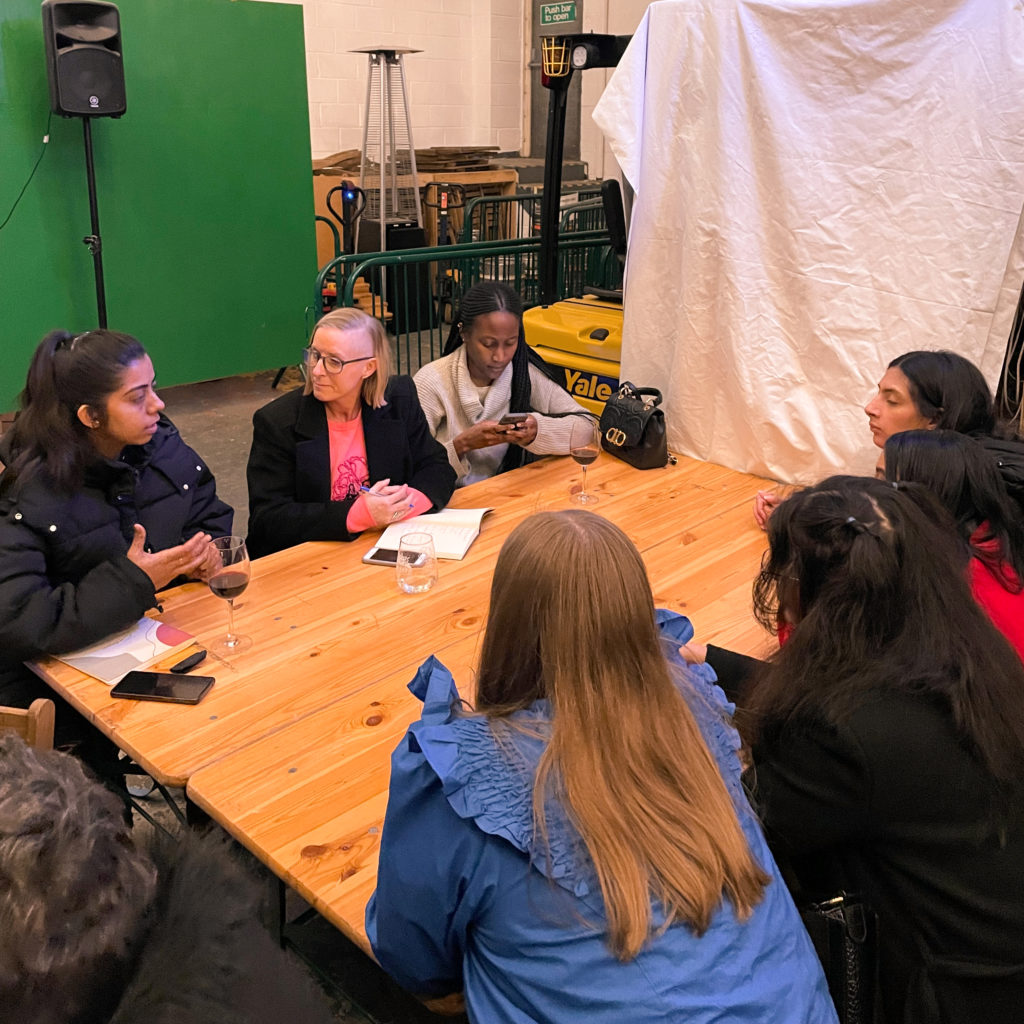
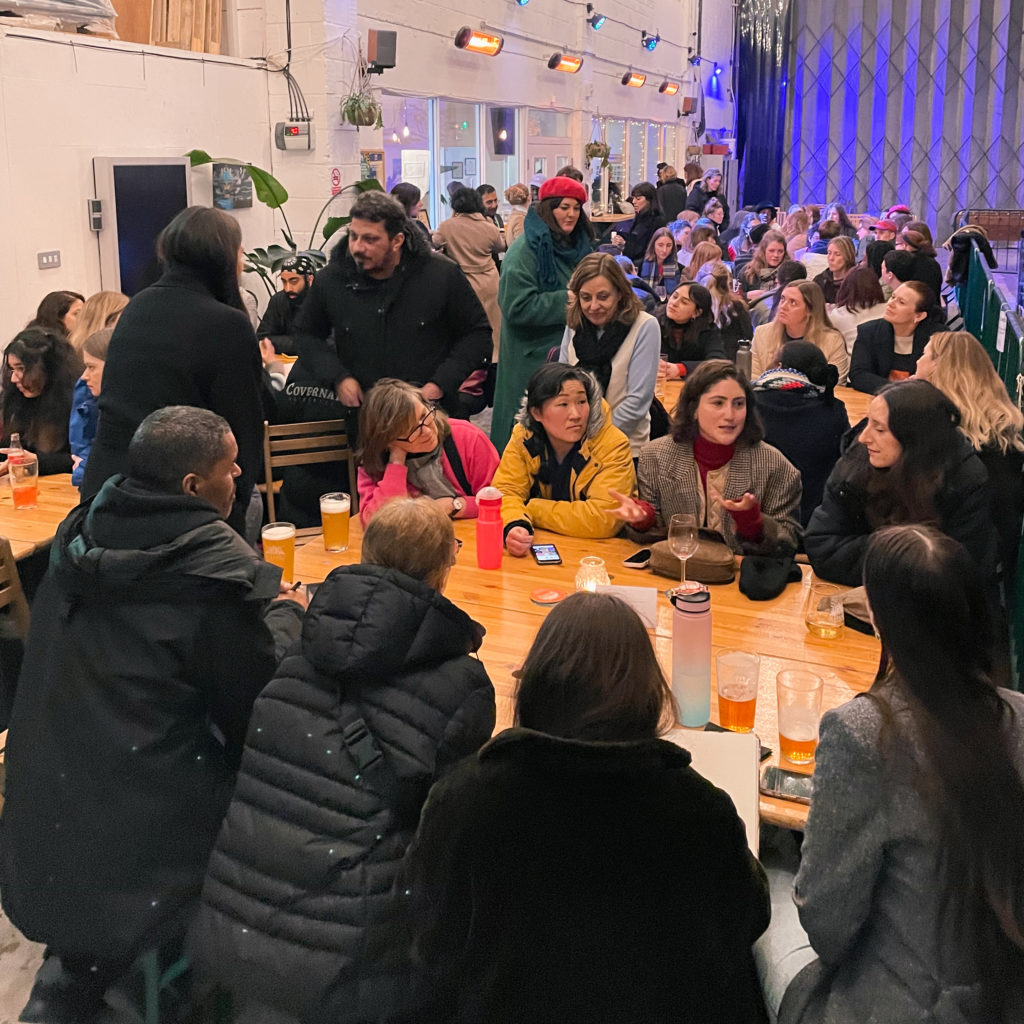
RESALE
On the children’s resale table, Louise Weiss, Co-Founder of dotte, discussed visibility, accessibility and attitudes towards second-hand clothing. They also felt the messaging behind buying second-hand garments needs to be inclusive and considerate of the motivation behind these purchases, as different connotations of ‘second-hand’ come with different budget availability.
On the second resale table, Jessica Brunt from Verte London said that her group felt that destigmatising second-hand shopping was important, and they suggested working with the London Borough of Waltham Forest to enable vacant retail spaces on high street to be used for sustainable businesses.
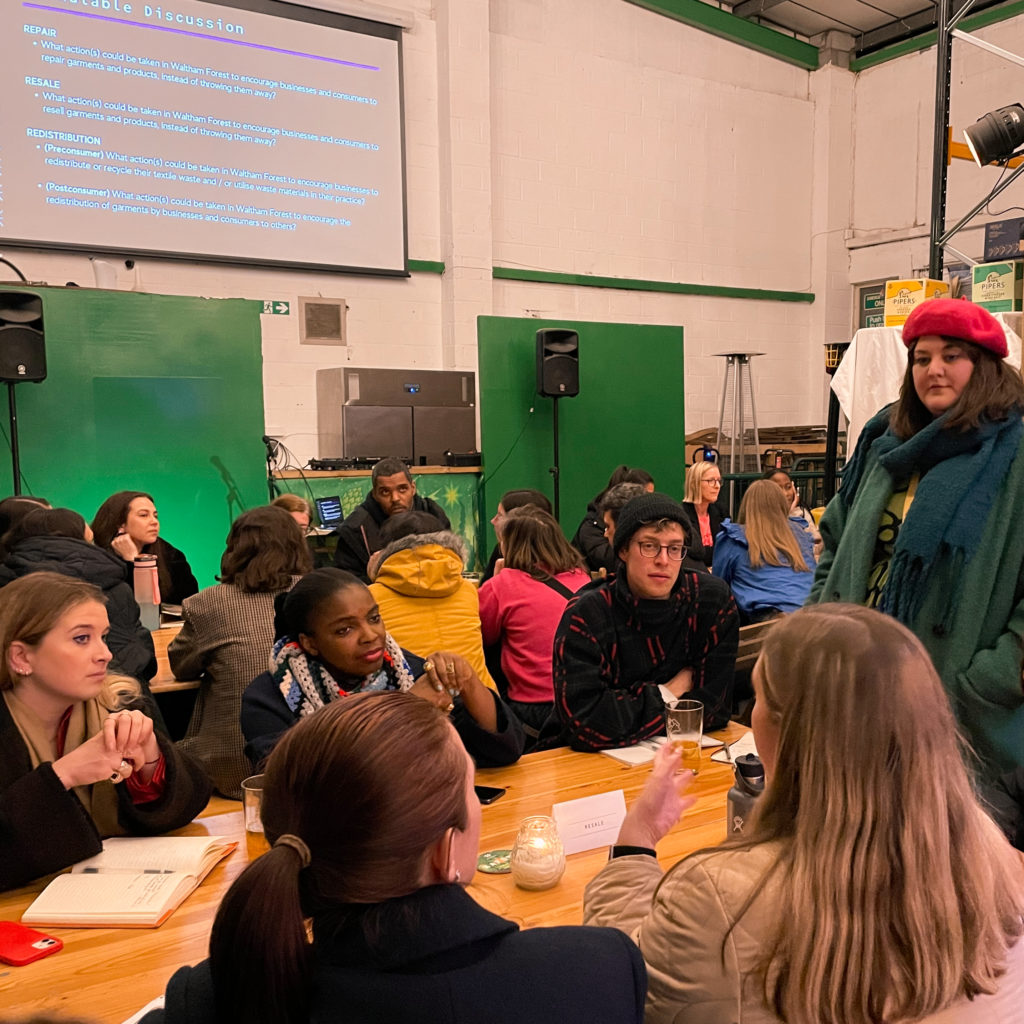
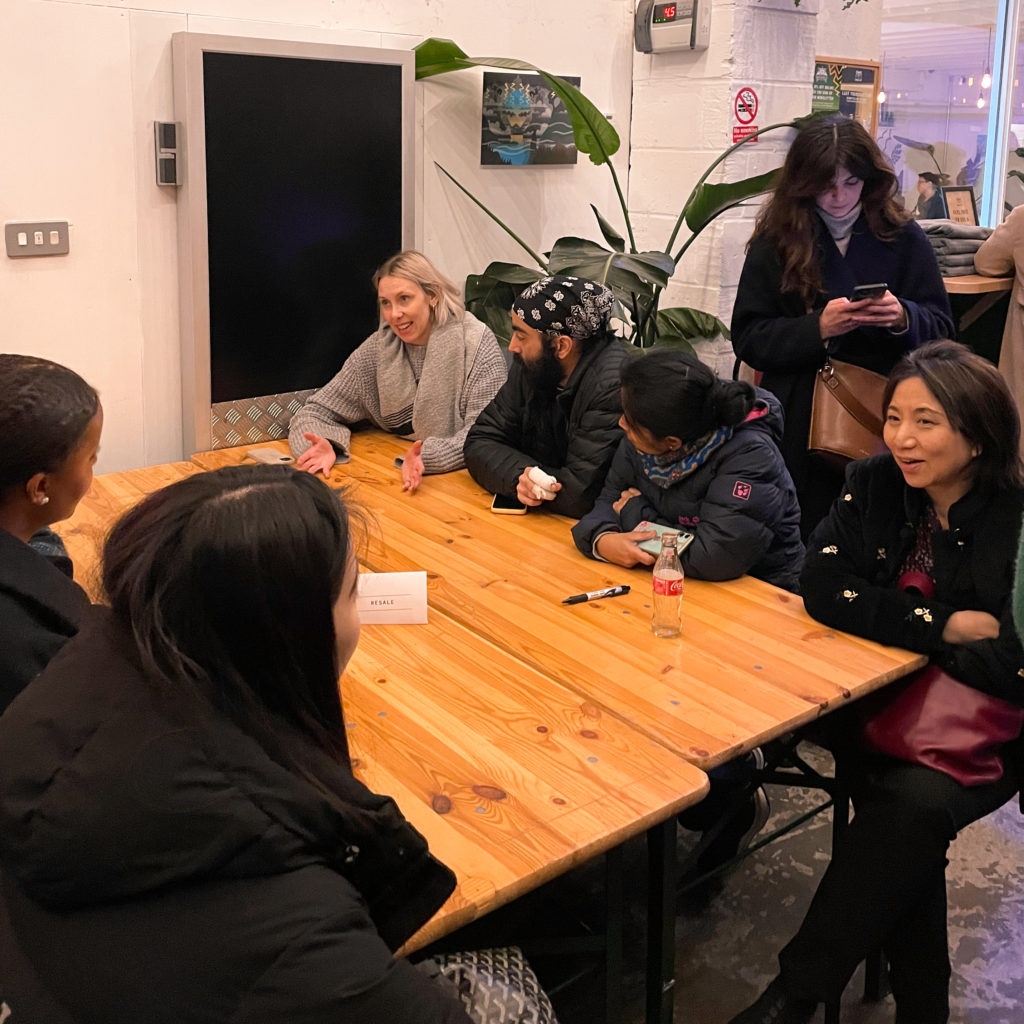
REDISTRIBUTION:
Piarvé Wetshi, Co-Founder of Last Yarn and Colèchi, said that there needs to be more visibility on the process of what happens to clothes when we recycle through charity shops and highlight the process of what happens to clothes that don’t sell. The group felt that some trust has been lost for charity shops with prices increasing and charity shops cherry-picking products to sell on other platforms at market rate.
Kaela, Founder of FibreLab, said that her group focused on pre-consumer textile waste. They proposed incentivising businesses to redistribute pre-consumer textile waste with initiatives like a discount on business rates. They also highlighted that encouraging businesses to sort at source, i.e. separating by fibre composition, and having exchange points for textile waste could increase the potential to redistribute and reuse fabric massively.
The last table, chaired by Sol Escobar, Founder of Give Your Best, and the Forest Recycling Project team, discussed the importance of raising awareness of sustainable initiatives with millennial and Gen-Z audiences. Sol stressed the importance of inclusion when discussing circularity, as five-and-a-half million people in the UK are living in clothing poverty and are unable to access second-hand selling platforms or be part of the fashion conversation.
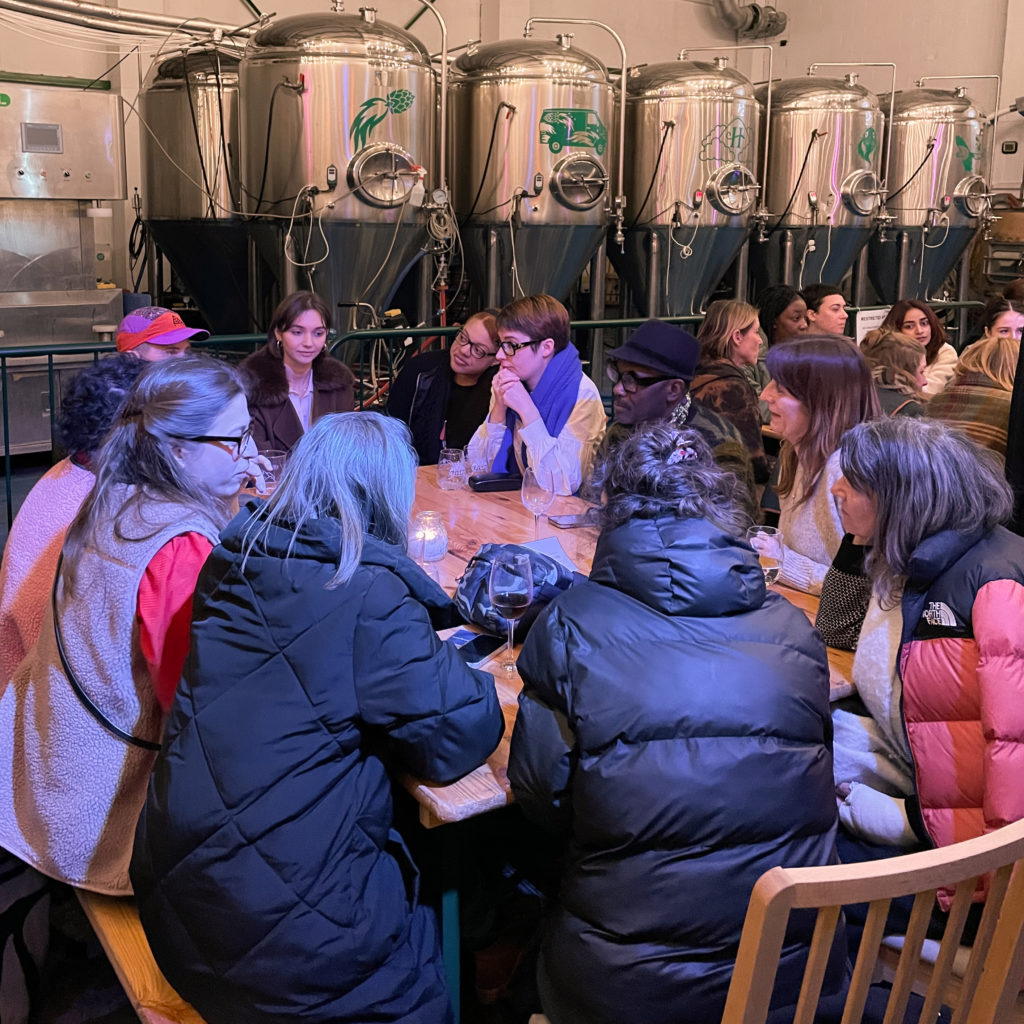
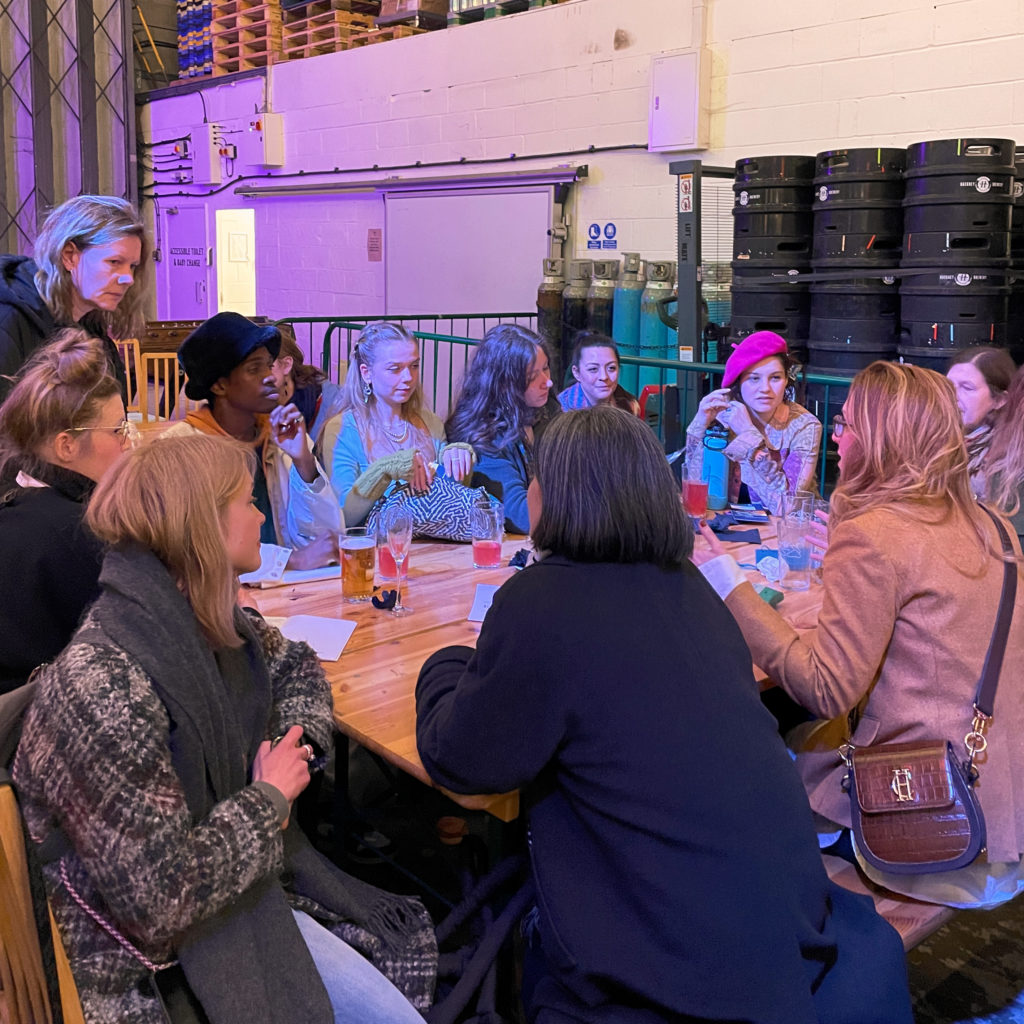
BUILDING CONNECTIONS AND CIRCULAR SYSTEMS
Afterwards, guests carried on their conversations, networked, and grabbed a slice of pizza and a drink from the bar.
Huge thank you to our guest speakers, Sarah Robins and Layla Sargent, as well as our fantastic table hosts:
- Judith Agwada – Founder, Maison Archives London
- Jessica Brunt – Founder, Verte
- Anita Earp – Fabric Retail Coordinator, Forest Recycling Project
- Sol Escobar – Founder and Director, Give Your Best
- Nicola Joseph – Founder, Uniform Choice
- Kaela Katz – Founder and CEO, FibreLab
- Sophie Rochester – Founder, Yodomo
- Gosia Rokicka – Retail and Operations Manager, Forest Recycling Project
- Mika Sembongi – Accessory Designer and Mending Expert
- Samson Soboye – Founder, Soboye
- Tessa Solomons – Reuse and Repair Consultant
- Louise Weiss – Co-Founder, dotte
- Piarvé Wetshi – Co-Founder, Last Yarn and Colèchi
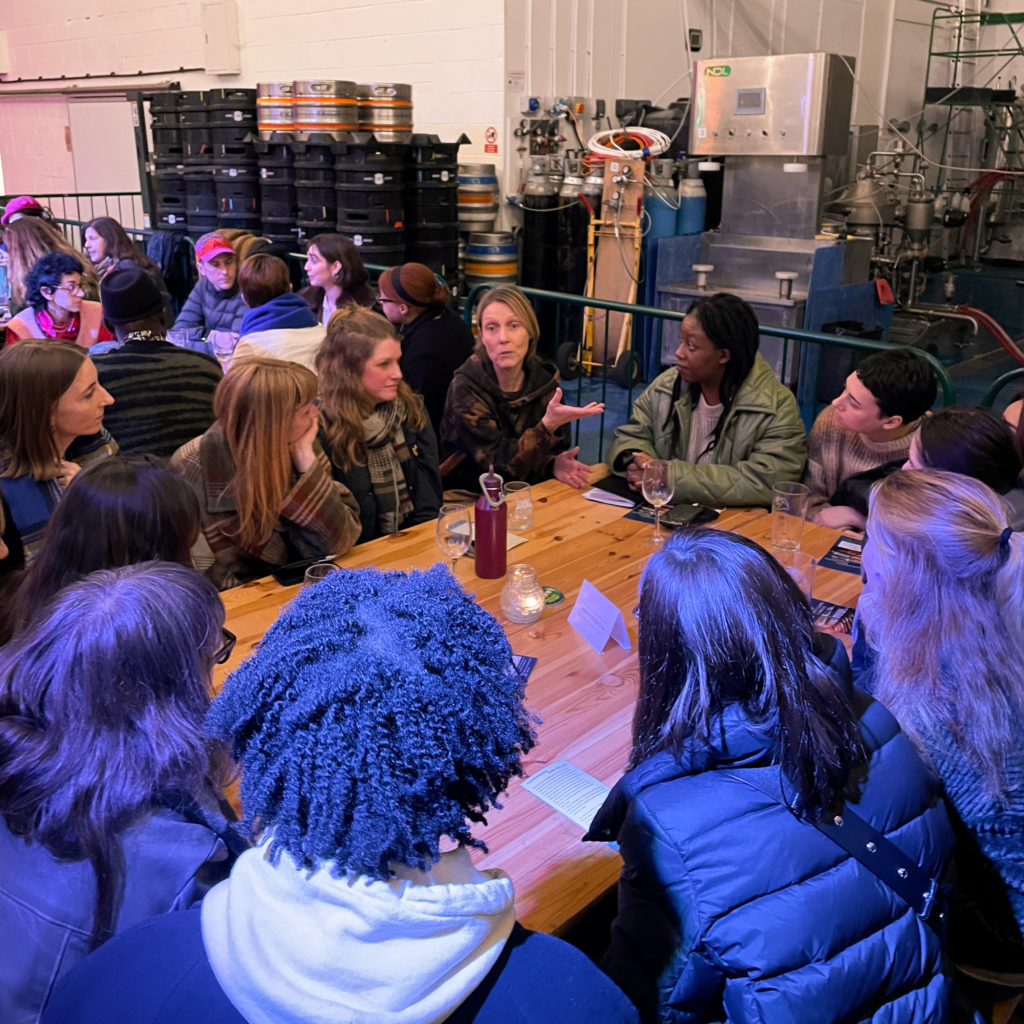
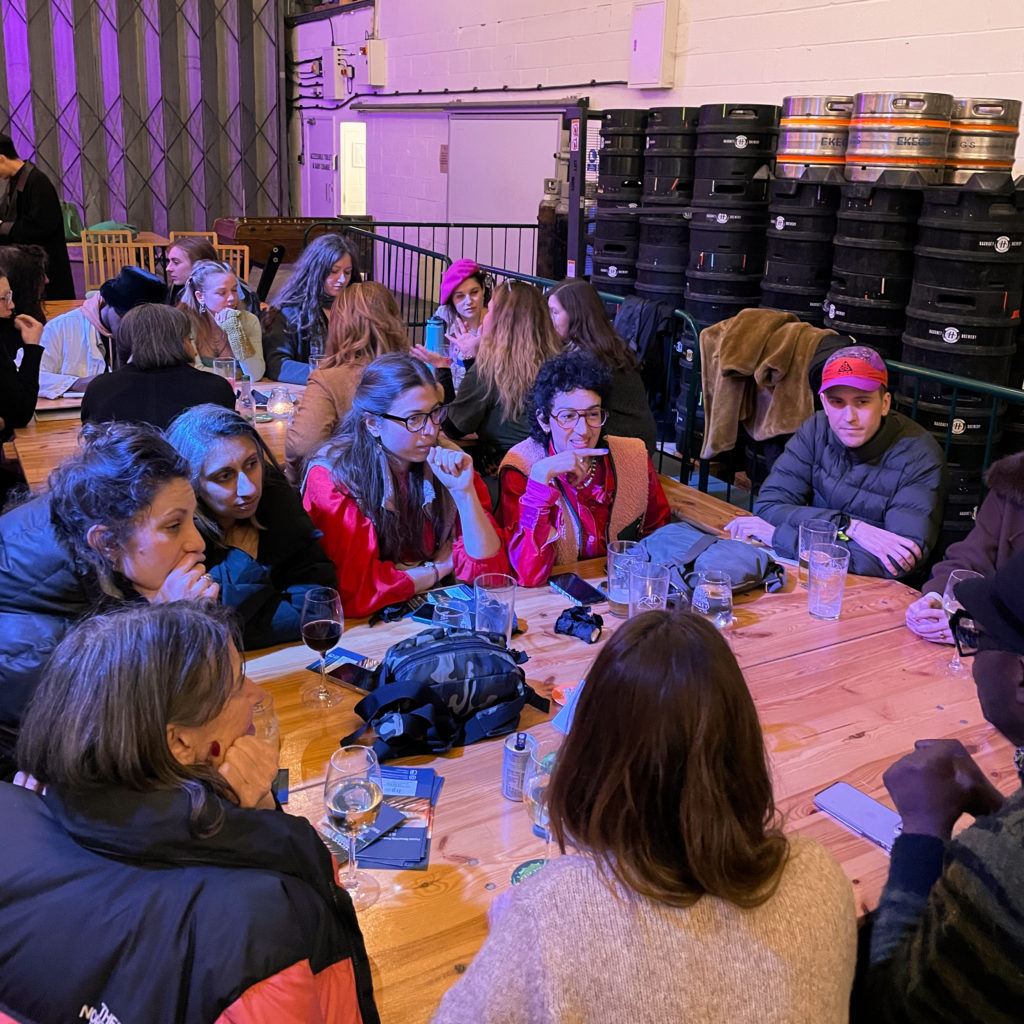
Missed out on this event? Hear about the latest Fashion District events by signing up for our newsletter or follow us at:
- Instagram: @fd_ldn + @walthamforestfashion
- Facebook: Fashion District London
- LinkedIn: Fashion District – London
- Twitter: @fd_ldn
A Look Back at Fashion Circle: Impactful Storytelling
Last week we held our first in-person Fashion Circle event in collaboration with The Trampery. Designed to enable fashion businesses to learn and develop their network, Fashion Circle: Impactful Storytelling brought together industry experts, founders and fashion professionals at London’s brand-new fashion campus – The Trampery Fish Island Village.
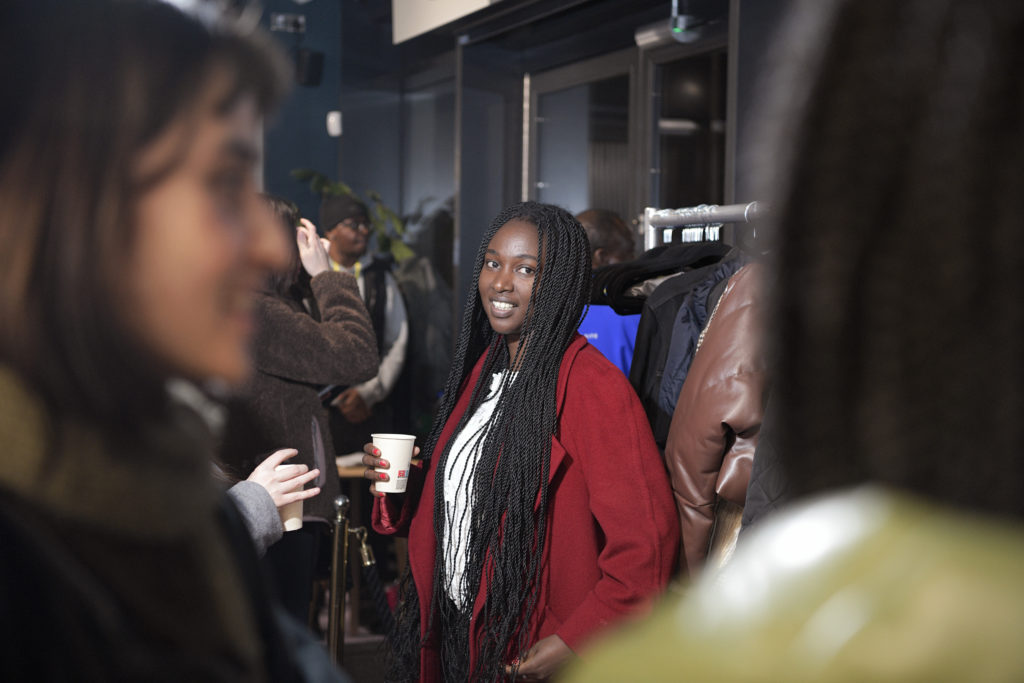
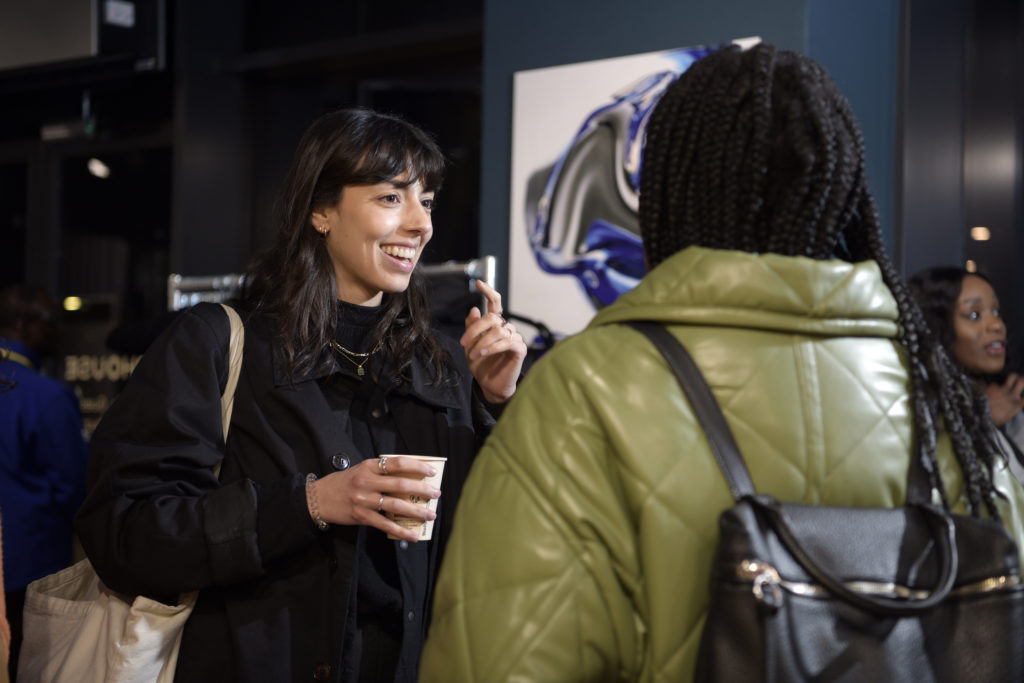
The theme for the evening focused on greenwashing and how to communicate sustainability claims without misleading consumers, which has been a hot topic since the launch of the Green Claims Code in September 2021. In order to provide our community with a well-rounded and informative understanding of the theme, we brought together an incredible line-up of speakers with expertise in impact policy, ESG communications, corporate responsibility and conscious advertising.
CEO and Co-Founder of Compare Ethics, Abbie Morris, kicked off the evening with an overview of the Green Claims Code, it’s six key principles, and guidance on how to meet these principles using data as evidence. Abbie’s key tips included:
- embedding data requests into contracts with suppliers
- creating compliance data request forms
- working with consultants, experts or appropriate tech companies to help make claims based on available data
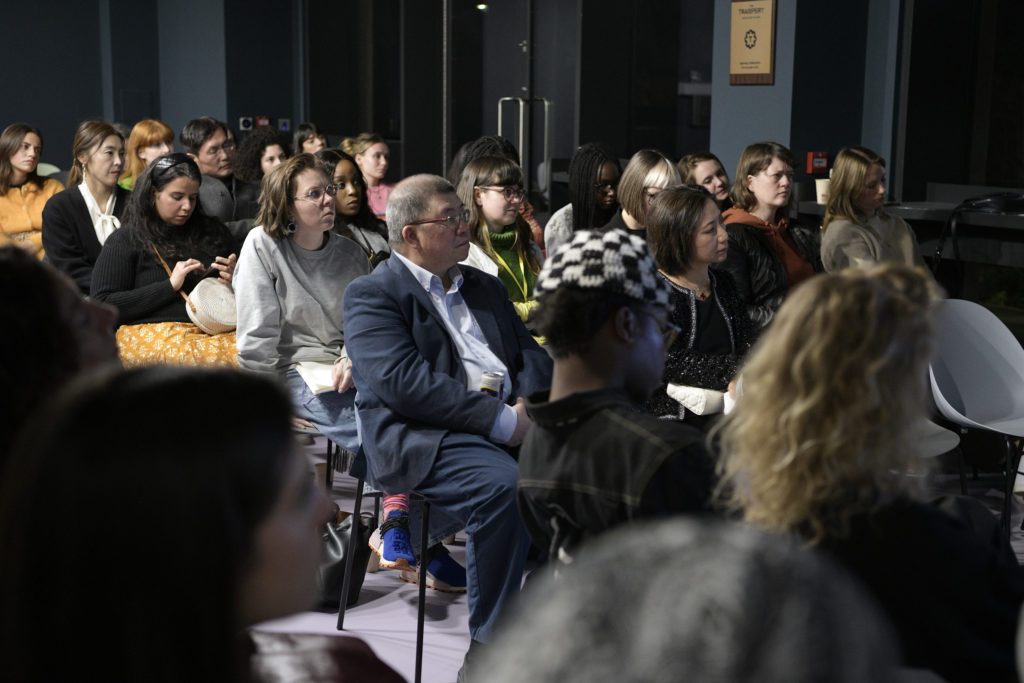
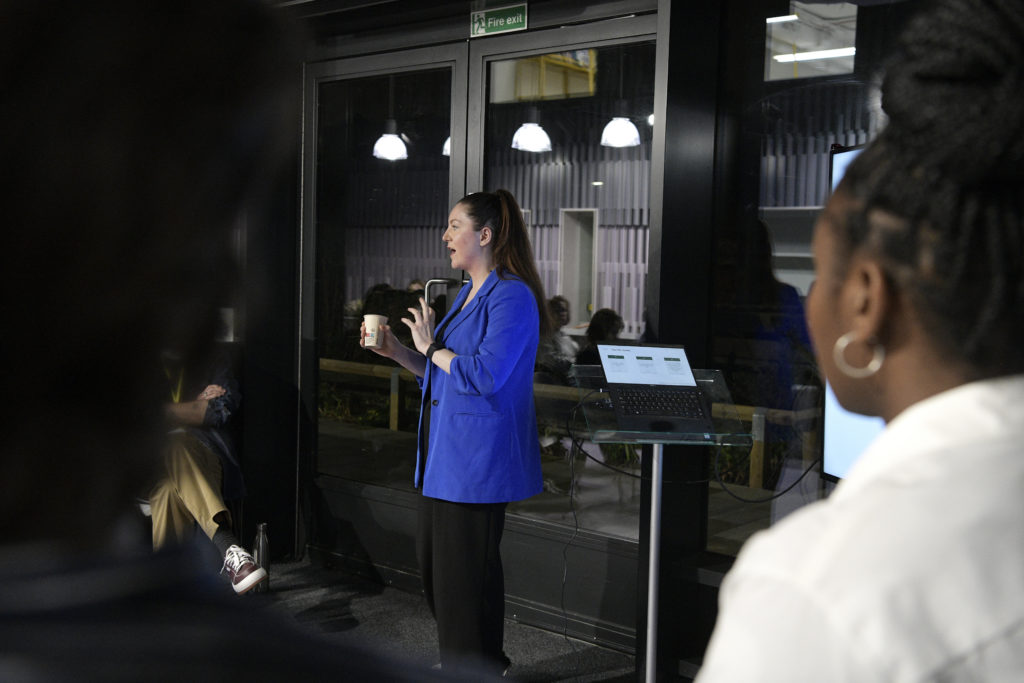
Next up the audience heard from Valentina Okolo, Environmental Manager at PANGAIA, who talked through the company’s sustainable and ethical goals as outlined in their Earth Positive Philosophy. From water health to elevating human potential, Valentina provided a deep-dive into the practices, partnerships and ambitions that makes PANGAIA an exemplar of good practice, which can be explored further in their annual Impact Report.
During the evening, a member of the audience posed the question of how PANGAIA has been able to implement such a thorough impact strategy. Valentina attributed this to the development of a dedicated impact team, who could ensure that the UN’s SDGs remained central to their purpose and growth, and to contribute towards accurately communicating their current practices and goals going forward.
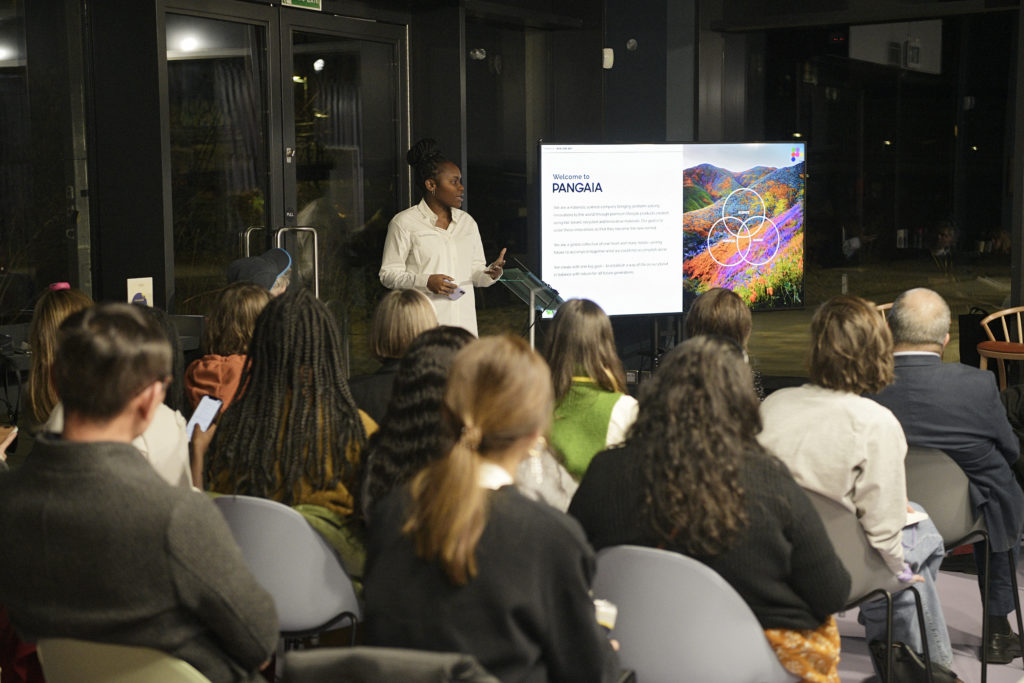
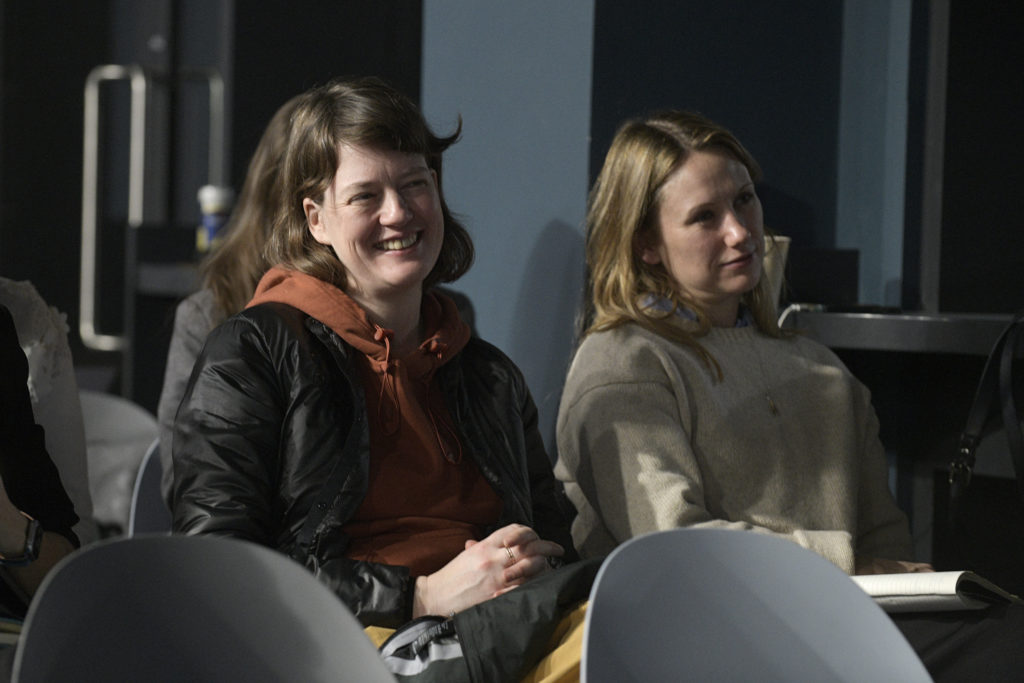
George Harding-Rolls, Campaign Manager at Changing Markets Foundation, reiterated the importance of accuracy and transparency to avoid greenwashing, since falsifying or overstating green credentials stunts progress where it is most needed. Phrases such as ‘carbon neutral’, ‘better for the planet’ and ‘conscious’ were highlighted as examples of statements that were ambiguous and lacked clarity, which draws directly from one of the six principles to avoid greenwashing, as outlined in the Green Claims Code.
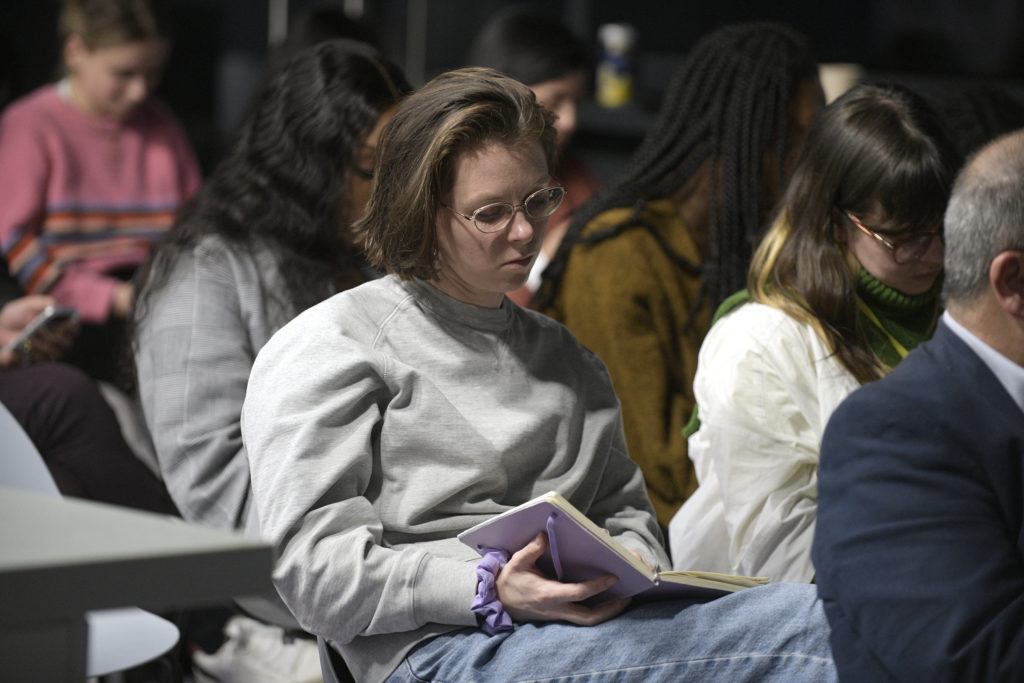
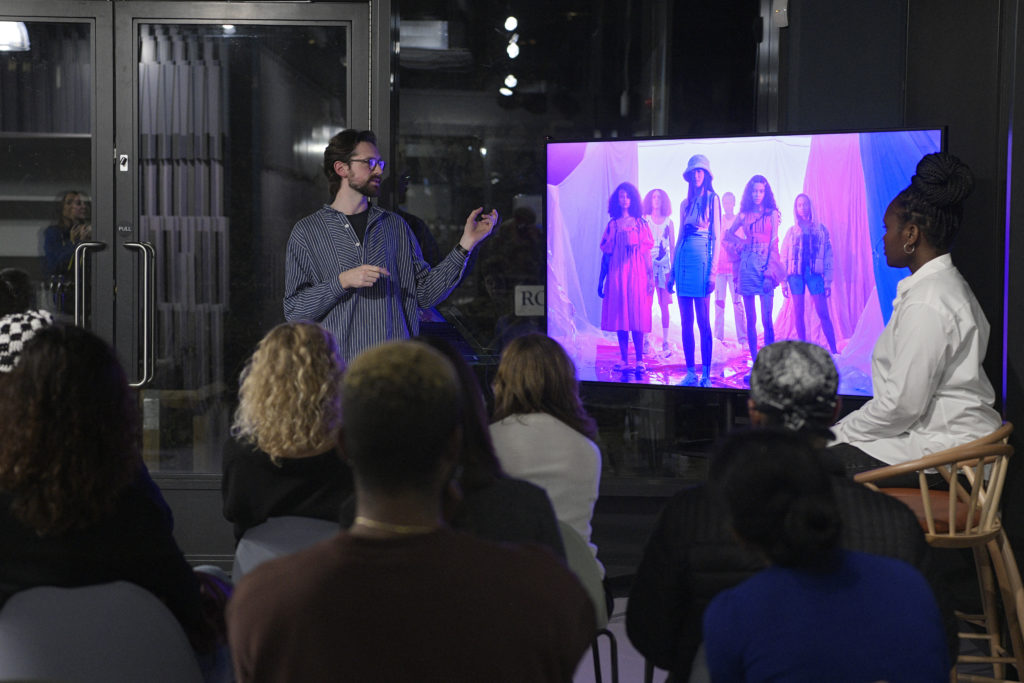
The audience were tasked with listing their sustainable practices and ambitions, taking into consideration the tips and advice provided by our expert speakers. This sparked further conversation about the challenges of marketing, how to juggle multiple roles as a founder, and the potential to collectively create positive change in the future.
Through developing clear communications with consumers and following the guidance of campaigns, such as the Green Claims Code, we can all contribute towards building more trust in sustainability claims. In the meantime, as consumers, we can approach sustainability claims with a critical eye and check whether brands and businesses are supporting their claims with reliable evidence.
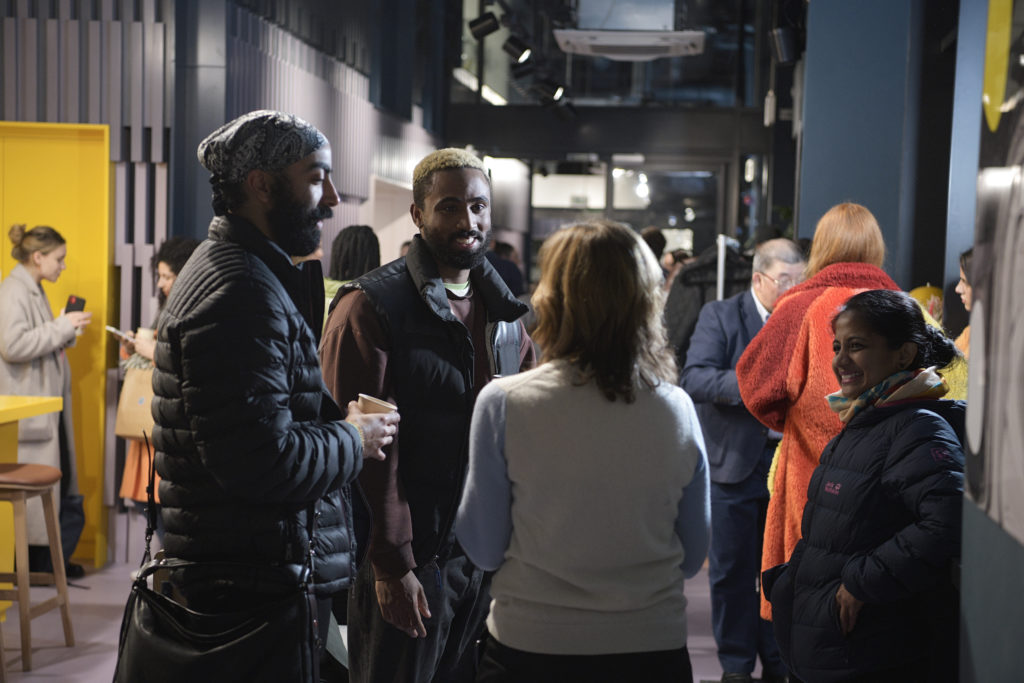
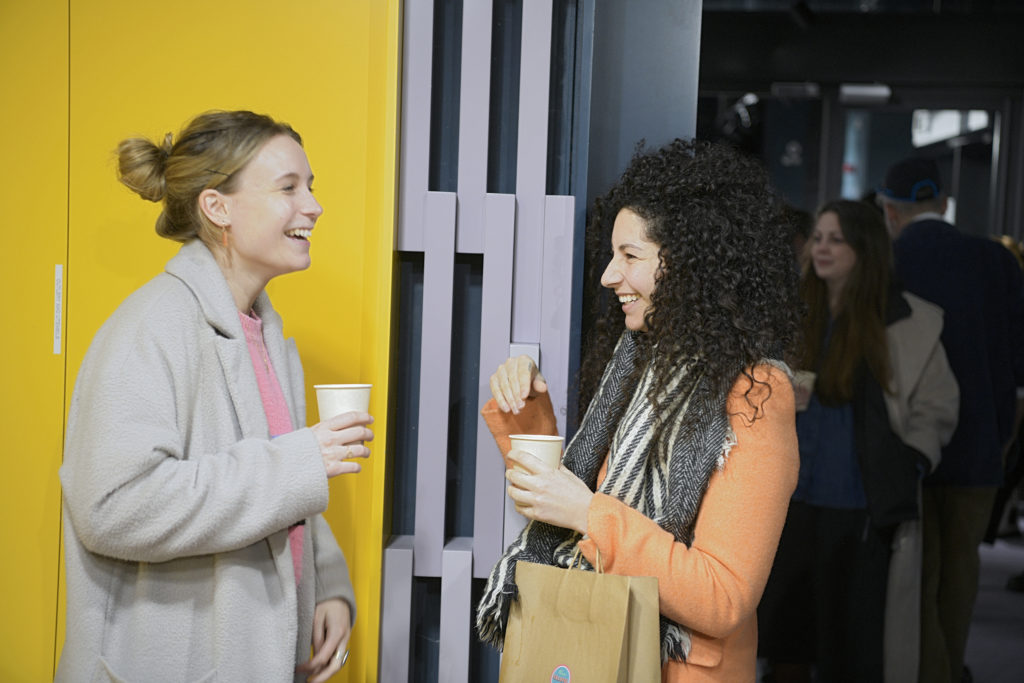
Interested in joining a thriving fashion community? Discover The Trampery Fish Island Village – London’s newest campus for fashion, innovation and sustainability. Check out the co-working, studios, event space and manufacturing facilities open now. Learn more here.
Photographer: Christian Sinibaldi
If you missed this event, why not follow our social channels to keep up-to-date on future events and opportunities:
- Instagram: @fd_ldn + @thetrampery
- Facebook: Fashion District London + The Trampery
- LinkedIn: Fashion District – London + The Trampery
- Twitter: @fd_ldn + @thetrampery

